

Is El Salvador Safe to Visit in 2024? A Comprehensive Safety Guide for Travelers

Absolutely, El Salvador is safe to visit in 2024! While the country grappled with high crime rates before 2020, there has been a tremendous decline in violence, reaching its lowest levels in over four decades. Today, El Salvador stands out as one of the safest countries in Latin America
Crime data has shown that violent crimes in El Salvador, such as homicides, were reduced by 56.5% from 2021 to 2022 and 69% from 2022 to 2023. Today, El Salvador has one of the lowest homicide rates in Latin America.
Considering the reduction in crime and the historical data on tourism safety, El Salvador is not dangerous for tourists to visit in 2024. Furthermore, most major tourist areas are in safer locations with adequate security.
Crime in El Salvador today
El salvador is not as dangerous anymore, so, is el salvador dangerous for tourists, travel advisories for el salvador, misconceptions about safety in el salvador.
- 10 Safety tips to follow

SEE ALSO: El Salvador Tourism: A Journey Through Pristine Beaches, Colorful Towns, and Enchanting Parks
Over the years, crime and violence have affected the number of people visiting El Salvador; this is a sad and upsetting fact about the country. However, going into 2024, security in El Salvador has improved to its best levels in over 40 years.
El Salvador has witnessed a remarkable decrease in homicides, achieving record-low levels, establishing the country as one of the safest in Latin America. Furthermore, the nation has seen numerous days with no recorded homicides, highlighting a positive trend in overall safety.
El Salvador is under a State of Exception that restricts some constitutional guarantees. However, this security measure has not affected tourism to El Salvador ; in fact, it seems that it has helped as the country’s security has improved.
Crime statistics, the scary part
Before 2020, El Salvador had one of the highest homicide rates in the world. In 2015, El Salvador became known as the murder capital of the world .
In 2015, El Salvador had an average of 18.2 daily murders for a rate of 103 homicides per 100,000 inhabitants. By the end of 2023, the murder rate dropped to 0.42 per day or 2.4 homicides per 100,000 inhabitants. Based on Homicides and days without homicides, 2023 is the safest year in Salvadoran history.
It’s upsetting that many people and publication list El Salvador as a dangerous country using stats from before 2019. However, considering what the country’s stats wore in 2015, I understand why that happens.
SEE ALSO: El Salvador’s Homicide Rate

It is understandable why crime statistics discourage some people from traveling to El Salvador. Nevertheless, El Salvador has made safety strides and is not as dangerous as it used to be.
In 2022, El Salvador’s homicide rate was lower than that of Costa Rica . Moreover, the 2023 homicide statistics for El Salvador significantly outperform Costa Rica, recognized as the standard in safety in Central America.
SEE ALSO: Days Without Homicides in El Salvador
Safety has improved in El Salvador. Now, in all honesty, this improvement has helped mainly the locals. El Salvador has always been considered safe for tourists.
Here is an example of safety improvements using San Salvador, the nation’s capital . This city, since 2010, was generally in the top 50 most dangerous cities in the world; as a matter of fact, it was a regular in the top 10. The country’s capital reached 3rd place in 2015.
But, by 2020, San Salvador was no longer one of the most dangerous cities in the world ; it left the top 50 list. In fact, the capital city is not even the most dangerous place in El Salvador .

Considering the recent reduction in crime and the country’s historical data on tourism safety, I can attest that El Salvador is not dangerous for tourists to visit in 2024.
However, keep in mind that countries in Central America and the world have areas tourists need to be careful when visiting; it’s not just El Salvador. Even the United States has many cities classified as dangerous, with recommendations that tourists use caution when traveling there.
The point that I am trying to make and emphasize is that there might be some areas of El Salvador that tourists should avoid.
Follow safety recommendations, stick to safe areas, and use common sense; I am sure you will enjoy your trip to El Salvador and will keep coming back!
Looking at travel advisories is a reliable way to assess how safe a country is. However, governments will always look at the country as a whole and not at specific areas.
The US and UK travel advisory websites are the most popular and have reliable travel information. They are the ones who tend to have the most detailed information about safety in specific countries, in this case, El Salvador.
United States Travel Advisory to El Salvador
The current travel advisory to El Salvador from the US Department of State is level 3, “Reconsider travel to El Salvador due to crime.” To view today’s current advisory, visit the US government travel advisory page.
Though there has been a significant reduction in gang-related activity, violent crime remains a concern throughout significant portions of the country. Crime rates vary among departamentos (states) and municipios (municipalities), and areas witnessing higher crime rates are often located in close proximity to lower crime areas or must be crossed in moving between lower risk areas. US Department of State.
United Kingdom Travel Advisory to El Salvador
The UK is another trustworthy travel advisory source. As of today, they write the following about travel to El Salvador. To view today’s current advisory from the United Kingdom, visit the UK government advisory page.
Most visits to El Salvador are trouble-free. El Salvador has until recently had one of the highest crime rates in Latin America. Despite recent progress made in security, the risks of both petty and violent crime remain. A State of Exception (Emergency) introduced in March 2022 in response to a sharp (and short lived) rise in the number of murders remains in place. UK Government.
Due to its historical past regarding violence, numerous misconceptions persist about El Salvador, some of which are no longer accurate today. As a Salvadoran, I understand the reasons behind the prevalent misconceptions regarding travel to El Salvador and safety concerns for visitors.
Having witnessed significant violence since the 1980s, El Salvador gained a reputation as a violent nation. Nevertheless, numerous misconceptions about the country persist today that are just wrong; here are some of them!
Crime and violence are everywhere
The following is on a popular travel website about El Salvador. [In El Salvador] “There have been grenade attacks on buses, restaurants, and businesses, which have killed dozens of people, including children. Foreigners have also been killed in these kinds of attacks. Buses are often sprayed with bullets, due to gangs demanding protection money from bus companies.” www.worldnomads.com.
Are they lying? No, they are not! All those things have happened in El Salvador, but not in over twelve years. However, the article makes it seem like these things happen now and everywhere.
Yes, there have been violent crimes in El Salvador in the last few years; however, they don’t happen all the time and everywhere. Furthermore, most acts of violence and crime occurred in non-tourist areas. Tourists will never have a reason to be in those areas.
Gang shootouts are a common occurrence
“Gang-related murders and shootouts are a common occurrence in various parts of El Salvador.” It is just not true; it is another damaging misconception about El Salvador.
Gang-related murders do happen, but not as often as many people and some travel sites tend to inform. Additionally, shootouts are not common occurrences in El Salvador.
I have been living full-time in El Salvador since 2014 and have traveled all over the country. I can assure you that Gang-related shootouts are not common occurrences.
Only the tourist spots are safe for foreigners
That is a false statement; foreigners visit small towns and other parts of the country that have nothing to do with tourism.
Don’t get me wrong, El Salvador is not Japan or Switzerland, where you can pick up and go to any part of the country. Non-tourist areas are safe but use common sense when deciding where to go.
El Salvador was a country that exceeded my expectations and broke all the misconceptions I had, especially on the safety front.” Mar, solo female traveler.

10 Safety Tips to Follow
Here are a few suggestions to keep in mind when traveling or planning to visit El Salvador. Some of them might seem simplistic and obvious; however, in El Salvador, they should be taken more seriously.
1. Do your research, plan ahead
Before venturing into the country, find out everything you can about the specific areas you want to visit. Ask and answer the following questions before traveling to El Salvador. Is the area safe? How am I going to get there? What should I do there?
Knowing the answers to those questions will ensure your safety even more. Undeniably, doing research and planning is the way to go.
Even though the country is small, every area offers different things for different people. For instance, backpacker safety needs are distinct from regular travelers.
2. Talk to people who have traveled to El Salvador
Talking to people who have visited El Salvador is a good option. Many individuals or families that have ventured into El Salvador are happy to share their experiences. These previous travelers are one of the best sources of information about what to expect when visiting El Salvador.
By all means, pay attention to travel warnings and advisories from your governments. But remember, you will always get a better picture of El Salvador from people who have been there.
3. Stay at safe places
One of the most crucial research tasks travelers thinking about going to El Salvador needs to do is deciding where to stay.
Before deciding on a particular area or hotel, look at their reviews. Find out what the previous guest have commented about the hotel and the location. These reviews will give you a better idea of where to stay and if extra safety precautions are needed.
4. Don’t go where you are not supposed to go
A sure way to put yourself or your family in an unsafe situation is to venture into areas classified as dangerous. They do exist, and not only in this nation. Avoid drug, gang, and red districts areas; unless that is what you are looking for.
Also, remember, If a local tells you, “Don’t go there, it’s not safe!” Take that advice. Locals know the area and are protective of travelers. They don’t want you to put yourself or your family in an unsafe situation.
5. Be more careful at night
Nightlife in El Salvador is just like nightlife in any other country; there are bars, dance clubs, restaurants, movie theaters, etc. The safety recommendations needed when visiting these establishments will depend heavily on what you want to do at night.
For instance, if you have a nice quiet dinner in a family atmosphere zone, your safety concerns will be minimal. However, if you want to venture out at night to drink or to a club, you must be more careful.
Remember, nightlife in El Salvador is similar to nightlife in any other country; you get the good with the bad.
6. Be more careful when taking public transportation
If you need or want to take public transportation , be more careful. Public transportation is good as it’s cheap and convenient. However, public transport can also be unsafe for the following reasons.
If you take the wrong bus route, you can end up in a bad area and put yourself in an unsafe situation. Also, the bus could be on a path often targeted by criminals.
To ensure safety, before taking the bus, find out if the bus is on a safe route and if it goes directly to your destination. The best way to get this information is from the hotel or hostel where you are staying. If they say yes, it’s safe, go for it; if they say that you shouldn’t take that bus route, follow their advice.
7. Take guided tours
Taking guided tours is the best option if you want to venture into different parts of the country. These guided tours are for the day or even a few days; they will pick you up from your hotel, take you to your destination and drop you off right back at your hotel.
There are quite a few options available for group tours or private tours. Also, these Salvadoran tour companies will set up a trip exclusive to you and include the things you want to do or visit.
8. Keep local emergency numbers handy
El Salvador has its 911 emergency system; However, it is best to keep the phone numbers for the local police branch and emergency numbers near you.
In case of an emergency, you will get faster attention if you call the local branch of the police, red cross, or Comandos de Salvamento .
Remember, this is a developing country, so the emergency services are not up to the standards of developed countries.
9. Avoid displaying the numbers 13 and 18
Most of the violence in El Salvador is due to two main gangs fighting each other for control of the drug trade and the territory. They are the Mara Salvatrucha and Barrio 18 . These two gangs are associated with the numbers 13 and 18, respectively.
For precautionary reasons, visitors should not wear anything with the numbers 13 and 18 anywhere in hats, shirts, t-shirts, backpacks, etc. Also, tattoos that resemble the numbers thirteen and eighteen should be covered. It is an extra safety precaution.
10. Don’t be Flashy With Your Valuables or Wear Expensive Jewelry
If you are staying in the upscale areas of San Salvador or Santa Tecla , then you might flash your jewelry or valuables as much as you want to. In this area, wearing or flashing expensive things is normal.
On the other hand, if you are in underdeveloped areas of the country, use common sense, and avoid flashing expensive things.
I am not saying that you will get robbed by flashing them in these areas, but why get extra attention to you? Use common sense; it is that simple. It is a common-sense safety tip.

Is El Salvador safe to visit for tourists?
Even with all the issues, visiting El Salvador is safe, but remember to practice common sense, make wise decisions, and follow safety recommendations.
Also, keep in mind that Salvadorans are friendly. Locals will go out of their way to help foreigners and make them feel welcome and safe. Therefore, if you need assistance and can communicate in Spanish, get help from locals.

Lonely Planet includes El Salvador as one of the best 2023 travel destinations

Escape the Ordinary: El Salvador Off-the-Beaten-Path Adventures for the Curious Traveler

Security Alert May 17, 2024
Worldwide caution, update may 10, 2024, information for u.s. citizens in the middle east.
- Travel Advisories |
- Contact Us |
- MyTravelGov |
Find U.S. Embassies & Consulates
Travel.state.gov, congressional liaison, special issuance agency, u.s. passports, international travel, intercountry adoption, international parental child abduction, records and authentications, popular links, travel advisories, mytravelgov, stay connected, legal resources, legal information, info for u.s. law enforcement, replace or certify documents.
Before You Go
Learn About Your Destination
While Abroad
Emergencies
Share this page:
El Salvador
Travel Advisory July 17, 2023
El salvador - level 3: reconsider travel.
Reissued with obsolete COVID-19 page links removed.
Reconsider travel to El Salvador due to crime.
Country Summary: In March 2022, the Government of El Salvador (GOES) declared a “State of Exception” in response to an increase in homicides. The declaration remains in effect. The State of Exception grants authorities power to arrest anyone suspected of gang activity and suspends several constitutional rights, including the normal protections of criminal procedure such as the right to a speedy trial. Prison conditions are harsh. Several U.S. and other foreign citizens have been detained under the State of Exception, some in a reportedly arbitrary manner. Under its Territorial Control Plan, the GOES also may, without prior warning, restrict access via checkpoints to areas suspected of gang activity. U.S. citizens are advised that access to and freedom of movement within these areas may be limited.
Though there has been a significant reduction in gang-related activity, violent crime remains a concern throughout significant portions of the country. Crime rates vary among departamentos (states) and municipios (municipalities), and areas witnessing higher crime rates are often located in close proximity to lower crime areas or must be crossed in moving between lower risk areas. Local authorities may lack the resources to respond effectively to serious criminal incidents, although the concentration of resources in resort areas means these areas tend to be better policed than urban areas.
Read the country information page for additional information on travel to El Salvador.
If you decide to travel to El Salvador:
- Be aware of your surroundings.
- Do not walk outside after dark. Do not drive to unfamiliar and/or remote locations after dark.
- Do not physically resist any robbery attempt.
- Be extra vigilant when visiting banks or ATMs.
- Do not display signs of wealth, such as wearing expensive watches or jewelry.
- Engage local guides certified by the national or local tourist authority when hiking in back country areas.
- Enroll in the Smart Traveler Enrollment Program (STEP) to receive Alerts and make it easier to locate you in an emergency.
- Follow the Department of State on Facebook and Twitter .
- Review the Country Security Report for El Salvador.
- Prepare a contingency plan for emergency situations. Review the Traveler’s Checklist .
- Visit the CDC page for the latest Travel Health Information related to your travel.
Embassy Messages
View Alerts and Messages Archive
Quick Facts
Passport must be valid at time of entry.
At least one blank page.
A visa is not required for stays under 90 days, but you must purchase a tourist card for 12 USD upon arrival. The card is valid for 90 days. If your U.S. passport shows you were born in El Salvador, you do not need the tourist card.
None, check recommendation in Health Section.
Currency in excess of 10,000 USD must be declared.
Embassies and Consulates
U.s. embassy san salvador.
Final Boulevard Santa Elena Sur, Urbanizacion Santa Elena, Antiguo Cuscatlan, La Libertad San Salvador, El Salvador Telephone: +(503) 2501-2999 Emergency After-Hours Telephone: +(503) 2501-2999 Fax: +(503) 2278-5522 Email: [email protected]
Destination Description
Learn about the U.S. relationship to countries around the world.
Entry, Exit and Visa Requirements
You need a U.S. passport and either a Salvadoran visa or a one-entry tourist card to enter El Salvador.
- You may obtain a tourist card when you arrive at the airport or seaport from immigration officials for a $12 fee. The card is valid for 90 days.
- If you plan to remain in El Salvador for more than 90 days, you must apply in advance for a multiple-entry visa, issued free of charge, from the Embassy of El Salvador in Washington, D.C. (202-595-7500) or from one of the 18 Salvadoran consulates in the United States.
In June 2006, El Salvador entered into the “Central America-4 (CA-4) Border Control Agreement” with Guatemala, Honduras, and Nicaragua. Under that agreement, U.S. citizens who legally enter any of those four countries may travel freely among the other three countries for up to 90 days.
If you wish to remain in the CA-4 region for more than 90 days, you must request a one-time extension from local immigration authorities in the country where you are present. If you are, “expelled” from one of the four countries, you are expelled from the entire CA-4 region.
Minors: A U.S. citizen minor present in El Salvador for more than one year is considered a resident of El Salvador. To depart El Salvador, a minor resident needs written consent from any parent listed on the child’s birth certificate that is not traveling with the minor. The consent form must be notarized by a Salvadoran notary. The process to obtain parental travel consent that is accepted by Salvadoran immigration can be lengthy. Plan ahead if you intend to have your minor child travel without both parents after being present in El Salvador for more than one year .
HIV/AIDS Restrictions: The U.S. Department of State is unaware of any specific HIV/AIDS entry restrictions or regulations for visitors or for foreign residents of El Salvador. Antiretroviral medication with a prescription can be imported for personal use and for the duration of stay.
Dual Nationality and International Parental Child Abduction: Information about dual nationality and the prevention of international child abduction can be found on our website.
Customs: For information about customs regulations, please read our Customs Information page .
Volunteers, Mission Groups, and Non-Profits: Groups bringing donated supplies, equipment, or medicine may experience difficulties with customs. To avoid potential problems, clear all donated material with the appropriate Salvadoran government office before arriving in El Salvador. To import donated medicines: Contact the Dirección Nacional de Medicamentos (National Directorate of Medications) via email at [email protected]
Safety and Security
The crime threat level in El Salvador is critical and our Travel Advisory warns U.S. citizens of the high rates of crime and violence. See below for additional information on crime.
Dial 911 for emergency assistance in El Salvador.
Protests: Demonstrations, sit-ins, and protests may occur at any time or place, but are most frequent in and around the capital San Salvador. Avoid demonstrations, because even apparently peaceful ones may turn violent. Follow local news media reports or contact the U.S. Embassy for up-to-date information.
Crime: El Salvador has a high level of homicides and crimes such as extortion, assault, and robbery are common.
Typical crimes in El Salvador include extortion, mugging, highway assault, home invasion, and car theft. Gangs have traditionally controlled a majority of the space in El Salvador, even if their presence is not visible to outsiders, and exist by extorting money from businesses, travelers, residents and others living in or passing through their territory. Non-compliance or resistance to gang demands often results in violence. This activity can occur even in wealthy and relatively peaceful areas. Home invasions and/or burglaries of residences during broad daylight occur in areas of San Salvador; in some cases, gangs simply expel residents from their homes and take over the property for criminal use. U.S. citizens who visit El Salvador for extended periods may be at higher risk for extortion demands.
El Salvador has tens of thousands of known gang members from several gangs including Mara Salvatrucha (MS-13) and 18th Street (M18). Gang members have been known to frequently engage in violence or use deadly force if resisted. The gangs, or “maras,” customarily have concentrated on extortion, violent street crime, carjacking, narcotics and arms trafficking, and murder for hire. Extortion is a common crime in El Salvador.
Many suspected gang members have been detained since March 27, 2022 under a State of Exception. Reported crimes have reduced since that time, but crime in El Salvador remains at critical levels.
U.S. Embassy personnel are advised to walk only in known, lit, well-secured locations. Criminals may be active even in popular parks with a security presence.
Exercise caution at all times and practice good personal security procedures throughout your stay.
- Always travel in groups.
- Avoid remote or isolated locations.
- Avoid displaying or carrying valuables in public places.
- Avoid stopping at tourist overlooks, which may be targeted by criminals.
- Never leave passports and other important documents in vehicles.
- In public, remain alert and avoid the use of cell phones and earphones. These reduce your self-awareness and provide easy targets for crimes of opportunity.
- Do not travel on public transportation, especially buses.
- Use only radio-dispatched taxis, taxis stationed in front of major hotels, or internet-based rideshare services.
- Choose banks or ATMs inside secure, guarded areas and remain alert.
- Remain vigilant even in well-known restaurants, hotels, and retailers within San Salvador.
- Credit card cloning and similar fraud can occur; keep your card in sight.
- Be aware of your surroundings when traveling by car. Navigation apps seeking the quickest routes may direct you off safer routes into dangerous areas.
- Drive with your doors locked and windows raised.
- Avoid travel outside of major metropolitan areas after dark and on unpaved roads at all times because of hazardous road conditions and criminal activity.
- Criminals who threaten violence typically use violence without hesitation if victims do not comply instantly. Conversely, the Embassy has no reports of serious injury or worse among victims who comply.
Armed robberies of climbers and hikers in El Salvador’s national parks can occur. Engage the services of a local guide certified by the national or local tourist authority when hiking in back-country areas and within the national parks. The tourist police force (POLITUR) provides security and assistance to tourists. Officers are located in 19 tourist destinations. Beware of hikes and guides in locations without an official guide service or police presence, regardless of advice found on the Internet.
A majority of serious crimes in El Salvador are never solved. The Government of El Salvador lacks sufficient resources to properly investigate and prosecute cases and to deter violent crime.
Do not purchase counterfeit and pirated goods, even if they are widely available. Not only are counterfeit goods subject to seizure upon entry in the United States, but if you purchase them, you may also be exposed to legal liability in El Salvador.
Victims of Crime: If you or someone you know becomes a victim of crime, report it to the local police by calling 911 and to the U.S. Embassy. Local authorities are responsible for investigating and prosecuting the crime.
The U.S. Embassy can:
- Replace a stolen or lost passport
- Help you find appropriate medical care
- Guide you on how to report a crime to police
- Contact relatives or friends with your written consent
- Explain the local criminal justice process in general terms
- Provide a list of local attorneys
- Provide information on victim’s compensation programs in the U.S.
- Provide an emergency loan for repatriation to the United States and/or limited medical support in cases of destitution
- Help you find accommodation and arrange flights home
Domestic Violence: U.S. citizen victims of domestic violence may contact the U.S. Embassy for assistance. If you are in immediate danger, call 911.
Tourism: The tourism industry is unevenly regulated, and safety inspections for equipment and facilities do not commonly occur. Hazardous areas/activities are not always identified with appropriate signage, and staff may not be trained or certified either by the host government or by recognized authorities in the field. In the event of an injury, appropriate medical treatment is typically available only in/near major cities. First responders are generally unable to access areas outside of major cities and to provide urgent medical treatment. U.S. citizens are encouraged to purchase medical evacuation insurance .
Watersports: Strong undertows and currents make swimming at El Salvador's Pacific Coast beaches extremely dangerous even for experienced swimmers. Government lifeguards are generally present at most public beaches but are not always present at private beaches. Follow all instructions of any lifeguard, and do not enter the water at any location at which red warning flags are displayed to signify dangerous conditions. In addition, El Salvador’s search and rescue capabilities are limited, and access to medical resources in beach areas is inadequate. Carefully assess the potential risks of recreational water activities and consider your physical capabilities and skills. Be aware that drinking alcohol and swimming can be a deadly combination.
Local Laws & Special Circumstances
State of Exception: In March 2022, the Government of El Salvador declared a 30-day “State of Exception” in response to an increase in homicides; the State of Exception has been extended several times since, and it continues today. The State of Exception suspended several constitutional rights, including the normal protections of criminal procedure such as the right to a speedy trial, among others. Several U.S. and other foreign citizens have been detained under the State of Exception, some in a reportedly arbitrary manner. The number of all detainees has increased significantly, and prison conditions are harsh.
Criminal Penalties: While in El Salvador, you are subject to local laws. Your U.S. passport will not help you avoid arrest. Remember your activities are limited by the type of visa you have. If you violate Salvadoran laws, you may be expelled, arrested, or imprisoned. Penalties for possessing, using, or trafficking in illegal drugs in El Salvador are severe. (Please note that any items containing THC, even certain CBD products that are legal and widely available in the United States, are illegal in El Salvador) . Convicted offenders can expect long jail sentences and heavy fines.
Some offenses committed overseas can be prosecuted in the United States, regardless of local law. For examples, see the U.S. Department of State website and the Department of Justice website on crimes against minors abroad.
Arrest Notification: If you are arrested or detained, ask police or prison officials to notify the U.S. Embassy immediately.
Prison and detention center conditions in El Salvador are harsh and dangerous. Overcrowding constitutes a serious threat to prisoners’ health and lives. In many facilities, provisions for sanitation, potable water, ventilation, temperature control, and lighting are inadequate or nonexistent.
Guns: You must have a locally obtained license to possess or carry a firearm in El Salvador. Convictions for possessing an unlicensed firearm can carry a prison sentence of three to five years. The U.S. Embassy cannot intervene on your behalf.
Disaster Preparedness: Preparation for natural disasters is essential in El Salvador, which has 21 active volcanoes, constant seismic activities, and a rainy season that produces severe flooding and mudslides.
Find information about natural disaster preparedness on the U.S. Federal Emergency Management Agency (FEMA) website. Find information in Spanish about earthquakes (sismos) and other natural disasters in El Salvador on the Government of El Salvador’s web page . Learn more on our webpage about crisis and disaster preparedness .
Women Travelers: See our travel tips for Women Travelers .
LGBTQI+ Travelers: There are no legal restrictions on same-sex sexual relations or the organization of LGBTQI+ events in El Salvador. There is, however, widespread discrimination based on sexual orientation in employment, access to health care, and identity documents. Public officials, including the police, have reportedly engaged in violence and discrimination against LGBTQI+ persons. For more detailed information about LGBTQI+ rights in El Salvador, you may review the State Department’s Country Reports on Human Rights Practices for 2018 . For further information on Lesbian, Gay, Bisexual, Transgender and Intersex (LGBTQI+) travel, please read our LGBTQI+ Travel Information page.
Travelers with Disabilities: Salvadoran law prohibits discrimination against persons with physical and mental disabilities in employment, education, access to health care, or the provision of other state services. The government, however, does not allocate sufficient resources to enforce these prohibitions effectively. There are few access ramps or provisions for the mobility of persons with sight and hearing disabilities.
For emergency services in El Salvador, dial 911.
Private and public hospitals do not meet U.S. standards. The U.S. Embassy recommends that private hospitals be used only for emergency care to stabilize a condition prior to returning to the United States for definitive evaluation and treatment. Private hospitals and physicians expect up-front payment (cash or credit card). They do not bill U.S. insurance companies.
Ambulance services are:
not widely available and training and availability of emergency responders may be below U.S. standards
- not equipped with state-of-the-art medical equipment
The Department of State does not pay medical bills. U.S. Medicare does not apply overseas. Most hospitals and doctors overseas do not accept U.S. health insurance.
Medical Insurance: Make sure your health insurance plan provides coverage overseas. Most care providers overseas only accept cash payments. See our webpa ge for more information on insurance coverage overseas. Visit the U.S. Centers for Disease Control and Prevention for more information on type of insurance you should consider before you travel overseas.
We strongly recommend supplemental insurance to cover medical evacuation.
If traveling with prescription medication, check with the Government of El Salvador to ensure the medication is legal in El Salvador. Always carry your prescription medication in original packaging with your doctor’s prescription.
The following diseases are prevalent:
- Chikungunya
- Diarrheal illness
Vaccinations: All routinely recommended immunizations for the U.S. should be up-to-date.
- Measles, mumps, rubella , tetanus, pertussis and chickenpox are much more common than in the U.S., especially among children.
- Hepatitis A and typhoid immunization is recommended for all travelers.
- Hepatitis B vaccine is recommended for all those who may have sexual contact, tattoos or require medical treatment while in El Salvador.
- Yellow Fever : Travelers coming from countries where yellow fever is endemic must have had a yellow fever vaccination in order to enter the country. For more information, visit El Salvador’s Immigration website .
- Tuberculosis is an increasingly serious health concern in El Salvador. For further information, please consult the CDC’s information on Tuberculosis .
You can find detailed information on vaccinations and other health precautions on the following websites:
- Centers for Disease Control (CDC)
- World Health Organization (WHO)
Travel and Transportation
Major highways in El Salvador are among the best in Central America, but road conditions throughout El Salvador are not up to U.S. standards. Even within the city of San Salvador, it is common to see missing manhole covers and large objects in the roadway marking the danger.
Avoid driving during nighttime hours or periods of low visibility as slow-moving vehicles are common, and vehicles without taillights are often on the road. Mini-buses, regular buses, and taxis are poorly maintained. Drivers are frequently unlicensed and generally do not adhere to traffic rules and regulations. You can expect to find pedestrians walking on the roadways and, in rural areas, it is common to encounter livestock on the road.
Traffic Laws: Drive defensively as traffic laws are not enforced. Passing on blind corners or cutting across several lanes of traffic is commonplace. Two lane traffic circles are common and are especially dangerous to navigate.
If you are in an accident, call the police. The law requires all parties involved in a vehicle accident to stay at the scene and not move the vehicles involved until the police respond, and you should do so unless you reasonably suspect that remaining at the scene presents a danger . Leaving the scene could lead to future legal complications, but always maintain your personal safety. When police arrive, be prepared to share your name, address in the country, vehicle registration and insurance, and driver’s license information. Be aware there are legal consequences to admitting fault.
Hit and run accidents are common. Salvadoran law requires the detention and arrest of a driver involved in an accident that injures or kills another person if the driver is under the influence of alcohol or does not possess a proper driver’s license.
You may drive with a U.S. driver’s license for up to 30 days. After that time, you must obtain a Salvadoran license.
If you want to apply for a Salvadoran driver’s license, you must present an authenticated copy of your U.S. driver’s license to Salvadoran authorities. Requests for an apostille or authentication certificate are generally submitted in writing to your state’s Notary commissioning authority (usually the Secretary of State’s office.)
Public Transportation: Please refer to our Road Safety page for more information. Visit the website of El Salvador’s national tourist office and the national authority responsible for road safety . Further information on traffic and road conditions is available in Spanish from Automovil Club de El Salvador (ACES) .
Aviation Safety Oversight: The U.S. Federal Aviation Administration (FAA) has assessed the government of El Salvador’s Civil Aviation Authority as being in compliance with International Civil Aviation Organization (ICAO) aviation safety standards for oversight of El Salvador’s air carrier operations. Further information may be found on the FAA’s safety assessment page .
Maritime Travel: Mariners planning travel to El Salvador should also check for U.S. maritime advisories and alerts . Information may also be posted to the U.S. Coast Guard homeport website , and the NGA broadcast warnings .
For additional travel information
- Enroll in the Smart Traveler Enrollment Program (STEP) to receive security messages and make it easier to locate you in an emergency.
- Call us in Washington, D.C. at 1-888-407-4747 (toll-free in the United States and Canada) or 1-202-501-4444 (from all other countries) from 8:00 a.m. to 8:00 p.m., Eastern Standard Time, Monday through Friday (except U.S. federal holidays).
- See the State Department’s travel website for the Worldwide Caution and Travel Advisories .
- Follow us on Twitter and Facebook .
- See traveling safely abroad for useful travel tips.
Review information about International Parental Child Abduction in El Salvador . For additional IPCA-related information, please see the International Child Abduction Prevention and Return Act ( ICAPRA ) report.
Travel Advisory Levels
Assistance for u.s. citizens, el salvador map, learn about your destination, enroll in step.

Subscribe to get up-to-date safety and security information and help us reach you in an emergency abroad.
Recommended Web Browsers: Microsoft Edge or Google Chrome.
Make two copies of all of your travel documents in case of emergency, and leave one with a trusted friend or relative.
Afghanistan
Antigua and Barbuda
Bonaire, Sint Eustatius, and Saba
Bosnia and Herzegovina
British Virgin Islands
Burkina Faso
Burma (Myanmar)
Cayman Islands
Central African Republic
Cote d Ivoire
Curaçao
Czech Republic
Democratic Republic of the Congo
Dominican Republic
Equatorial Guinea
Eswatini (Swaziland)
Falkland Islands
France (includes Monaco)
French Guiana
French Polynesia
French West Indies
Guadeloupe, Martinique, Saint Martin, and Saint Barthélemy (French West Indies)
Guinea-Bissau
Isle of Man
Israel, The West Bank and Gaza
Liechtenstein
Marshall Islands
Netherlands
New Caledonia
New Zealand
North Korea (Democratic People's Republic of Korea)
Papua New Guinea
Philippines
Republic of North Macedonia
Republic of the Congo
Saint Kitts and Nevis
Saint Lucia
Saint Vincent and the Grenadines
Sao Tome and Principe
Saudi Arabia
Sierra Leone
Sint Maarten
Solomon Islands
South Africa
South Korea
South Sudan
Switzerland
The Bahamas
Timor-Leste
Trinidad and Tobago
Turkmenistan
Turks and Caicos Islands
United Arab Emirates
United Kingdom
Vatican City (Holy See)
External Link
You are about to leave travel.state.gov for an external website that is not maintained by the U.S. Department of State.
Links to external websites are provided as a convenience and should not be construed as an endorsement by the U.S. Department of State of the views or products contained therein. If you wish to remain on travel.state.gov, click the "cancel" message.
You are about to visit:
You are using an outdated browser. Upgrade your browser today or install Google Chrome Frame to better experience this site.
El Salvador Traveler View
Travel health notices, vaccines and medicines, non-vaccine-preventable diseases, stay healthy and safe.
- Packing List
After Your Trip
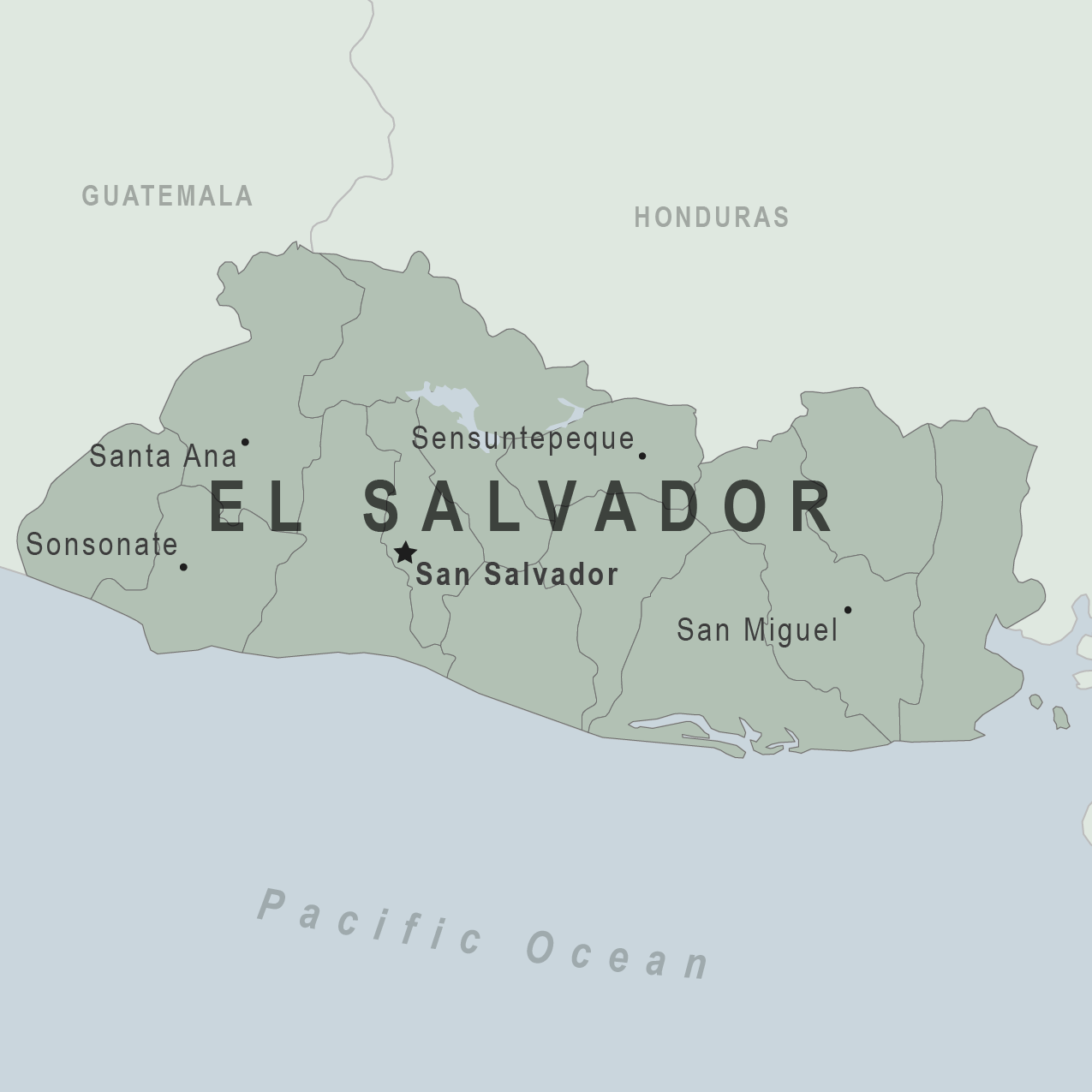
There are no notices currently in effect for El Salvador.
⇧ Top
Check the vaccines and medicines list and visit your doctor at least a month before your trip to get vaccines or medicines you may need. If you or your doctor need help finding a location that provides certain vaccines or medicines, visit the Find a Clinic page.
Routine vaccines
Recommendations.
Make sure you are up-to-date on all routine vaccines before every trip. Some of these vaccines include
- Chickenpox (Varicella)
- Diphtheria-Tetanus-Pertussis
- Flu (influenza)
- Measles-Mumps-Rubella (MMR)
Immunization schedules
All eligible travelers should be up to date with their COVID-19 vaccines. Please see Your COVID-19 Vaccination for more information.
COVID-19 vaccine
Hepatitis A
Recommended for unvaccinated travelers one year old or older going to El Salvador.
Infants 6 to 11 months old should also be vaccinated against Hepatitis A. The dose does not count toward the routine 2-dose series.
Travelers allergic to a vaccine component or who are younger than 6 months should receive a single dose of immune globulin, which provides effective protection for up to 2 months depending on dosage given.
Unvaccinated travelers who are over 40 years old, immunocompromised, or have chronic medical conditions planning to depart to a risk area in less than 2 weeks should get the initial dose of vaccine and at the same appointment receive immune globulin.
Hepatitis A - CDC Yellow Book
Dosing info - Hep A
Hepatitis B
Recommended for unvaccinated travelers younger than 60 years old traveling to El Salvador. Unvaccinated travelers 60 years and older may get vaccinated before traveling to El Salvador.
Hepatitis B - CDC Yellow Book
Dosing info - Hep B
Cases of measles are on the rise worldwide. Travelers are at risk of measles if they have not been fully vaccinated at least two weeks prior to departure, or have not had measles in the past, and travel internationally to areas where measles is spreading.
All international travelers should be fully vaccinated against measles with the measles-mumps-rubella (MMR) vaccine, including an early dose for infants 6–11 months, according to CDC’s measles vaccination recommendations for international travel .
Measles (Rubeola) - CDC Yellow Book
Dogs infected with rabies are sometimes found in El Salvador.
Rabies is also present in bats.
If rabies exposures occur while in El Salvador, rabies vaccines may only be available in larger suburban/urban medical facilities.
Rabies pre-exposure vaccination considerations include whether travelers 1) will be performing occupational or recreational activities that increase risk for exposure to potentially rabid animals and 2) might have difficulty getting prompt access to safe post-exposure prophylaxis.
Please consult with a healthcare provider to determine whether you should receive pre-exposure vaccination before travel.
For more information, see country rabies status assessments .
Rabies - CDC Yellow Book
Recommended for most travelers, especially those staying with friends or relatives or visiting smaller cities or rural areas.
Typhoid - CDC Yellow Book
Dosing info - Typhoid
Yellow Fever
Required for travelers ≥1 year old arriving from countries with risk for YF virus transmission; this includes >12-hour airport transits or layovers in countries with risk for YF virus transmission. 1
Yellow Fever - CDC Yellow Book
Avoid contaminated water
Leptospirosis
How most people get sick (most common modes of transmission)
- Touching urine or other body fluids from an animal infected with leptospirosis
- Swimming or wading in urine-contaminated fresh water, or contact with urine-contaminated mud
- Drinking water or eating food contaminated with animal urine
- Avoid contaminated water and soil
- Avoid floodwater
Clinical Guidance
Avoid bug bites, chagas disease (american trypanosomiasis).
- Accidentally rub feces (poop) of the triatomine bug into the bug bite, other breaks in the skin, your eyes, or mouth
- From pregnant woman to her baby, contaminated blood products (transfusions), or contaminated food or drink.
- Avoid Bug Bites
Chagas disease
- Mosquito bite
Leishmaniasis
- Sand fly bite
- An infected pregnant woman can spread it to her unborn baby
Airborne & droplet
- Breathing in air or accidentally eating food contaminated with the urine, droppings, or saliva of infected rodents
- Bite from an infected rodent
- Less commonly, being around someone sick with hantavirus (only occurs with Andes virus)
- Avoid rodents and areas where they live
- Avoid sick people
Tuberculosis (TB)
- Breathe in TB bacteria that is in the air from an infected and contagious person coughing, speaking, or singing.
Learn actions you can take to stay healthy and safe on your trip. Vaccines cannot protect you from many diseases in El Salvador, so your behaviors are important.
Eat and drink safely
Food and water standards around the world vary based on the destination. Standards may also differ within a country and risk may change depending on activity type (e.g., hiking versus business trip). You can learn more about safe food and drink choices when traveling by accessing the resources below.
- Choose Safe Food and Drinks When Traveling
- Water Treatment Options When Hiking, Camping or Traveling
- Global Water, Sanitation and Hygiene (WASH)
- Avoid Contaminated Water During Travel
You can also visit the Department of State Country Information Pages for additional information about food and water safety.
Prevent bug bites
Bugs (like mosquitoes, ticks, and fleas) can spread a number of diseases in El Salvador. Many of these diseases cannot be prevented with a vaccine or medicine. You can reduce your risk by taking steps to prevent bug bites.
What can I do to prevent bug bites?
- Cover exposed skin by wearing long-sleeved shirts, long pants, and hats.
- Use an appropriate insect repellent (see below).
- Use permethrin-treated clothing and gear (such as boots, pants, socks, and tents). Do not use permethrin directly on skin.
- Stay and sleep in air-conditioned or screened rooms.
- Use a bed net if the area where you are sleeping is exposed to the outdoors.
What type of insect repellent should I use?
- FOR PROTECTION AGAINST TICKS AND MOSQUITOES: Use a repellent that contains 20% or more DEET for protection that lasts up to several hours.
- Picaridin (also known as KBR 3023, Bayrepel, and icaridin)
- Oil of lemon eucalyptus (OLE) or para-menthane-diol (PMD)
- 2-undecanone
- Always use insect repellent as directed.
What should I do if I am bitten by bugs?
- Avoid scratching bug bites, and apply hydrocortisone cream or calamine lotion to reduce the itching.
- Check your entire body for ticks after outdoor activity. Be sure to remove ticks properly.
What can I do to avoid bed bugs?
Although bed bugs do not carry disease, they are an annoyance. See our information page about avoiding bug bites for some easy tips to avoid them. For more information on bed bugs, see Bed Bugs .
For more detailed information on avoiding bug bites, see Avoid Bug Bites .
Stay safe outdoors
If your travel plans in El Salvador include outdoor activities, take these steps to stay safe and healthy during your trip.
- Stay alert to changing weather conditions and adjust your plans if conditions become unsafe.
- Prepare for activities by wearing the right clothes and packing protective items, such as bug spray, sunscreen, and a basic first aid kit.
- Consider learning basic first aid and CPR before travel. Bring a travel health kit with items appropriate for your activities.
- If you are outside for many hours in heat, eat salty snacks and drink water to stay hydrated and replace salt lost through sweating.
- Protect yourself from UV radiation : use sunscreen with an SPF of at least 15, wear protective clothing, and seek shade during the hottest time of day (10 a.m.–4 p.m.).
- Be especially careful during summer months and at high elevation. Because sunlight reflects off snow, sand, and water, sun exposure may be increased during activities like skiing, swimming, and sailing.
- Very cold temperatures can be dangerous. Dress in layers and cover heads, hands, and feet properly if you are visiting a cold location.
Stay safe around water
- Swim only in designated swimming areas. Obey lifeguards and warning flags on beaches.
- Practice safe boating—follow all boating safety laws, do not drink alcohol if driving a boat, and always wear a life jacket.
- Do not dive into shallow water.
- Do not swim in freshwater in developing areas or where sanitation is poor.
- Avoid swallowing water when swimming. Untreated water can carry germs that make you sick.
- To prevent infections, wear shoes on beaches where there may be animal waste.
Leptospirosis, a bacterial infection that can be spread in fresh water, is found in El Salvador. Avoid swimming in fresh, unchlorinated water, such as lakes, ponds, or rivers.
Keep away from animals
Most animals avoid people, but they may attack if they feel threatened, are protecting their young or territory, or if they are injured or ill. Animal bites and scratches can lead to serious diseases such as rabies.
Follow these tips to protect yourself:
- Do not touch or feed any animals you do not know.
- Do not allow animals to lick open wounds, and do not get animal saliva in your eyes or mouth.
- Avoid rodents and their urine and feces.
- Traveling pets should be supervised closely and not allowed to come in contact with local animals.
- If you wake in a room with a bat, seek medical care immediately. Bat bites may be hard to see.
All animals can pose a threat, but be extra careful around dogs, bats, monkeys, sea animals such as jellyfish, and snakes. If you are bitten or scratched by an animal, immediately:
- Wash the wound with soap and clean water.
- Go to a doctor right away.
- Tell your doctor about your injury when you get back to the United States.
Consider buying medical evacuation insurance. Rabies is a deadly disease that must be treated quickly, and treatment may not be available in some countries.
Reduce your exposure to germs
Follow these tips to avoid getting sick or spreading illness to others while traveling:
- Wash your hands often, especially before eating.
- If soap and water aren’t available, clean hands with hand sanitizer (containing at least 60% alcohol).
- Don’t touch your eyes, nose, or mouth. If you need to touch your face, make sure your hands are clean.
- Cover your mouth and nose with a tissue or your sleeve (not your hands) when coughing or sneezing.
- Try to avoid contact with people who are sick.
- If you are sick, stay home or in your hotel room, unless you need medical care.
Avoid sharing body fluids
Diseases can be spread through body fluids, such as saliva, blood, vomit, and semen.
Protect yourself:
- Use latex condoms correctly.
- Do not inject drugs.
- Limit alcohol consumption. People take more risks when intoxicated.
- Do not share needles or any devices that can break the skin. That includes needles for tattoos, piercings, and acupuncture.
- If you receive medical or dental care, make sure the equipment is disinfected or sanitized.
Know how to get medical care while traveling
Plan for how you will get health care during your trip, should the need arise:
- Carry a list of local doctors and hospitals at your destination.
- Review your health insurance plan to determine what medical services it would cover during your trip. Consider purchasing travel health and medical evacuation insurance.
- Carry a card that identifies, in the local language, your blood type, chronic conditions or serious allergies, and the generic names of any medications you take.
- Some prescription drugs may be illegal in other countries. Call El Salvador’s embassy to verify that all of your prescription(s) are legal to bring with you.
- Bring all the medicines (including over-the-counter medicines) you think you might need during your trip, including extra in case of travel delays. Ask your doctor to help you get prescriptions filled early if you need to.
Many foreign hospitals and clinics are accredited by the Joint Commission International. A list of accredited facilities is available at their website ( www.jointcommissioninternational.org ).
In some countries, medicine (prescription and over-the-counter) may be substandard or counterfeit. Bring the medicines you will need from the United States to avoid having to buy them at your destination.
Select safe transportation
Motor vehicle crashes are the #1 killer of healthy US citizens in foreign countries.
In many places cars, buses, large trucks, rickshaws, bikes, people on foot, and even animals share the same lanes of traffic, increasing the risk for crashes.
Be smart when you are traveling on foot.
- Use sidewalks and marked crosswalks.
- Pay attention to the traffic around you, especially in crowded areas.
- Remember, people on foot do not always have the right of way in other countries.
Riding/Driving
Choose a safe vehicle.
- Choose official taxis or public transportation, such as trains and buses.
- Ride only in cars that have seatbelts.
- Avoid overcrowded, overloaded, top-heavy buses and minivans.
- Avoid riding on motorcycles or motorbikes, especially motorbike taxis. (Many crashes are caused by inexperienced motorbike drivers.)
- Choose newer vehicles—they may have more safety features, such as airbags, and be more reliable.
- Choose larger vehicles, which may provide more protection in crashes.
Think about the driver.
- Do not drive after drinking alcohol or ride with someone who has been drinking.
- Consider hiring a licensed, trained driver familiar with the area.
- Arrange payment before departing.
Follow basic safety tips.
- Wear a seatbelt at all times.
- Sit in the back seat of cars and taxis.
- When on motorbikes or bicycles, always wear a helmet. (Bring a helmet from home, if needed.)
- Avoid driving at night; street lighting in certain parts of El Salvador may be poor.
- Do not use a cell phone or text while driving (illegal in many countries).
- Travel during daylight hours only, especially in rural areas.
- If you choose to drive a vehicle in El Salvador, learn the local traffic laws and have the proper paperwork.
- Get any driving permits and insurance you may need. Get an International Driving Permit (IDP). Carry the IDP and a US-issued driver's license at all times.
- Check with your auto insurance policy's international coverage, and get more coverage if needed. Make sure you have liability insurance.
- Avoid using local, unscheduled aircraft.
- If possible, fly on larger planes (more than 30 seats); larger airplanes are more likely to have regular safety inspections.
- Try to schedule flights during daylight hours and in good weather.
Medical Evacuation Insurance
If you are seriously injured, emergency care may not be available or may not meet US standards. Trauma care centers are uncommon outside urban areas. Having medical evacuation insurance can be helpful for these reasons.
Helpful Resources
Road Safety Overseas (Information from the US Department of State): Includes tips on driving in other countries, International Driving Permits, auto insurance, and other resources.
The Association for International Road Travel has country-specific Road Travel Reports available for most countries for a minimal fee.
Maintain personal security
Use the same common sense traveling overseas that you would at home, and always stay alert and aware of your surroundings.
Before you leave
- Research your destination(s), including local laws, customs, and culture.
- Monitor travel advisories and alerts and read travel tips from the US Department of State.
- Enroll in the Smart Traveler Enrollment Program (STEP) .
- Leave a copy of your itinerary, contact information, credit cards, and passport with someone at home.
- Pack as light as possible, and leave at home any item you could not replace.
While at your destination(s)
- Carry contact information for the nearest US embassy or consulate .
- Carry a photocopy of your passport and entry stamp; leave the actual passport securely in your hotel.
- Follow all local laws and social customs.
- Do not wear expensive clothing or jewelry.
- Always keep hotel doors locked, and store valuables in secure areas.
- If possible, choose hotel rooms between the 2nd and 6th floors.
Healthy Travel Packing List
Use the Healthy Travel Packing List for El Salvador for a list of health-related items to consider packing for your trip. Talk to your doctor about which items are most important for you.
Why does CDC recommend packing these health-related items?
It’s best to be prepared to prevent and treat common illnesses and injuries. Some supplies and medicines may be difficult to find at your destination, may have different names, or may have different ingredients than what you normally use.
If you are not feeling well after your trip, you may need to see a doctor. If you need help finding a travel medicine specialist, see Find a Clinic . Be sure to tell your doctor about your travel, including where you went and what you did on your trip. Also tell your doctor if you were bitten or scratched by an animal while traveling.
For more information on what to do if you are sick after your trip, see Getting Sick after Travel .
Map Disclaimer - The boundaries and names shown and the designations used on maps do not imply the expression of any opinion whatsoever on the part of the Centers for Disease Control and Prevention concerning the legal status of any country, territory, city or area or of its authorities, or concerning the delimitation of its frontiers or boundaries. Approximate border lines for which there may not yet be full agreement are generally marked.
Other Destinations
If you need help finding travel information:
Message & data rates may apply. CDC Privacy Policy
File Formats Help:
- Adobe PDF file
- Microsoft PowerPoint file
- Microsoft Word file
- Microsoft Excel file
- Audio/Video file
- Apple Quicktime file
- RealPlayer file
- Zip Archive file
Exit Notification / Disclaimer Policy
- The Centers for Disease Control and Prevention (CDC) cannot attest to the accuracy of a non-federal website.
- Linking to a non-federal website does not constitute an endorsement by CDC or any of its employees of the sponsors or the information and products presented on the website.
- You will be subject to the destination website's privacy policy when you follow the link.
- CDC is not responsible for Section 508 compliance (accessibility) on other federal or private website.
- Skip to main content
- Skip to "About this site"
Language selection
Search travel.gc.ca.
Help us to improve our website. Take our survey !
COVID-19: travel health notice for all travellers
El Salvador travel advice
Latest updates: Editorial change
Last updated: June 7, 2024 11:35 ET
On this page
Safety and security, entry and exit requirements, laws and culture, natural disasters and climate, el salvador - exercise a high degree of caution.
Exercise a high degree of caution in El Salvador due to the risk of arbitrary enforcement of local laws and violent crime
Back to top
Emergency measures
In March 2022, the government of El Salvador put emergency measures in place, resulting in massive arrests of suspected criminals. These measures frequently involve the deployment of military and security forces to targeted areas to combat organized crime.
Although the security situation has improved, a state of exception remains in effect. As a result, security forces have increased rights to conduct searches, seizures, and detain persons of interest, including foreign citizens. Local authorities have detained foreigners, sometimes in a reportedly arbitrary manner.
If you're in El Salvador:
- be aware that you may be subject to searches by security forces
- expect a heightened security presence, including on roads, in public spaces, and in residential neighbourhoods
- always cooperate with military and police officers
- carry valid ID at all times and be prepared for various checkpoints
- limit your movements after dark
- ensure family or friends know where you are
- monitor local media to stay informed on the evolving situation
- follow the instructions of local authorities
Crime is a serious problem throughout the country.
Violent crime
Violent crime has decreased significantly since March 2022, especially in urban areas, including the metropolitan area of San Salvador and resort areas. However, violent crime still occurs, often involving armed gang members as well as common and petty criminals.
Armed robberies occur with weapons such as guns and knives, especially on public transportation. Robberies by thieves on motorcycles occur. Robberies may occur in tourist areas, especially isolated scenic spots.
- Remain vigilant and exercise caution at all times
- Don’t show signs of affluence or display valuables, particularly jewellery and electronics, including cell phones
- Check in advance with local contacts, authorities or hotels to see if your chosen destination is safe and which is the best route to get there
- Travel in groups if possible
- Avoid walking after dark
- Stay at hotels that have robust security measures
- Keep in mind that even the most secure locations are not completely free of risk
If you're threatened by armed criminals:
- don't resist, as gang members in particular can be quick to engage in violence
- avoid eye contact with the perpetrators
Petty crime
Petty crime, such as pickpocketing and purse snatching, is common.
Thieves also break into cars parked in public places.
- Avoid displaying signs of affluence in public, including when landing at El Salvador's international airport
- Ensure that your belongings, including your passport and other travel documents, are secure at all times
- Avoid carrying large amounts of cash
- Be particularly discreet when using ATMs
- Choose supervised parking lots if available
- Keep car doors locked and windows closed at all times
- Don't leave any valuables in your car
If you're robbed, go to a police station and report the crime immediately.
Most Salvadorans don’t speak English or French. You should not expect assistance in your preferred language.
Greater San Salvador Area
In the city of San Salvador, neighbourhoods such as Escalón, La Cima, San Benito and San Francisco are relatively safe.
To attract more tourists, local authorities have made efforts to secure a few blocks in the downtown area, known as the Centro Histórico de San Salvador. The Centro Histórico includes:
- the Metropolitan Cathedral
- the National Palace
- the National Theatre
- Plaza Barrios
- Plaza Libertad
- Plaza Morazán
Outside that area, the entire downtown is unsafe for tourists.
Dangerous areas in San Salvador can be as small as two or three blocks in a broader generally safe neighbourhood. They are often known as “zonas marginales” or “comunidades.”
Avoid crossing an area that is a known criminal stronghold, even if you are only trying reach a safer neighbourhood.
Neighbouring cities to the west of the capital are generally safe. These include:
- Antiguo Cuscatlán, including Santa Elena
- Nuevo Cuscatlán
- Santa Tecla, including Ciudad Merliot
Crime occurs more frequently in cities to the north and east, such as:
- Ciudad Delgado
- San Martín
Border crossings
Border areas often see higher criminal activity and violence, including in rural areas.
El Salvador lies along well-established Central American trafficking routes. Criminal groups smuggling people, guns or drugs can be violent. There have been incidents of travellers being attacked near border crossings.
Some border crossings occasionally close without warning.
If you plan to cross land borders in El Salvador:
- do so early enough so you arrive at destination before dark
- use official border crossings only
- avoid exchanging currency
- avoid displaying money or valuable items such as jewellery and electronic equipment
Organized crime
Gang-related crime has reduced significantly since March 2022, when the government began major efforts to contain gang-related crime and arrest thousands of gang members. While gang violence rarely targets foreigners, violent assaults against tourists may occur.
Violent incidents carried out by gangs are frequent, including:
- armed robbery
- assaults, especially on highways
- home invasion
There are urban neighbourhoods and rural areas with one or few entrances where local gang members monitor non-residents to rob them.
Tattoos may be considered as an indication of gang affiliation. Travellers should consider covering tattoos when travelling in El Salvador.
Express kidnappings
Express kidnappings occur, particularly in high-crime areas.
In this scenario, criminals kidnap the victim and force the person to withdraw funds from an ATM.
Victims are generally selected on the basis of perceived wealth, including driving late-model cars. They are identified at places such as:
- shopping centres
- gas stations
- restaurants
- parking lots
Credit card, ATM and Bitcoin e-wallet fraud occurs. There have been reports of identity theft and failed transactions, especially involving Chivo, the Salvadoran government’s official Bitcoin e-wallet.
When using debit or credit cards or Bitcoin e-wallets:
- pay careful attention if others are handling your cards
- use ATMs located public areas or inside a bank or business
- avoid using card readers with an irregular or unusual feature
- cover the keypad with one hand when entering your PIN
- check for any unauthorized transactions on your account statements
Overseas fraud
Women's safety
Women travelling alone may be subject to some forms of harassment and verbal abuse.
Incidents of sexual assault occur, including on public buses and at beach areas.
- Avoid travelling alone, with informal guides or with strangers, even if they appear friendly and helpful
- Avoid public buses and large crowds on the street
- Exercise caution at nightclubs and beaches
If you are a victim of sexual assault, report it to the police and contact the Embassy of Canada in San Salvador.
Advice for women travellers
Spiked food and drinks
Never leave food or drinks unattended or in the care of strangers. Be wary of accepting snacks, beverages, gum or cigarettes from new acquaintances. These items may contain drugs that could put you at risk of sexual assault and robbery.
Soccer matches
Avoid crowds that can form without warning at sporting events such as soccer matches, as they have led to violent incidents. Exercise caution if attending a soccer match or if staying in the vicinity of sporting venues.
Criminals have targeted tourists climbing volcanoes and hiking in remote locations.
Access to volcanoes may also be restricted due to volcanic activity or high winds, especially:
- Izalco volcano
- Santa Ana, also known as Ilamatepec, volcano
- San Miguel, also known as Chaparrastique, volcano
If you intend to go hiking:
- never do so alone and always hire an experienced guide from a reputable company
- buy travel insurance that includes helicopter rescue and medical evacuation
- ensure that your physical condition is good enough to meet the challenges of your activity
- ensure that you're properly equipped
- ensure that you’re well informed about weather and other conditions that may pose a hazard
- inform a family member or friend of your itinerary, including when you expect to be back
- know the symptoms of acute altitude sickness, which can be fatal
- obtain detailed information on routes before setting out and do not venture off marked trails
Water activities
Coastal waters can be dangerous, even for experienced swimmers. Riptides are common. Several drownings occur each year.
Lifeguards don’t usually supervise beaches. Rescue services may not be consistent with international standards.
If you plan on swimming or surfing:
- consult residents and tour operators for information on possible hazards and safe areas
- follow the instructions and warnings of local authorities
- avoid isolated beaches
- monitor weather reports, especially during the rainy season, as prolonged periods of rain can cause the height of waves to increase along beaches
If you plan on participating in boating activities, such as whale-watching:
- choose a well-established and reputable company that has insurance
- make sure the vessel you are boarding is carrying appropriate safety equipment and that life jackets are provided for all passengers and accessible at all times
- don’t board vessels that appear overloaded or unseaworthy
If in doubt concerning the safety of the facilities or equipment, don’t use them.
Water safety abroad
Demonstrations
Demonstrations and protest marches take place regularly, especially on main roads in San Salvador near:
- the National Assembly
- the Presidential House
- San Salvador City Hall
- the Judicial District
- Cuscatlán Park
- Plaza Salvador del Mundo
Even peaceful demonstrations can turn violent at any time. They can also lead to disruptions to traffic and public transportation.
- Avoid areas where demonstrations and large gatherings are taking place
- Follow the instructions of local authorities
- Monitor local media for information on ongoing demonstrations
Mass gatherings (large-scale events)
Road travel
Road conditions and road safety vary greatly throughout the country. Serious accidents are common.
Road conditions
Many rural roads are unpaved and some rural areas are accessible only by four-wheel-drive vehicle.
Roundabouts are common.
Driving can be dangerous due to:
- dangerous curves in roads
- poorly marked road signs
- poor lighting at night
- potholes and missing manhole covers
- construction sites
- roaming livestock
- pedestrians on the shoulder of highways
- slow-moving, overloaded or poorly maintained vehicles
Driving habits
Drivers don’t respect traffic laws. They often drive at excessive speeds. They are aggressive and reckless, and frequently overtake on both the right and the left.
Bus drivers and motorcyclists in particular can be aggressive or unpredictable.
Narrow lanes and heavy traffic offer little courtesy for cyclists. Most Salvadoran cyclists travel with a trailing car for safety.
Checkpoints
Police traffic checkpoints are common across the country. Officers will often ask to see your valid documents and your mandatory safety equipment. They may also be checking for impaired drivers or for gang members.
If you drive in El Salvador:
- always drive defensively
- plan your trip ahead of time, especially if you plan to visit a rural area
- use caution when entering a roundabout
- avoid road travel at night between cities
- avoid stopping at isolated viewpoints
- keep your car doors locked and the windows closed at all times
- avoid hitchhiking, which is not a common practice in El Salvador
Public transportation
Buses are often unreliable. They are poorly maintained and the site of petty theft, armed robbery and sexual harassment.
- Don’t use local or intercity public buses
- Use only reputable tour operators and international coach services use only a company with a strong reputation
Taxis and ridesharing services
Taxis are widely available but vary in quality. Major hotels work with executive transport companies.
If using a taxi in El Salvador:
- don’t board taxis at taxi stands
- don’t hail taxis in the street
- negotiate fares in advance
Ridesharing services are available in much of greater San Salvador. If you use a trusted ridesharing app, confirm the driver’s identity and the licence plate before getting in the car.
We do not make assessments on the compliance of foreign domestic airlines with international safety standards.
Information about foreign domestic airlines
Every country or territory decides who can enter or exit through its borders. The Government of Canada cannot intervene on your behalf if you do not meet your destination’s entry or exit requirements.
We have obtained the information on this page from the Salvadoran authorities. It can, however, change at any time.
Verify this information with the Foreign Representatives in Canada .
Entry requirements vary depending on the type of passport you use for travel.
Before you travel, check with your transportation company about passport requirements. Its rules on passport validity may be more stringent than the country’s entry rules.
Regular Canadian passport
Your passport must be valid for at least 6 months beyond the date you expect to leave El Salvador.
Passport for official travel
Different entry rules may apply.
Official travel
Passport with “X” gender identifier
While the Government of Canada issues passports with an “X” gender identifier, it cannot guarantee your entry or transit through other countries. You might face entry restrictions in countries that do not recognize the “X” gender identifier. Before you leave, check with the closest foreign representative for your destination.
Other travel documents
Different entry rules may apply when travelling with a temporary passport or an emergency travel document. Before you leave, check with the closest foreign representative for your destination.
Useful links
- Foreign Representatives in Canada
- Canadian passports
Tourist visa: not required for stays up to 90 days Business visa: not required for stays up to 90 days Student visa: not required for stays up to 90 days
Entry immigration card
To enter El Salvador, you must purchase an entry immigration card, which is valid for up to 180 days. Local officials determine the validity period of the card.
The entry immigration card is not a visa, but it’s a mandatory requirement when you enter through El Salvador’s international airport.
You don’t need an entry immigration card if you either:
- hold a Canadian passport showing you were born in El Salvador, or
- show proof that one of your parents is a Salvadoran national
Keep the receipt of your entry immigration card with your passport. It will allow you to re-enter El Salvador, as long as it is still valid.
You may request an extension of up to 90 days once a year for your entry immigration card. To extend your stay in El Salvador beyond 90 days, you must apply to the immigration authorities at least 5 days before the expiration date of your stay.
Entry and exit stamps
You must obtain entry and exit stamps at border crossings.
Central America-4 Border Control Agreement
Under the terms of the Central America-4 Border Control Agreement (CA-4), your Salvadoran entry immigration card will allow you to travel for up to a total of 90 days within any of the CA-4 countries, which are:
- El Salvador
When travelling between these countries, you still must check in at immigration counters but don’t need to obtain additional permits. Other countries’ authorities will stamp your passport to record your entry/exit dates and to ensure that you have not overstayed the initial time authorized for your visit in the CA-4 region. The 90-day period begins at your first point of entry to any of the CA-4 countries. You will be fined if you exceed the 90-day limit.
You may request an extension of up to 90 days once a year. If you are in El Salvador, you must request this extension and pay the required fee at El Salvador’s immigration headquarters in San Salvador at least 5 days before your first 90-day limit expires. Immigration authorities will determine the length of the extension.
If you have received a new Canadian passport while inside El Salvador – for example, your previous passport was lost – and you want to continue travelling by land in the CA-4 region, you need a new Salvadoran entry stamp in your new passport before entering one of the other countries. You must present your new passport at El Salvador’s immigration headquarters to arrange this.
Work or study
If you intend to work or study in El Salvador for longer than 90 days, you must apply for residence from inside the country. The documentation required to obtain Salvadoran residence is extensive.
Make sure you have all the required documents before you leave Canada.
Other entry requirements
Customs officials may ask you to show them a return or onward ticket and proof of sufficient funds to cover the cost of your stay.
- Children and travel
A Canadian minor, under 18 years of age, living in or visiting El Salvador for more than one year is considered a resident of El Salvador.
To depart El Salvador, a minor resident needs written consent from any parent listed on the child’s birth certificate who is not travelling with the minor. The consent form must be:
- an original document (not a photocopy or a scan)
- notarized by either a Salvadoran notary in El Salvador or a Salvadoran consul abroad.
Travelling with children
Yellow fever
Learn about potential entry requirements related to yellow fever (vaccines section).
Relevant Travel Health Notices
- Global Measles Notice - 13 March, 2024
- Zika virus: Advice for travellers - 31 August, 2023
- COVID-19 and International Travel - 13 March, 2024
This section contains information on possible health risks and restrictions regularly found or ongoing in the destination. Follow this advice to lower your risk of becoming ill while travelling. Not all risks are listed below.
Consult a health care professional or visit a travel health clinic preferably 6 weeks before you travel to get personalized health advice and recommendations.
Routine vaccines
Be sure that your routine vaccinations , as per your province or territory , are up-to-date before travelling, regardless of your destination.
Some of these vaccinations include measles-mumps-rubella (MMR), diphtheria, tetanus, pertussis, polio, varicella (chickenpox), influenza and others.
Pre-travel vaccines and medications
You may be at risk for preventable diseases while travelling in this destination. Talk to a travel health professional about which medications or vaccines may be right for you, based on your destination and itinerary.
Yellow fever is a disease caused by a flavivirus from the bite of an infected mosquito.
Travellers get vaccinated either because it is required to enter a country or because it is recommended for their protection.
- There is no risk of yellow fever in this country.
Country Entry Requirement*
- Proof of vaccination is required if you are coming from or have transited through an airport of a country where yellow fever occurs.
Recommendation
- Vaccination is not recommended.
- Discuss travel plans, activities, and destinations with a health care professional.
- Contact a designated Yellow Fever Vaccination Centre well in advance of your trip to arrange for vaccination.
About Yellow Fever
Yellow Fever Vaccination Centres in Canada * It is important to note that country entry requirements may not reflect your risk of yellow fever at your destination. It is recommended that you contact the nearest diplomatic or consular office of the destination(s) you will be visiting to verify any additional entry requirements.
There is a risk of hepatitis A in this destination. It is a disease of the liver. People can get hepatitis A if they ingest contaminated food or water, eat foods prepared by an infectious person, or if they have close physical contact (such as oral-anal sex) with an infectious person, although casual contact among people does not spread the virus.
Practise safe food and water precautions and wash your hands often. Vaccination is recommended for all travellers to areas where hepatitis A is present.
Measles is a highly contagious viral disease. It can spread quickly from person to person by direct contact and through droplets in the air.
Anyone who is not protected against measles is at risk of being infected with it when travelling internationally.
Regardless of where you are going, talk to a health care professional before travelling to make sure you are fully protected against measles.
Hepatitis B is a risk in every destination. It is a viral liver disease that is easily transmitted from one person to another through exposure to blood and body fluids containing the hepatitis B virus. Travellers who may be exposed to blood or other bodily fluids (e.g., through sexual contact, medical treatment, sharing needles, tattooing, acupuncture or occupational exposure) are at higher risk of getting hepatitis B.
Hepatitis B vaccination is recommended for all travellers. Prevent hepatitis B infection by practicing safe sex, only using new and sterile drug equipment, and only getting tattoos and piercings in settings that follow public health regulations and standards.
The best way to protect yourself from seasonal influenza (flu) is to get vaccinated every year. Get the flu shot at least 2 weeks before travelling.
The flu occurs worldwide.
- In the Northern Hemisphere, the flu season usually runs from November to April.
- In the Southern Hemisphere, the flu season usually runs between April and October.
- In the tropics, there is flu activity year round.
The flu vaccine available in one hemisphere may only offer partial protection against the flu in the other hemisphere.
The flu virus spreads from person to person when they cough or sneeze or by touching objects and surfaces that have been contaminated with the virus. Clean your hands often and wear a mask if you have a fever or respiratory symptoms.
Coronavirus disease (COVID-19) is an infectious viral disease. It can spread from person to person by direct contact and through droplets in the air.
It is recommended that all eligible travellers complete a COVID-19 vaccine series along with any additional recommended doses in Canada before travelling. Evidence shows that vaccines are very effective at preventing severe illness, hospitalization and death from COVID-19. While vaccination provides better protection against serious illness, you may still be at risk of infection from the virus that causes COVID-19. Anyone who has not completed a vaccine series is at increased risk of being infected with the virus that causes COVID-19 and is at greater risk for severe disease when travelling internationally.
Before travelling, verify your destination’s COVID-19 vaccination entry/exit requirements. Regardless of where you are going, talk to a health care professional before travelling to make sure you are adequately protected against COVID-19.
In this destination, rabies is commonly carried by dogs and some wildlife, including bats. Rabies is a deadly disease that spreads to humans primarily through bites or scratches from an infected animal. While travelling, take precautions , including keeping your distance from animals (including free-roaming dogs), and closely supervising children.
If you are bitten or scratched by a dog or other animal while travelling, immediately wash the wound with soap and clean water and see a health care professional. In this destination, rabies treatment may be limited or may not be available, therefore you may need to return to Canada for treatment.
Before travel, discuss rabies vaccination with a health care professional. It may be recommended for travellers who are at high risk of exposure (e.g., occupational risk such as veterinarians and wildlife workers, children, adventure travellers and spelunkers, and others in close contact with animals).
Safe food and water precautions
Many illnesses can be caused by eating food or drinking beverages contaminated by bacteria, parasites, toxins, or viruses, or by swimming or bathing in contaminated water.
- Learn more about food and water precautions to take to avoid getting sick by visiting our eat and drink safely abroad page. Remember: Boil it, cook it, peel it, or leave it!
- Avoid getting water into your eyes, mouth or nose when swimming or participating in activities in freshwater (streams, canals, lakes), particularly after flooding or heavy rain. Water may look clean but could still be polluted or contaminated.
- Avoid inhaling or swallowing water while bathing, showering, or swimming in pools or hot tubs.
Travellers' diarrhea is the most common illness affecting travellers. It is spread from eating or drinking contaminated food or water.
Risk of developing travellers' diarrhea increases when travelling in regions with poor standards of hygiene and sanitation. Practise safe food and water precautions.
The most important treatment for travellers' diarrhea is rehydration (drinking lots of fluids). Carry oral rehydration salts when travelling.
Typhoid is a bacterial infection spread by contaminated food or water. Risk is higher among children, travellers going to rural areas, travellers visiting friends and relatives or those travelling for a long period of time.
Travellers visiting regions with a risk of typhoid, especially those exposed to places with poor sanitation, should speak to a health care professional about vaccination.
Insect bite prevention
Many diseases are spread by the bites of infected insects such as mosquitoes, ticks, fleas or flies. When travelling to areas where infected insects may be present:
- Use insect repellent (bug spray) on exposed skin
- Cover up with light-coloured, loose clothes made of tightly woven materials such as nylon or polyester
- Minimize exposure to insects
- Use mosquito netting when sleeping outdoors or in buildings that are not fully enclosed
To learn more about how you can reduce your risk of infection and disease caused by bites, both at home and abroad, visit our insect bite prevention page.
Find out what types of insects are present where you’re travelling, when they’re most active, and the symptoms of the diseases they spread.
There is a risk of chikungunya in this country. The risk may vary between regions of a country. Chikungunya is a virus spread through the bite of an infected mosquito. Chikungunya can cause a viral disease that typically causes fever and pain in the joints. In some cases, the joint pain can be severe and last for months or years.
Protect yourself from mosquito bites at all times. There is no vaccine available for chikungunya.
- In this country, dengue is a risk to travellers. It is a viral disease spread to humans by mosquito bites.
- Dengue can cause flu-like symptoms. In some cases, it can lead to severe dengue, which can be fatal.
- The level of risk of dengue changes seasonally, and varies from year to year. The level of risk also varies between regions in a country and can depend on the elevation in the region.
- Mosquitoes carrying dengue typically bite during the daytime, particularly around sunrise and sunset.
- Protect yourself from mosquito bites . There is no vaccine or medication that protects against dengue.
Zika virus is a risk in this country.
Zika virus is primarily spread through the bite of an infected mosquito. It can also be sexually transmitted. Zika virus can cause serious birth defects.
During your trip:
- Prevent mosquito bites at all times.
- Use condoms correctly or avoid sexual contact, particularly if you are pregnant.
If you are pregnant or planning a pregnancy, you should discuss the potential risks of travelling to this destination with your health care provider. You may choose to avoid or postpone travel.
For more information, see Zika virus: Pregnant or planning a pregnancy.
American trypanosomiasis (Chagas disease) is a risk in this country. It is caused by a parasite spread by infected triatomine bugs. The infection can be inactive for decades, but humans can eventually develop complications causing disability and even death.
Risk is generally low for most travellers. Protect yourself from triatomine bugs, which are active at night, by using mosquito nets if staying in poorly-constructed housing. There is no vaccine available for Chagas disease.
Animal precautions
Some infections, such as rabies and influenza, can be shared between humans and animals. Certain types of activities may increase your chance of contact with animals, such as travelling in rural or forested areas, camping, hiking, and visiting wet markets (places where live animals are slaughtered and sold) or caves.
Travellers are cautioned to avoid contact with animals, including dogs, livestock (pigs, cows), monkeys, snakes, rodents, birds, and bats, and to avoid eating undercooked wild game.
Closely supervise children, as they are more likely to come in contact with animals.
Person-to-person infections
Stay home if you’re sick and practise proper cough and sneeze etiquette , which includes coughing or sneezing into a tissue or the bend of your arm, not your hand. Reduce your risk of colds, the flu and other illnesses by:
- washing your hands often
- avoiding or limiting the amount of time spent in closed spaces, crowded places, or at large-scale events (concerts, sporting events, rallies)
- avoiding close physical contact with people who may be showing symptoms of illness
Sexually transmitted infections (STIs) , HIV , and mpox are spread through blood and bodily fluids; use condoms, practise safe sex, and limit your number of sexual partners. Check with your local public health authority pre-travel to determine your eligibility for mpox vaccine.
Medical services and facilities
Good health care is limited in availability.
There have been some improvements in recent years, but public medical services and facilities remain below Canadian standards. State-funded public hospitals are located in large cities, mostly in San Salvador. Public clinics are located throughout the country, but their resources, hours of operation and services are limited. Public hospital services are free for foreigners.
Private clinics and hospitals are often better staffed and equipped. In the Colonia Escalón district of San Salvador, the two following hospitals offer good emergency and advanced care services:
- Hospital de Diagnóstico
- Hospital Centro Médico Escalón, formerly called Hospital de la Mujer
Private hospitals in San Salvador and other major cities, such as Santa Ana and San Miguel, may accept credit cards. However, you may have to provide upfront payment in cash to obtain private medical services elsewhere. They may also request a deposit if you require hospitalization. In rural areas, staff may ask you purchase all consumables prior to receiving care.
Most health-care providers speak only Spanish.
Medical evacuation can be very expensive and you may need it in case of serious illness or injury.
Make sure you get travel insurance that includes coverage for medical evacuation and hospital stays.
Travel health and safety
Keep in Mind...
The decision to travel is the sole responsibility of the traveller. The traveller is also responsible for his or her own personal safety.
Be prepared. Do not expect medical services to be the same as in Canada. Pack a travel health kit , especially if you will be travelling away from major city centres.
You must abide by local laws.
Learn about what you should do and how we can help if you are arrested or detained abroad .
Detention conditions may be below the standards of Canadian prisons.
Penalties for possession, use or trafficking of illegal drugs are severe. Convicted offenders can expect prison sentences.
Drugs, alcohol and travel
Political activities
El Salvador’s constitution prohibits political activities by foreigners.
You may be detained or deported if you participate in demonstrations or other political activities.
Identification
You may be subject to identity checks during your stay in El Salvador.
Always carry valid identification such as a driver's licence or passport.
Keep photocopies or digital copies of the following, in case of loss or seizure of the original:
- the identification page of your passport
- your birth certificate
- your Canadian citizenship card
- your driver’s licence
Keep originals and copies in separate safe locations.
Photography
It’s illegal to photograph:
- military installations and equipment
- schools when minors are present
Ask permission before photographing individuals, especially in areas with Indigenous presence.
Imports and exports
Salvadoran authorities require permits for the import or export of firearms, plants or animals. If you purchase an antique in El Salvador, keep your receipt in case you are asked to prove ownership at the border.
Investments
If you plan on buying property or making other investments in El Salvador, seek legal advice in Canada and in El Salvador before making any commitments. Disputes related to properties could take time and be costly to resolve.
Dual citizenship
Dual citizenship is legally recognized in El Salvador.
If you are a Canadian citizen, but also a citizen of El Salvador, our ability to offer you consular services may be limited while you're there. You may also be subject to different entry/exit requirements .
Travellers with dual citizenship
International Child Abduction
The Hague Convention on the Civil Aspects of International Child Abduction is an international treaty. It can help parents with the return of children who have been removed to or retained in certain countries in violation of custody rights. The convention applies between Canada and El Salvador.
If your child was wrongfully taken to, or is being held in El Salvador, and if the applicable conditions are met, you may apply for the return of your child to the Salvadoran court.
If you are in this situation:
- act as quickly as you can
- contact the Central Authority for your province or territory of residence for information on starting an application under The Hague Convention
- consult a lawyer in Canada and in El Salvador to explore all the legal options for the return of your child
- report the situation to the nearest Canadian government office abroad or to the Vulnerable Children's Consular Unit at Global Affairs Canada by calling the Emergency Watch and Response Centre
If your child was removed from a country other than Canada, consult a lawyer to determine if The Hague Convention applies.
Be aware that Canadian consular officials cannot interfere in private legal matters or in another country's judicial affairs.
- List of Canadian Central Authorities for the Hague Convention
- International Child Abductions: A guide for affected parents
- The Hague Convention – Hague Conference on Private International Law
- Canadian embassies and consulates by destination
- Request emergency assistance
2SLGBTQI+ travellers
Salvadoran law does not prohibit sexual acts between individuals of the same sex.
However, 2SLGBTQI+ travellers could face discrimination based on their sexual orientation, gender identity, gender expression or sex characteristics.
Travel and your sexual orientation, gender identity, gender expression and sex characteristics
You can drive with your valid Canadian driver’s licence for the period you are allowed to stay in the country.
In the event of a car accident, as required by Salvadoran law:
- remain at the scene
- call the police
- don’t move your vehicle until the authorities arrive
Some accidents may attract a crowd that could turn hostile. If you feel unsafe:
- ensure your windows and doors are locked
- leave the area
- report the accident to the police and your insurance company as soon as possible
If you plan to travel between countries, you must carry an international driving permit.
International Driving Permit
There are two official currencies in El Salvador:
- the U.S. dollar (USD)
- Bitcoin (BTC)
Bitcoin became legal tender in September 2021, though not all businesses have fully transitioned to accepting it. Traditional and Bitcoin ATMs are widely available.
Canadian credit and debit cards are generally accepted. However, Canadian dollars cannot be exchanged in El Salvador.
When exchanging money before your trip, ask for small denominations. Bills of $50 and $100 are not widely accepted and increase the risk of robbery.
Earthquakes and tsunamis
El Salvador is located in a highly active seismic zone. Tremors occur regularly and major earthquakes occur from time to time.
Tsunami warnings may be issued after a strong earthquake. A tsunami can occur within minutes of a nearby earthquake. However, the risk of tsunami can remain for several hours following the first tremor. If you’re staying on the coast, familiarize yourself with the region’s evacuation plans in the event of a tsunami warning.
In the event of an earthquake:
- monitor local media to stay informed of the evolving situation
Volcanoes pose a significant risk to the population in El Salvador.
Although there has been a decrease in volcanic activity in recent years, several volcanoes remain active. Authorities issue warnings about volcanic activity when appropriate, especially at the San Miguel/Chaparrastique volcano.
If you intend on visiting a volcano area:
- hire an experienced guide from a reputable company
- monitor levels of volcanic activity through the local media
- pay close attention to all warnings and avoid restricted areas
- be prepared to modify your travel arrangements or even evacuate the area on short notice
- follow the advice of local authorities
- Earthquakes - What to Do?
- Latest earthquakes - U.S. Geological Survey
- Tsunami alerts - U.S. Tsunami Warning System
- @MARN_SV - Ministry of the Environment and Natural Resources (in Spanish)
- @PROCIVILSV - Civil Protection (in Spanish)
- Seismic and volcanic activity alerts - Salvadoran Observatory of the Ministry of Environment and Natural Resources (in Spanish)
Rainy season
The rainy season extends from May to November. Seasonal flooding can hamper overland travel and reduce the provision of essential services. Roads may become impassable and bridges may be damaged.
Hurricane season
Hurricanes usually occur from mid-May to the end of November. During this period, even small tropical storms can quickly develop into major hurricanes.
These severe storms can put you at risk and hamper the provision of essential services. You could face serious safety risks during a hurricane.
If you decide to travel to a coastal area during the hurricane season:
- be prepared to change your travel plans on short notice, including cutting short or cancelling your trip
- stay informed of the latest regional weather forecasts
- carry emergency contact information for your airline or tour operator
- follow the advice and instructions of local authorities
- Tornadoes, cyclones, hurricanes, typhoons and monsoons
- Large-scale emergencies abroad
- Active storm tracking and hurricane watches and warnings – U.S. National Hurricane Center
Local services
Dial 911 for emergency assistance.
Tourist police
The tourist police, POLITUR, provides a security presence in tourist areas and urgent first response assistance to tourists.
If you need assistance, dial (503) 2511-8302 or (503) 2511-8300.
Hotline – health
The Salvadoran government provides a hotline to speak with a medical professional or request urgent medical assistance.
In case of a medical emergency, dial either:
- 911, and ask for a 132 operator
Consular assistance
For emergency consular assistance, call the Embassy of Canada to El Salvador, in San Salvador, and follow the instructions. At any time, you may also contact the Emergency Watch and Response Centre in Ottawa.
The decision to travel is your choice and you are responsible for your personal safety abroad. We take the safety and security of Canadians abroad very seriously and provide credible and timely information in our Travel Advice to enable you to make well-informed decisions regarding your travel abroad.
The content on this page is provided for information only. While we make every effort to give you correct information, it is provided on an "as is" basis without warranty of any kind, expressed or implied. The Government of Canada does not assume responsibility and will not be liable for any damages in connection to the information provided.
If you need consular assistance while abroad, we will make every effort to help you. However, there may be constraints that will limit the ability of the Government of Canada to provide services.
Learn more about consular services .
Risk Levels
take normal security precautions.
Take similar precautions to those you would take in Canada.
Exercise a high degree of caution
There are certain safety and security concerns or the situation could change quickly. Be very cautious at all times, monitor local media and follow the instructions of local authorities.
IMPORTANT: The two levels below are official Government of Canada Travel Advisories and are issued when the safety and security of Canadians travelling or living in the country or region may be at risk.
Avoid non-essential travel
Your safety and security could be at risk. You should think about your need to travel to this country, territory or region based on family or business requirements, knowledge of or familiarity with the region, and other factors. If you are already there, think about whether you really need to be there. If you do not need to be there, you should think about leaving.
Avoid all travel
You should not travel to this country, territory or region. Your personal safety and security are at great risk. If you are already there, you should think about leaving if it is safe to do so.

Search Smartraveller

El Salvador
Latest update.
Exercise a high degree of caution in El Salvador due to the threat of violent crime.
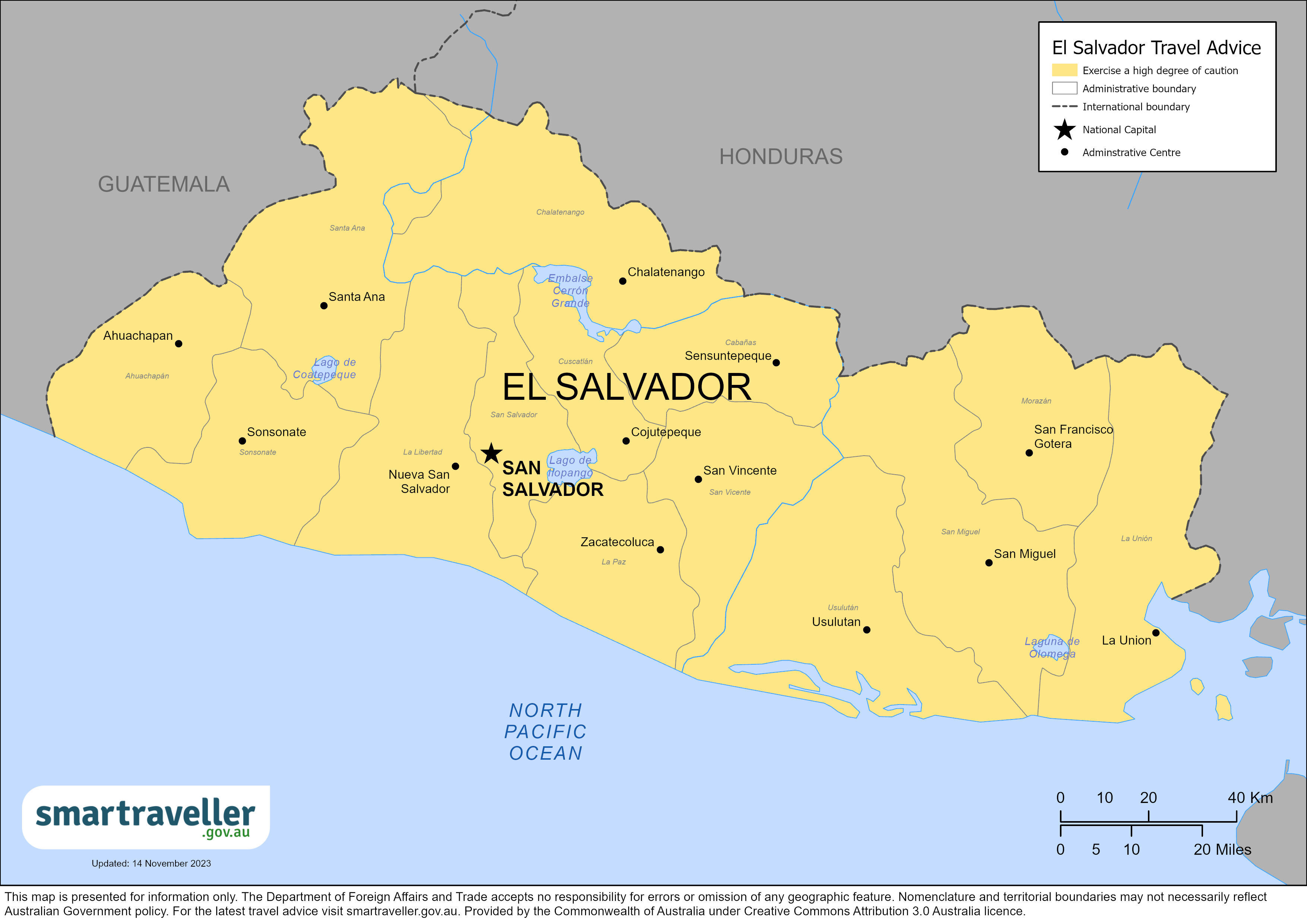
El Salvador (PDF 696.59 KB)
Americas (PDF 3.25 MB)
Local emergency contacts
Fire and rescue services, medical emergencies, advice levels.
Exercise a high degree of caution in El Salvador.
Exercise a high degree of caution in El Salvador due to the threat of violent crime .
- A State of Exception (graduated emergency measures are in place though it's not yet a State of Emergency) remains in effect in El Salvador. This is likely to continue for the foreseeable future. While the State of Exception has resulted in a reduction in the rate of violent and gang-related crime, there's still a risk of violent crime. Follow the advice of local authorities.
- The risk of violent crime increases at night. Don't travel alone or after dark. While crime rates have reduced, you may still be a victim of gang-related crime in El Salvador. Pay close attention to your surroundings. Ensure your accommodation is secure.
- Petty crime is common around transport hubs and tourist areas. Safeguard your belongings.
- Road travel outside the capital, San Salvador, can be dangerous. Criminals may target highways and the road to the international airport. Plan to arrive or depart the airport during the day. Keep vehicle doors and windows locked.
- Protests and public gatherings can turn violent. Don't take part in any political activities. Authorities may detain or deport you.
- The hurricane season is from June to November. Hurricanes can disrupt essential services. Know where your nearest shelter is.
- El Salvador has active volcanoes. Ask local authorities about safe areas to trek or climb.
Full travel advice: Safety
- Insect-borne illnesses are common, especially during the wet season. Chikungunya is widespread. Use insect repellent. Ensure your accommodation is insect-proof.
- Zika virus is widespread. If you're pregnant, discuss your travel plans with your doctor. Consider deferring non-essential travel.
- HIV/AIDS is a significant risk. Take precautions if you're taking part in high-risk activities.
- Other common infectious diseases include tuberculosis, hepatitis, typhoid and rabies. Drink boiled or bottled water. Avoid raw or undercooked food. If an animal bites or scratches you, get medical help immediately.
- Medical facilities are basic. If you're seriously ill or injured, you'll need medical evacuation to the US. Ensure your travel insurance covers this.
Full travel advice: Health
- Don't use or carry illegal drugs. Penalties for drug offences are severe. They include lengthy prison sentences in local jails.
- Take care when driving. If you injure or kill someone in a road accident, authorities may arrest or detain you for a local trial.
- It's illegal to photograph official buildings. Check with local authorities before taking photos.
- Dual nationals may have to complete national service. Contact the El Salvador embassy or consulate before you travel.
Full travel advice: Local laws
- Entry and exit conditions can change at short notice. Contact the Embassy of El Salvador in Canberra for up-to-date information on visas requirements.
- Landmines and unexploded remnants of war are common in rural areas of El Salvador. Chalatenango and Morazán districts are high-risk. Use only paved roads and well-travelled paths.
- El Salvador has declared a State of Exception, which could affect your travel. For your safety follow the advice of local authorities.
Full travel advice: Travel
Local contacts
- The Consular Services Charter details what the Australian Government can and can’t do to help you overseas.
- Australia has a consulate in San Salvador, headed by an honorary consul. This consulate provides limited assistance to Australians in El Salvador.
- You can get full consular help from the Australian Embassy in Mexico City .
- To stay up to date with local information, follow the embassy’s social media accounts.
Full travel advice: Local contacts
Full advice
Violent crime.
A State of Exception was declared in El Salvador on 30 March 2023 and will likely continue for the foreseeable future. While the State of Exception has resulted in a reduction in the rate of violent and gang-related crime, there's still a risk of violent crime. Follow the advice of local authorities.
Violent crime is common in El Salvador, including in the capital, San Salvador. Incidents include:
- armed robbery
- extortion and kidnapping
- sexual assault
Crime can involve guns and violent street gangs. The risk of violent crime increases at night.
While crime rates have reduced, gang-related crime may affect you in El Salvador.
Criminals on motorbikes commit robberies. You may be targeted if you display signs of wealth. Express kidnappings also occur, where criminals force you to withdraw funds from ATMs.
Police and law enforcement can't always respond to the high levels of crime.
To protect yourself from violent crime:
- pay close attention to your surroundings
- make sure your accommodation is secure
- avoid openly changing large amounts of money at border crossings
- don't travel alone or after dark
- don't use ATMs on the street
If you're attacked or robbed, don't resist. Armed criminals may injure or kill you.
If you're a victim of violent crime, especially rape, get immediate medical attention. El Salvador has a high HIV/AIDS infection risk.
Petty crime
Petty crime is common, particularly pickpocketing and bag-snatching. You're at risk:
- in bus stations
- in airports
- around tourist areas
- on public transport
Road-based crime
It can be dangerous to travel on roads outside San Salvador, especially at night. Criminals may target roads and highways, including the road to the international airport.
Criminals may follow you from the international airport to assault or rob you.
Violent attacks on vehicles, including buses, between El Salvador and Guatemala have been reported. The risk is greater on the Guatemalan side of the border.
Sometimes armed thieves target hikers in remote areas around volcanoes and national parks.
To protect yourself when travelling by road:
- plan to arrive or depart the international airport during the day
- keep car doors locked and windows up, even when moving
- keep valuables out of sight
Cyber security
You may be at risk of cyber-based threats during overseas travel to any country. Digital identity theft is a growing concern. Your devices and personal data can be compromised, especially if you’re connecting to Wi-Fi, using or connecting to shared or public computers, or to Bluetooth.
Social media can also be risky in destinations where there are social or political tensions, or laws that may seem unreasonable by Australian standards. Travellers have been arrested for things they have said on social media. Don't comment on local or political events on your social media.
More information:
Cyber security when travelling overseas
Civil unrest and political tension
Demonstrations and protests.
Public protests and events that draw large groups of people can turn violent.
Don't participate in political activities of any kind. Authorities may detain or deport you.
To protect yourself during periods of unrest:
- avoid protests, demonstrations and public gatherings
- monitor the media for potential unrest
- follow instructions from local authorities
Demonstrations and civil unrest
Terrorism is a threat worldwide.
Swimming safety
Strong rip tides and currents can make beaches dangerous.
There may not be lifeguards. Swimming conditions can become dangerous quickly.
Climate and natural disasters
El Salvador experiences natural disasters and severe weather , such as:
- severe storms
- earthquakes
- volcanic eruptions
To protect yourself in case of a natural disaster:
- secure your passport in a safe, waterproof location
- monitor local media and other sources
- follow the advice of local authorities
- keep in contact with your friends and family
- contact your tour operator or airline
- get local advice before visiting natural disaster-affected areas
To receive alerts on major disasters, register with the:
- Global Disaster Alert and Coordination System
- Caribbean Disaster Emergency Management Agency
The hurricane and rainy season is from June to November.
Landslides, mudslides and flooding can happen.
Severe weather may affect:
- access to ports
- road travel
The direction and strength of hurricanes can change suddenly.
If there's a hurricane or severe storm:
- you may get stuck in the area
- flights could be delayed or suspended
- available flights may fill quickly
- adequate shelter may not be available
- essential services may be disrupted
To protect yourself if a hurricane is approaching:
- know the evacuation plan for your hotel or cruise ship
- identify your local shelter
- closely monitor alerts and advice from authorities
To receive alerts on major disasters, register with the National Hurricane and Central Pacific Hurricane Center
El Salvador has active volcanoes. Before you trek or climb in an area with volcanic activity, ask local authorities for advice.
After a volcanic eruption, ash, dust and toxic fumes are a significant health risk. Take care if you have a respiratory condition.
To protect yourself if a volcano erupts:
- stay inside with the windows and doors shut
- place damp towels under doors and windows if ash is falling
- wear a disposable face mask if you go outside
- wear long clothing and goggles
- avoid contact with ash
- monitor advice from local authorities
Earthquakes and tsunamis
El Salvador experiences earthquakes . Tsunamis can also happen.
Get to know the earthquake safety measures for each place you visit.
Register with the Global Disaster Alert and Coordination System .
If you're near the coast, move immediately to high ground if advised by local authorities, or if you:
- feel a strong earthquake that makes it hard to stand up
- feel a weak, rolling earthquake that lasts a minute or more
- see a sudden rise or fall in sea level
- hear loud and unusual noises from the sea
Don't wait for official warnings, such as alarms or sirens. Once on high ground, monitor local media.
Travel insurance
Get comprehensive travel insurance before you leave.
Your policy needs to cover all overseas medical costs, including medical evacuation. The Australian Government won’t pay for these costs.
If you can't afford travel insurance, you can't afford to travel. This applies to everyone, no matter how healthy and fit you are.
If you're not insured, you may have to pay many thousands of dollars up-front for medical care.
- what activities and care your policy covers
- that your insurance covers you for the whole time you’ll be away
Physical and mental health
Consider your physical and mental health before you travel, especially if you have an existing medical condition.
See your doctor or travel clinic to:
- have a basic health check-up
- ask if your travel plans may affect your health
- plan any vaccinations you need
Do this at least 8 weeks before you leave.
If you have immediate concerns for your welfare or the welfare of another Australian, call the 24-hour Consular Emergency Centre on +61 2 6261 3305 or contact your nearest Australian Embassy, High Commission or Consulate to discuss counselling hotlines and services available in your location.
- General health advice
- Healthy holiday tips (Healthdirect Australia)
Not all medication available over the counter or by prescription in Australia is available in other countries. Some may even be considered illegal or a controlled substance, even if prescribed by an Australian doctor.
If you plan to take medication, check if it's legal in El Salvador. Take enough legal medication for your trip.
Carry a copy of your prescription or a letter from your doctor stating:
- what the medication is
- your required dosage
- that it's for personal use
Health risks
Insect-borne diseases.
Chikungunya is widespread in El Salvador.
During the wet season, you're more at risk of insect-borne illnesses, including:
- Chagas disease
- leishmaniasis
Zika virus is widespread in El Salvador.
Read the Australian Department of Health's Zika virus bulletin for advice on how to reduce your risk. If you're pregnant, the department recommends that you:
- discuss travel plans with your doctor
- consider deferring non-essential travel to affected areas
To protect yourself from disease:
- make sure your accommodation is insect-proof
- use insect repellent
- wear long, loose, light-coloured clothing
Get medical advice if you have a fever, muscle pain, rash or severe headache.
HIV/AIDS is a significant risk in El Salvador.
Take steps to protect yourself if you're at risk of infection.
Other health risks
Common waterborne, foodborne and other infectious diseases include:
- tuberculosis
- COVID-19
Infectious diseases
Medical care
Medical facilities.
Medical facilities are basic across El Salvador.
You may need to pay cash before doctors and hospitals will treat you, even in an emergency.
If you become seriously ill or injured, you'll need to be evacuated to the US. Medical evacuation and treatment in the US can be very expensive.
You're subject to all local laws and penalties, including those that may appear harsh by Australian standards. Research local laws before travelling.
If you're arrested or jailed, the Australian Government will do what it can to help you under our Consular Services Charter . But we can't get you out of trouble or out of jail.
Penalties for drug offences are severe and include lengthy prison sentences in local jails.
Carrying or using drugs
If you injure or kill someone in a road accident, authorities may arrest or detain you for a local trial.
It's illegal to take photographs of official buildings. Check with local authorities before taking photos.
Australian laws
Some Australian criminal laws still apply when you’re overseas. If you break these laws, you may face prosecution in Australia.
Staying within the law and respecting customs
Dual citizenship
El Salvador may require dual Australian-Salvadoran citizens to complete national service.
Contact the El Salvador embassy in Canberra before you travel.
Dual nationals
Visas and border measures
Every country or territory decides who can enter or leave through its borders. For specific information about the evidence you'll need to enter a foreign destination, check with the nearest embassy, consulate or immigration department of the destination you're entering.
You'll need to purchase a tourist card at the airport. This permits you to visit El Salvador for up to 90 days.
El Salvador is a member country to the Central American Border Control Agreement (CA-4), along with:
With a CA-4 tourist visa, you can travel freely by land between member countries within the 90-day period.
Your tourist card is dated from the first point of entry in any member country.
You can apply to extend the CA-4 visa before it expires at Centro de Gobierno in San Salvador. Call (+503) 2221 2111.
If you overstay the visa without an extension, you may be:
- forced to leave
- unable to enter other CA-4 member countries
If you're not a tourist or you plan to stay longer, you'll need a visa.
Entry and exit conditions can change. Contact the Embassy of El Salvador in Canberra for details about visas, currency, customs and quarantine rules.
- Embassies, consulates and permanent missions of El Salvador
Border measures
Confirm your travel and transit arrangements directly with your airline or travel agent.
If you're remaining in El Salvador:
- keep in contact with family and friends so they know you're safe and well
Other formalities
Make sure your passport is stamped when you enter El Salvador.
You must pay a departure tax to leave El Salvador. Your airline ticket may include the tax.
Some land border crossing points between El Salvador and neighbouring countries close at 6pm.
Travel via the United States
If you’re travelling through the US , ensure you meet all current US entry or transit requirements, even if you're only transiting.
Travel advice for the US
Travel via Canada
If you're travelling via Canada, you'll need an eTA (Electronic Travel Authorisation) for Canada.
Travel advice for Canada
Travel via Chile
If you’re travelling via Chile, ensure you meet all current entry or transit requirements.
- Travel advice for Chile
Yellow fever vaccination
Depending on where you've travelled, you may need a valid yellow fever vaccination certificate to enter El Salvador. Some airlines may want to see one when you leave.
Find out about returning to Australia after exposure to yellow fever .
Countries with a risk of yellow fever (PDF 151KB)
Travel with children
If you're travelling with children , you may need to show proof of your legal relationship. This could be as a parent, custodian or someone with access rights.
A child travelling on a Salvadoran passport without 1 or both parents must have written consent from the absent parents to leave the country. A Salvadoran notary must sign these documents.
Some countries won’t let you enter unless your passport is valid for 6 months after you plan to leave that country. This can apply even if you’re just transiting or stopping over.
Some foreign governments and airlines apply the rule inconsistently. Travellers can receive conflicting advice from different sources.
You can end up stranded if your passport is not valid for more than 6 months.
The Australian Government does not set these rules. Check your passport’s expiry date before you travel. If you’re not sure it’ll be valid for long enough, consider getting a new passport .
Lost or stolen passport
Your passport is a valuable document. It's attractive to people who may try to use your identity to commit crimes.
Some people may try to trick you into giving them your passport. Always keep it in a safe place.
If your passport is lost or stolen, tell the Australian Government as soon as possible:
- In Australia, contact the Australian Passport Information Service .
- If you're overseas, contact the nearest Australian embassy or consulate .
Passport with ‘X’ gender identifier
Although Australian passports comply with international standards for sex and gender, we can’t guarantee that a passport showing 'X' in the sex field will be accepted for entry or transit by another country. Contact the nearest embassy, high commission or consulate of your destination before you arrive at the border to confirm if authorities will accept passports with 'X' gender markers.
- LGBTI travellers
The official currency is the US Dollar ($US). Exchange for other currencies isn't available.
Bitcoin became legal tender in El Salvador in September 2021. However, not all vendors accept Bitcoin and it is in the early stages of adoption.
Credit cards aren't widely accepted outside major centres. ATMs aren't reliable.
Only change money and use ATMs in banks, hotels or shopping malls. See Safety
Local travel
Driving permit.
To drive in El Salvador, you need both:
- your valid Australian driver's licence
- a valid International Driving Permit (IDP)
You must get your IDP before leaving Australia.
Road travel
Stick to sealed roads and well-travelled paths.
Road safety and driving in El Salvador can be dangerous.
You're more likely to be killed in a motor vehicle accident in El Salvador than in Australia.
Driving standards can change across the country. Car insurance is essential.
If you're in an accident, call 911 for the national police or the fire brigade. Wait for the authorities to arrive before you leave.
Roads between tourist locations are usually in good or acceptable condition.
Locals sometimes steal manhole covers, leaving large holes in the road.
Roads are unsealed in isolated areas, so a 4WD vehicle is a good choice.
If you plan to drive in El Salvador:
- check your insurance cover
- learn local traffic laws and practices
Try not to drive at night. Lock doors, keep windows up and take safety precautions. See Safety
Unexploded weapons
In rural El Salvador, unmarked landmines and unexploded remnants of war are common. This risk increases in the Chalatenango and Morazán districts.
Adventure activities, tours and wildlife
Transport and adventure tour operators may not meet Australian safety standards, or maintain scuba diving equipment.
If you plan to do a tour or adventure activity :
- check if your travel insurance policy covers it
- use registered operators
- ask about and insist on minimum safety requirements
- always use available safety gear, such as life jackets or seatbelts
If proper safety equipment isn't available, use another provider.
Motorcycles
Check your insurance before using a motorcycle, quad bike or similar vehicle.
Always wear a helmet.
Use registered taxis and limousines.
Arrange transport through your hotel, and book in advance if travelling at night.
Public transport
Public transport in El Salvador is often overcrowded and poorly maintained. This includes inter-city buses.
Security around bus stops is poor, and robberies are common.
Avoid using public transport.
DFAT doesn’t provide information on the safety of individual commercial airlines or flight paths.
Check El Salvador's air safety profile with the Aviation Safety Network.
Emergencies
Depending on what you need, contact your:
- family and friends
- travel agent
- insurance provider
POLITUR, the tourist police, can help you. They regularly patrol main tourist areas.
Always get a police report when you report a crime.
Your insurer should have a 24-hour emergency number.
Consular contacts
Read the Consular Services Charter for what the Australian Government can and can't do to help you overseas.
Australia has a consulate in San Salvador, headed by an Honorary Consul. The consulate provides limited consular assistance to Australians in El Salvador. The Consulate can conduct passport interviews and provide provisional travel documents for emergency travel to the nearest Australian embassy. The Consulate can’t issue Australian passports. You can get full consular assistance from the Australian Embassy in Mexico City.
Australian Consulate, San Salvador
12 Calle Poniente 2028 Colonia Flor Blanca San Salvador, El Salvador Phone: (+503) 2298 9447 Email: [email protected]
Australian Embassy, Mexico City
Ruben Dario 55, (Polanco) Colonia Bosque de Chapultepec 11580 Mexico CDMX MEXICO Phone: +52 55 1101 2200 Email: [email protected]
Website: mexico.embassy.gov.au
Facebook: Australian Embassy Mexico
Twitter: AusEmbMex
Check the Embassy website for details about opening hours and any temporary closures.
24-hour Consular Emergency Centre
In a consular emergency, if you can't contact an embassy, call the 24-hour Consular Emergency Centre on:
- +61 2 6261 3305 from overseas
- 1300 555 135 in Australia

Travelling to El Salvador?
Sign up to get the latest travel advice updates..
Be the first to know official government advice when travelling.

El Salvador Travel Guide
Last Updated: September 1, 2023
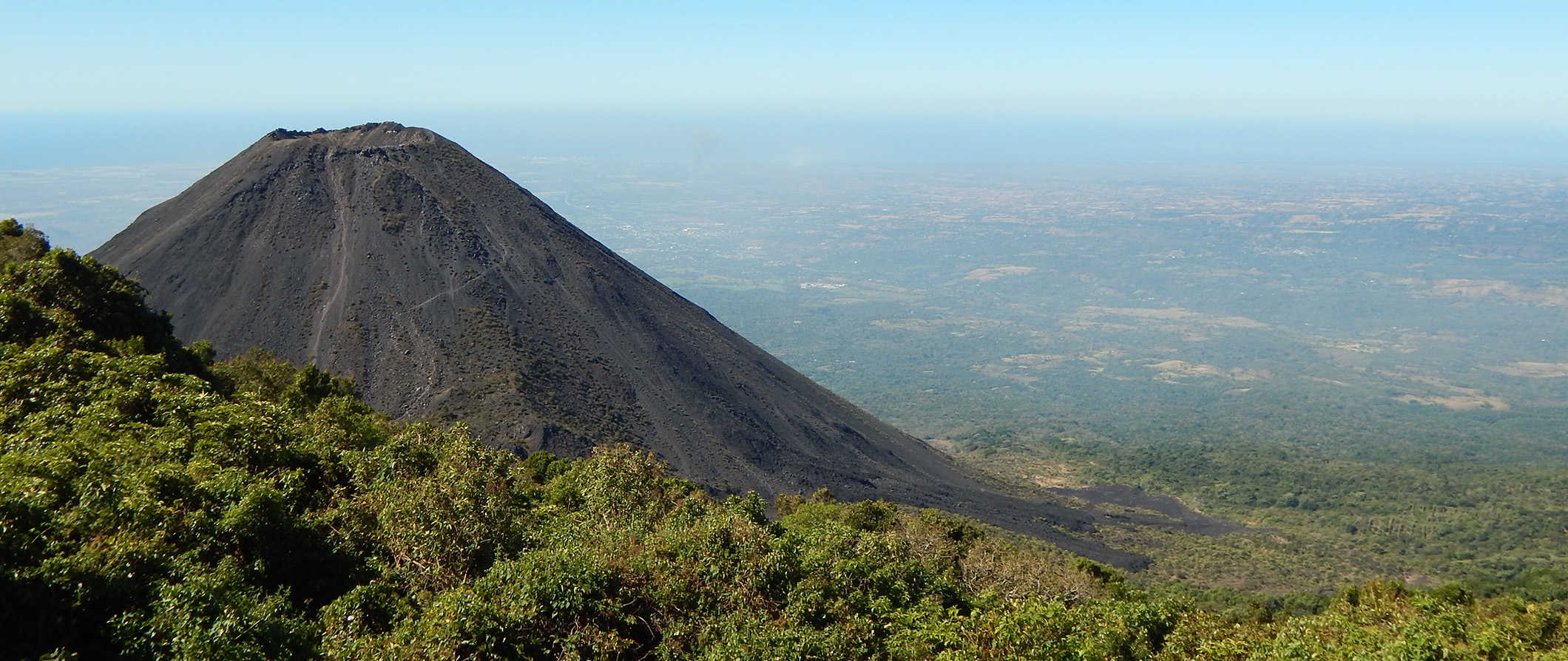
El Salvador is the smallest and most densely populated country in Central America . Somewhat bypassed on the tourist trail (it’s tucked away from the main route people take through Central America), this country is filled with natural beauty, forests, beaches, and even the opportunity to view some archaeological sites.
While the country has had a turbulent past (it was ruled by a dictator from 1931-1979 and then experienced a civil war from 1980-1992), El Salvador has slowly been coming into its own and is now a popular spot for intrepid backpackers looking to get off the beaten path.
El Salvador is the perfect place to experience the great outdoors without the crowds as you make your way around Central America. Everyone is super friendly and generally happy to have visitors and the crowds here are much smaller than you’ll find in neighboring Costa Rica and Panama .
The prices are lower too.
This travel guide to El Salvador can help you plan your trip, save money, stay safe, and make the more of your time in this underrated destination!
Table of Contents
- Things to See and Do
- Typical Costs
- Suggested Budget
- Money-Saving Tips
- Where to Stay
- How to Get Around
- How to Stay Safe
- Best Places to Book Your Trip
- Related Blogs on El Salvador
Top 5 Things to See and Do in El Salvador
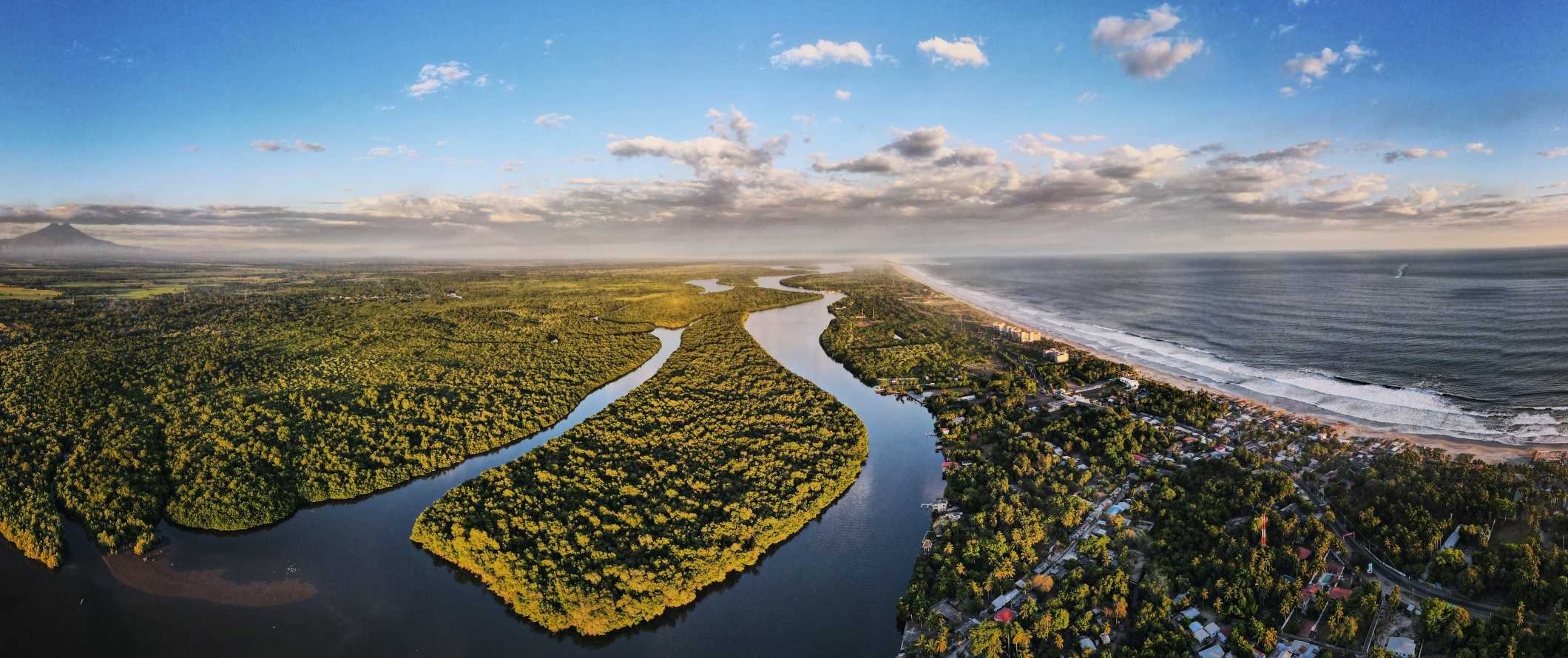
1. Visit the Montecristo Cloud Forest
This cloud forest is home to diverse flora and fauna, including ferns, orchids, mosses, spider monkeys, and anteaters. The area is incredibly biodiverse and is believed to contain 7% of the world’s species. Within the cloud forest, you can explore Trifinio Fraternity Biosphere Reserve, established in 1987, which was the first protected area in El Salvador. Hike to the highest point, El Trifinio, with an altitude of 2,400 meters (7,874 feet), where the borders of El Salvador, Honduras , and Guatemala converge. One of the most popular attractions in the cloud forest is the Garden of the Hundred Years which contains over 100 different types of orchids. There’s a limit to how many people can visit the park each day, so it’s best to arrive early.
2. Hang out in El Tunco
One hour outside of San Salvador is this backpacker’s paradise. The tiny town is packed with hostels and is a popular place for relaxing beach vacations and lively party weekends. The name of the town translates to ‘the pig’ and it’s named after the landmark just offshore — a huge rock that resembles a pig. Cheap hostels, cheap drinks, a great party scene, and world-class surfing await in this beachside town. Besides the nightlife, El Tunco is known for its beautiful black sand beaches and gorgeous sunsets.

3. Go to Puerta del Diablo
Also known as the Devil’s Door, this rock formation serves as a lookout, offering sprawling views over San Salvador, the Pacific Ocean, and the surrounding mountains. Nowadays, it’s a beautiful place to visit and a popular tourist attraction, but its history is shrouded in darkness. During the civil war, it was a site where prisoners were held and tortured. Once a single rock, the formation has now separated into three boulders. The climb to the overlook is steep, with an ascent of 1,250 meters (4,101 feet). Take the bus from San Salvador and then it’s a quick walk to the boulders.
4. See the Cihuatán Ruins
Cihuatan was founded after the collapse of the Mayans around 900 CE and quickly became a regional capital. It lasted for 100 years before unknown invaders burned the city in the 10th century. It’s located near the modern-day town of Aguilares, about 30 kilometers (19 miles) outside of San Salvador. The Pre-Columbian archeological site covers over 180 acres and includes pyramids, Mesoamerican ball courts, and religious sites which were first excavated in the 1970s. By the 1980s, over 900 structures had been uncovered. You can visit the ruins and the museum explaining the history of the area as a day trip from El Salvador. Admission is $3 USD.
5. Visit La Libertad
La Libertad is a popular beach town alternative to El Tunco, with Punta Roca offering huge waves for surfing. The port city was established in 1770 and is a tropical paradise, with beautiful sandy beaches, palm trees, and opportunities to surf, sunbathe, and snorkel or scuba dive. Nearby you can explore Walter Thilo Deininger National Park which is rich in wildlife. If you want a real taste of the local life, visit the busy daily fish market on the waterfront. Otherwise, this place is all about relaxing, enjoying reggae music, and soaking up the sun.
Other Things to See and Do in El Salvador
1. hike the volcanoes.
El Salvador has its share of volcanoes to explore, and the best place to see several of them is Cerro Verde National Park. This park is home to Cerro Verde, Izalco, and Ilamatepec. The trails all allow you to get up close to the volcanoes, including a walk around the Cerro Verde crater, where you’ll find a cloud forest full of tropical birds and plant life. Ilamatepec is the highest point in the park, at 2,381 meters (7,811 feet) at the summit. There are lots of tours from San Salvador starting from about $85 USD, or you can show up and just pay the $3 USD entrance fee.
2. Visit Joya de Cerén
Joya de Cerén is a UNESCO World Heritage Site that tells a story about the everyday lives of the Mayans. Once a small Mayan farming settlement, the town was buried under volcanic ash in 595 BCE when the Laguna Caldera Volcano erupted. The site includes a Temazcal (sauna), and other important buildings like storehouses, a kitchen, and a religious building meant for communal events. There’s also an excellent preserved shaman’s home and a collection of agricultural tools. This site is the Mayan version of Pompeii . It’s $7 USD to visit.
3. Get cultural in San Salvador
Although most people don’t spend a lot of time in San Salvador, there are a few highlights to see. Most of the city’s activity centers around the Plaza el Salvador del Mundo, where you’ll see the iconic Savior of the World statue (with Jesus standing on a globe). Walk around downtown, try some pupusas (delicious El Salvadorian flatbread stuffed with cheese, pork, squash, or refried beans), and visit the domed Metropolitan Cathedral which is filled with colorful stained glass. At the National Palace, peruse the old government rooms and the courtyards, and if you want to do some souvenir shopping, head to the National Handicrafts market for some local artwork. (Note: Sometimes downtown San Salvador experiences gang violence. Read our safety section to learn how to keep yourself safe.)
4. Go diving
El Salvador has some of the best diving in Central America. The warm waters of Los Cóbanos (a resort beach area on the westside of El Salvador) contain reefs, underwater rock formations, and even shipwrecks. If you’re a beginner, you can learn to dive in volcanic crater lakes like Coatepeque and Ilopango, where the freshwater provides mild conditions for anyone who isn’t ready to tackle the open waters. There’s not a lot of marine life to see in the lakes, but visibility is clear and the azure waters of the lakes are stunning. Expect to pay around $85 USD for a two-dive trip and around $415 USD for an Open Water certification course.
5. Visit El Imposible National Park
This is the largest park in El Salvador and is named for its deep gorge. It’s part of the Apaneca Ilamatepec mountain range, with mangrove forests and a total of eight rivers, as well as plenty of waterfalls. You might see pumas, anteaters, antelopes, and even wild boars while here. Due to the delicate nature of the park, you’ll need to have a guide to explore it (you’re not allowed to hike alone). It’s $6 USD for the park entrance fee, and then you can request a guide (it’s usually about $10 USD for a group). You can also do a day trip from San Salvador with Impossible Tours for $130 USD.
6. Spend a day at Los Chorros
Los Chorros is a nature park composed of a series of natural swimming pools that cascade from overhanging volcanic cliffs, set against a backdrop of ferns, flowers, and moss. It’s 20 minutes outside of San Salvador. For only $3 USD to visit, it’s one of the most scenic ways to beat the heat!
7. Shop at La Gran Via
Located in the heart of San Salvador, this is an outdoor shopping center filled with restaurants, movie theaters, music, bars, live shows, and more. This is a nice place for an afternoon out, and at night it’s where the locals come for drinks and clubbing.
8. Tour the Museum of Popular Art
This museum is home to some of the country’s most valuable Salvadoran works, including works from over 177 artists such as paintings, sketch drawings, and sculptures from Rosa Mena Valenzuela and Salarrué (the most well-known writer and painter in El Salvador). It also has a huge showcase of miniature pottery, wood carvings, weaving, and jewelry. It’s a quirky, family-friendly place to visit. There are often craft-making sessions that you’re invited to join. Admission is only $1.50 USD.
9. Wander through colonial Suchitoto
Suchitoto (“Suchi”) is a small colonial town located on Lake Suchitlan in the mountainous northern region. Well-known around the country for its artistic community, most weekends draw hordes of Salvadorans from San Salvador (and other neighboring towns) looking to visit the many galleries and markets. There are easy looped walking trails all around Suchi that can take you to the lake, various waterfalls, and even caves to explore. Just find a trailhead and start walking!
10. Hang out on the Coatepeque Caldera
If you’re not learning how to dive here, spend at least a day on the caldera just enjoying the still, bright blue lake and its quiet village of El Congo in western El Salvador. You can hire a boat to take you around, go for a swim, or visit some of the village’s small restaurants.
11. Take the Ruta de Las Flores
The “Route of the Flowers” is a popular day trip from San Salvador, where you can visit small colonial towns and villages as well as coffee plantations. Pause in colorful towns like Nahuizalco, Apaneca, Juayua, and Ataco, where the main squares are busy with cafes and markets, and the buildings are covered in murals. Apaneca and Ataco are home to some of the best-known coffee plantations, like the El Carmen Estate, and if you’re visiting between November and February you’ll see the coffee beans flowering. You can do the route on your own, or take a tour from the city for around $90 USD.
El Salvador Travel Costs
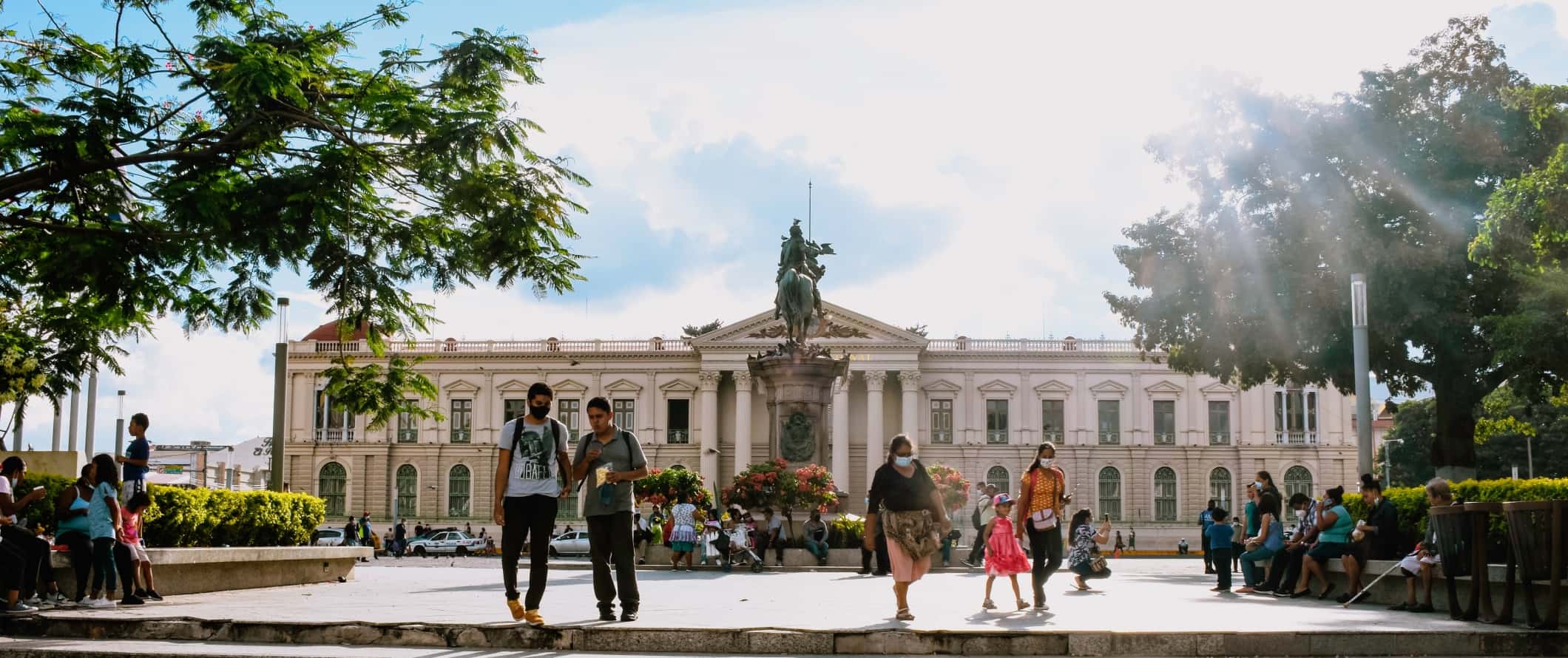
Accommodation – During peak season, a bed in an 8-10-bed dorm costs $10-15 USD. Free Wi-Fi is standard and many hostels also include free breakfast. Private rooms with an ensuite bathroom cost around $25 USD per night (there is no real difference in prices during the high or low season).
Nightly rates for a budget two-star hotel room start at $40 USD. You’ll pay about $60 USD for a place on the beach, or a place with a pool
There are lots of Airbnb options in El Salvador. Private rooms start around $15-20 USD though they average double (or even triple) that. An entire home or apartment starts around $30 USD though prices usually average closer to $75-100 USD.
Food – Like its neighborhoods, the cuisine here is a mix of indigenous traditional foods with influence from the Spanish conquest. Pork, seafood, and corn are major staples and can be found at most meals. Pupusa is the national dish, a thick flatbread stuffed with cheese, chicharrón (pork), and refried beans. Cured pork, deep-fried cassava, tamales, and meat soups are other common meals.
Overall, food in El Salvador is very affordable. Like most Central American countries, you can find big plates of rice and beans for $3-5 USD. Breakfasts of eggs and plantains are also $3-5 USD. Fill up on the pupusas for less than $1 USD each.
Mid-range meals of pizza or a fried fish dinner are about $8-10 USD. A vegetarian meal is about $5-8 USD. A burger and fries is $10 USD. A beer to go with it will only cost between $1.50-3 USD.
There are some “high-end” dining spots around El Salvador, but most dining is pretty casual. You can find seafood dishes like ceviche between $15-19 USD, while a nice steak dinner ranges from $16-24 USD. Pasta dishes are between $12-15 USD.
Overall, the food is very cheap here, so take advantage of it when you can! If you do plan on cooking your own meals expect to spend around $25-35 USD per week, depending on your diet.
However, that said, given how few places have kitchen facilities, I wouldn’t buy a lot of groceries if I was here. I’d just get the cheap local eats!
Backpacking El Salvador Suggested Budgets
If you’re backpacking El Salvador, you’ll spend as little as $35 USD per day. This budget covers a hostel dorm, cooking some meals and eating cheap street food, limiting your drinking, taking the bus to get around, and doing most cheap and free activities like swimming and hiking.
A mid-range budget of about $90 USD covers staying in a private Airbnb room, taking the occasional taxi, enjoying a few beers at the bar, and eating out for all your meals. You’ll also be able to visit more museums, ruins, and parks or do some guided hikes.
On a “luxury” budget of $245 USD or more per day, you can stay in a hotel, eat any meals you want, enjoy as many drinks as you want, take taxis to get around, and do lots of tours. This amount of money goes a long way in a country like this and you’ll want for absolutely nothing if you’re coming here for luxury. The country is your oyster if you’re spending this or more!
You can use the chart below to get some idea of how much you need to budget daily, depending on your travel style. Keep in mind these are daily averages — some days you’ll spend more, some days you’ll spend less (you might spend less every day). We just want to give you a general idea of how to make your budget. Prices are in USD.
El Salvador Travel Guide: Money-Saving Tips
El Salvador is one of the cheapest countries in Central America, so you’ll find it easy to save money here without much effort. Regardless, here are some ways to save money during your visit:
- Snack on fruit – Fruit in Central America is super affordable. You can pick up a bag of mangos for around $0.50 USD at any roadside stall or market vendor, and even smoothies will cost less than $3 USD. Eat healthily and save money!
- Show up without reservations – It’s easy to just show up in a town like La Libertad or El Tunco and just barter for a room. If there’s availability, you could get your room for a fraction of what you’d be paying by booking online. A lot of accommodations don’t even have online reservation systems, so showing up and booking a room is the only way to do it in some cases.
- Go camping – While hostels are pretty cheap, you can camp at many of them for half the cost (for as little as $6 USD per night). Bring your gear and sleep under the stars!
- Stay with a local – Couchsurfing connects you with locals who will not only give you a free place to stay but also serve as a local tour guide and introduce you to the cool stuff only locals know about in town. There are not a ton of hosts here, however, so be sure to send your requests early.
Where to Stay in El Salvador
Hostels in El Salvador are affordable, fun, and safe. Here are my suggested places to stay in the country:
- Hostal Cumbres del Volcan Flor Blanca (San Salvador)
- Hostel Casa Verde (Santa Ana)
- Hostal Punta El Zonte (La Libertad)
How to Get Around El Salvador
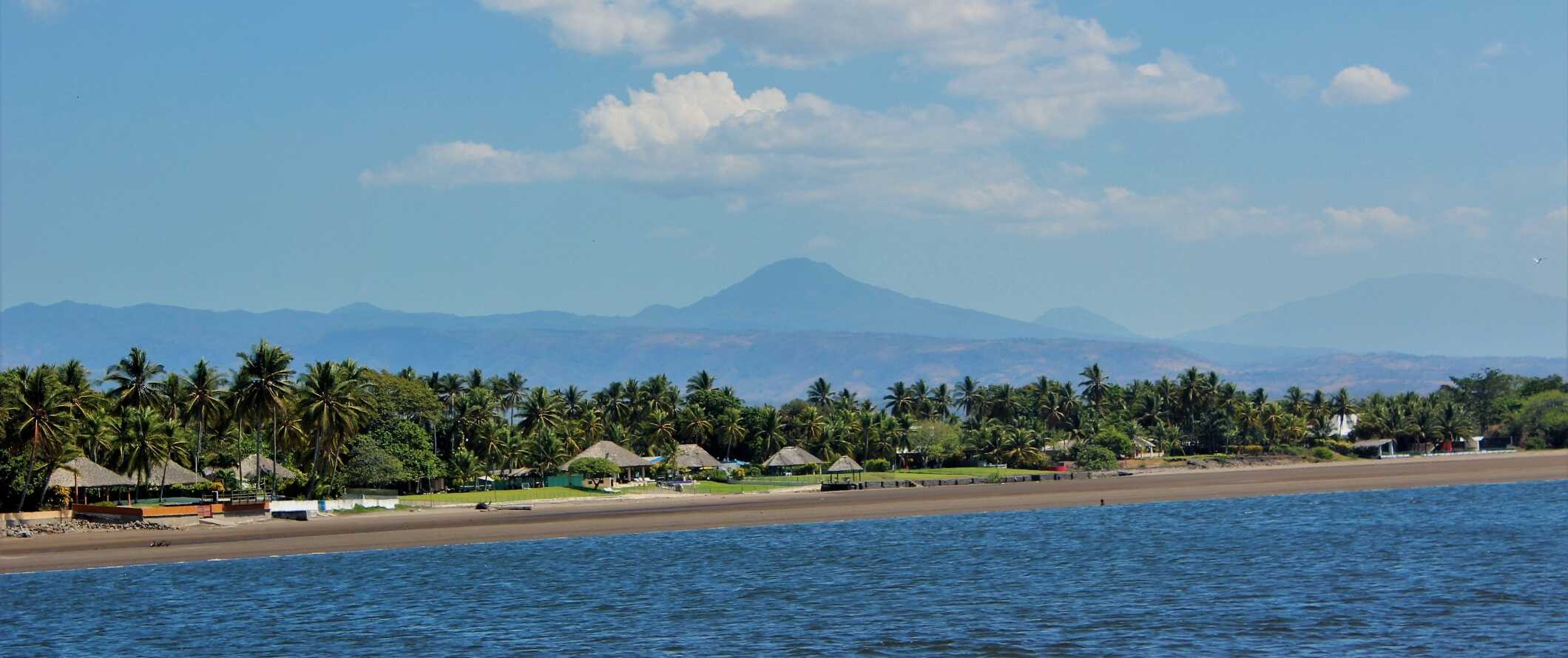
Bus – Buses are the primary way to get around El Salvador’s cities as well as the country as a whole. You can get just about anywhere in one of El Salvador’s brightly painted school buses. Cities and towns often have designated bus depots with rides that cost less than $0.50 USD. You can easily move between towns for about $2-5 USD (it’s $2 USD to travel between San Salvador and Both La Libertad and El Tunco). San Salvador to Suchitoto is $1 USD. Fares may go up by 25% on the weekends due to more traffic.
Minivans – In most touristy areas in El Salvador you’ll find small tour offices that sell seats on minivans or minibusses. They’ll take you just about anywhere you need to go in the country (and onward into neighboring countries). These minivans cost more than the regular buses, but you still shouldn’t have to pay more than $10 USD wherever you’re going. You can also barter prices in this case, and if you can round up people from your hostel/accommodations to book as a group, you’ll save even more money.
Taxi – Taxis are easy to come by in El Salvador, although in smaller towns they take the form of tuk-tuks. Most are unmetered, so make sure you negotiate your price beforehand. Tuk-tuks are the cheapest option, and you can get a few blocks for less than $1 USD. Ask your hotel/hostel staff for price estimates before you head out so you know you’re not getting ripped off.
Car rental – Rentals start at $25 USD per day. Driving here is relatively safe compared to other Central American countries as the roads are much better maintained. You need to be 21 in order to rent a car here. An IDP (International Driving Permit) is also required.
For the best car rental prices, use Discover Cars .
When to Go to El Salvador
Like the rest of Central America, El Salvador’s dry season is between November and April, while the rainy season is between May and October.
The dry season is peak season, with travelers escaping the cold temperatures up north. Daily highs average about 30°C (86°F) here, and it rarely ever dips below 10°C (50°F). This is definitely the best time to visit.
Prices don’t fluctuate much in the off-season, so you have no real reason to visit during the rainy season. On the other hand, April to October is the best time for serious surfers.
How to Stay Safe in El Salvador
Unfortunately, El Salvador has a high rate of gang violence. Although it’s rarely targeted at foreigners, you should avoid certain areas. Most of that crime takes place in San Salvador, so avoid parts of Soyapango, Apopoa, and Mejicanos at all costs. Also, avoid the area around the Tica bus station in San Salvador, as there are sometimes attacks there against tourists. You’re not likely to spend a lot of time in these neighborhoods, however, and the more touristy places are patrolled by policemen.
La Libertad, Soyapango, and Usulutan also have some gang activity. Like San Salvador, police heavily patrol touristy areas.
In any destination, don’t be out on the street (or beach) alone after dark. Avoid traveling at night in general, as hijackings or muggings are known to happen.
You might encounter petty crimes, like theft, especially on public transportation. Do not flash any of your valuables around, or keep them at all. Credit card skimming is also a problem here, so try to use only ATMs at shopping malls, hotels, or banks.
You can more about common travel scams to avoid when you travel.
Solo female travelers should be cautious here. In addition to the tips above, the standard precautions apply (never leave your drink unattended at the bar, never walk home alone intoxicated, etc.).
If you experience an emergency, dial 911 for assistance.
The most important piece of advice I can offer is to purchase good travel insurance. Travel insurance will protect you against illness, injury, theft, and cancellations. It’s comprehensive protection in case anything goes wrong. I never go on a trip without it as I’ve had to use it many times in the past. You can use the widget below to find the policy right for you:
El Salvador Travel Guide: The Best Booking Resources
These are my favorite companies to use when I travel. They consistently have the best deals, offer world-class customer service and great value, and overall, are better than their competitors. They are the companies I use the most and are always the starting point in my search for travel deals.
- Skyscanner – Skyscanner is my favorite flight search engine. They search small websites and budget airlines that larger search sites tend to miss. They are hands down the number one place to start.
- Hostelworld – This is the best hostel accommodation site out there with the largest inventory, best search interface, and widest availability.
- Booking.com – The best all around booking site that constantly provides the cheapest and lowest rates. They have the widest selection of budget accommodation. In all my tests, they’ve always had the cheapest rates out of all the booking websites.
- Get Your Guide – Get Your Guide is a huge online marketplace for tours and excursions. They have tons of tour options available in cities all around the world, including everything from cooking classes, walking tours, street art lessons, and more!
- SafetyWing – Safety Wing offers convenient and affordable plans tailored to digital nomads and long-term travelers. They have cheap monthly plans, great customer service, and an easy-to-use claims process that makes it perfect for those on the road.
- LifeStraw – My go-to company for reusable water bottles with built-in filters so you can ensure your drinking water is always clean and safe.
- Unbound Merino – They make lightweight, durable, easy-to-clean travel clothing.
- Top Travel Credit Cards – Points are the best way to cut down travel expenses. Here’s my favorite point earning credit cards so you can get free travel!
El Salvador Travel Guide: Related Articles
Want more info? Check out all the articles I’ve written on Central America travel and continue planning your trip:
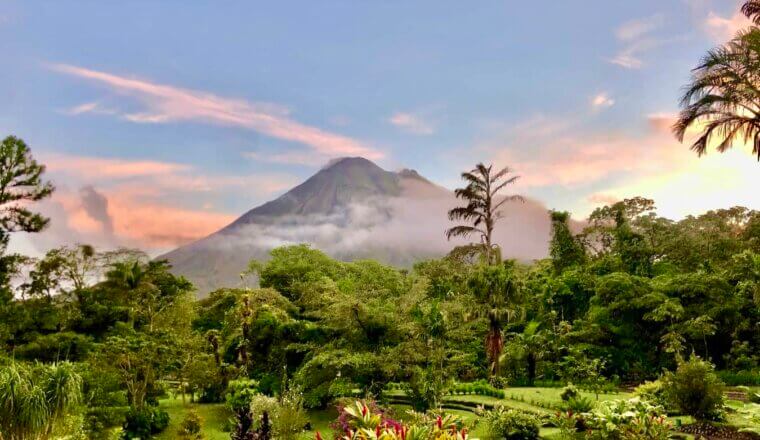
Do You Need Travel Insurance for Costa Rica?
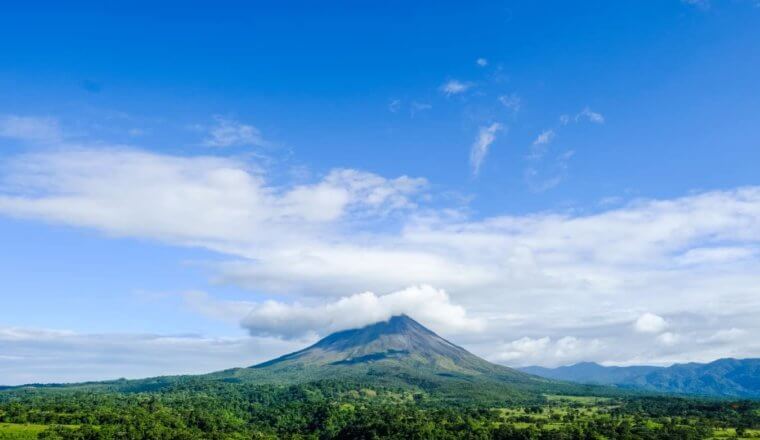
The Best Tour Companies in Costa Rica
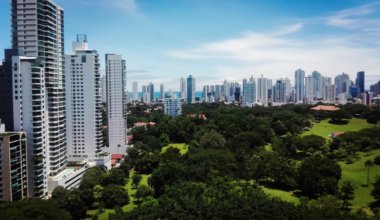
The 6 Best Hostels in Panama City, Panama
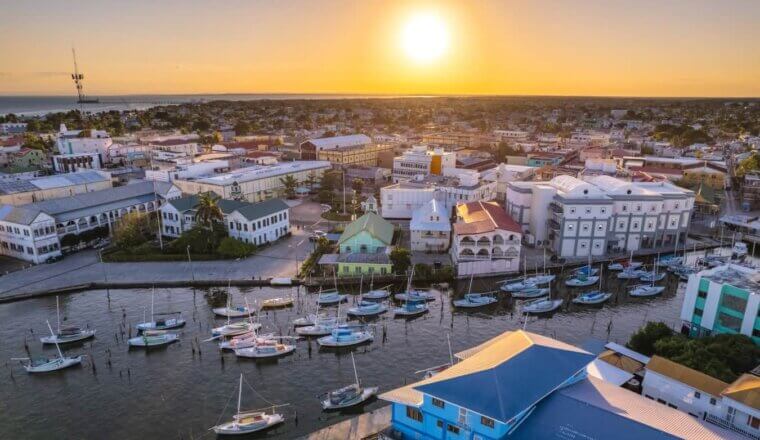
Is Belize Safe to Visit?
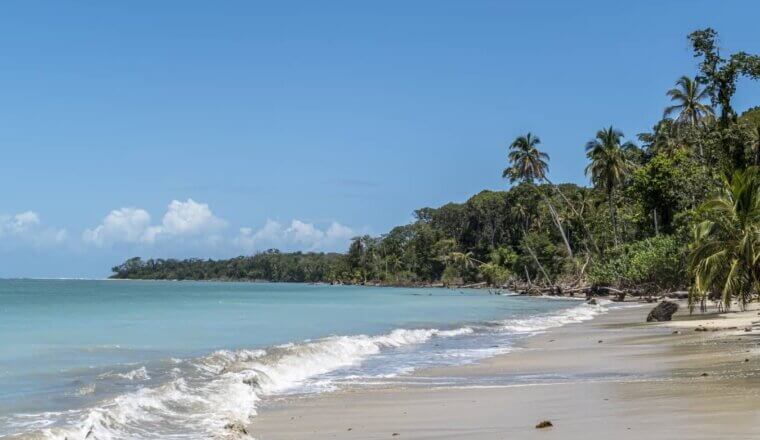
Is Central America Safe to Visit?
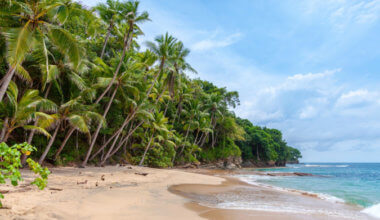
How to Get Around Central America on a Budget
Get your free travel starter kit.
Enter your email and get planning cheatsheets including a step by step checklist, packing list, tips cheat sheet, and more so you can plan like a pro!

- Where To Stay
- Transportation
- Booking Resources
- Related Blogs
22 things you should know before traveling to El Salvador

Jan 30, 2024 • 9 min read
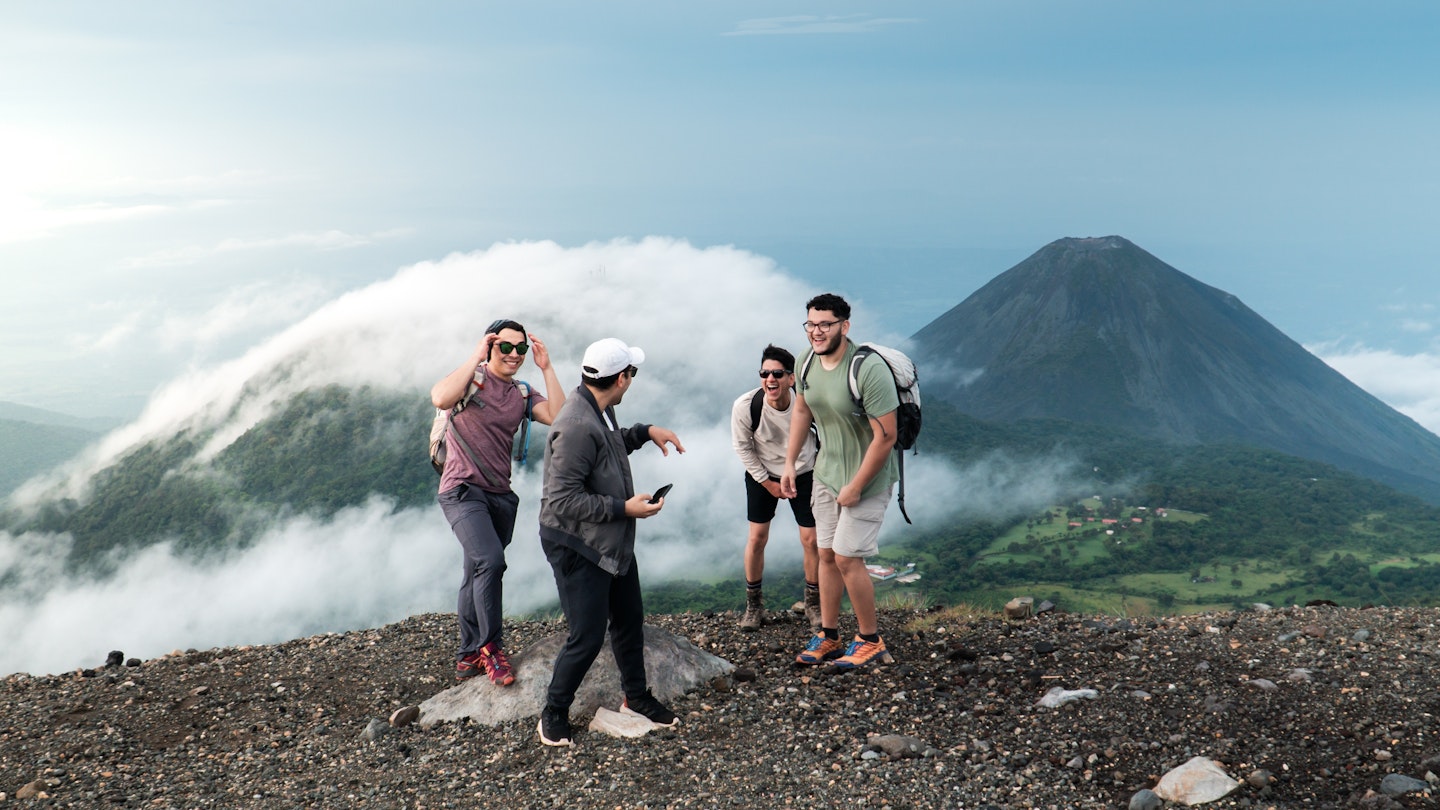
Incredible forests and volcanoes dot the small but might country of El Salvador © Kikerodry / Shutterstock
With 200 miles of coastline, more than 170 volcanoes, multiple archeological sites with Maya ruins and a rich coffee- and cacao-farming tradition, El Salvador is a wonderland for surfing , adventuring and relaxing.
Unfortunately, decades of instability and violence chipped away at the country’s reputation abroad. Yet recent significant strides have set the stage for a new era of tourism – including cracking down on crime, improving roads and investing in new hotels and flight routes – and earned this tropical destination another look .
You can absolutely have a fantastic time in El Salvador, and we recommend you discover it for yourself. What will make your trip even better? The planning tips and precautions below.
Here’s all you need to know before you set off for El Salvador.
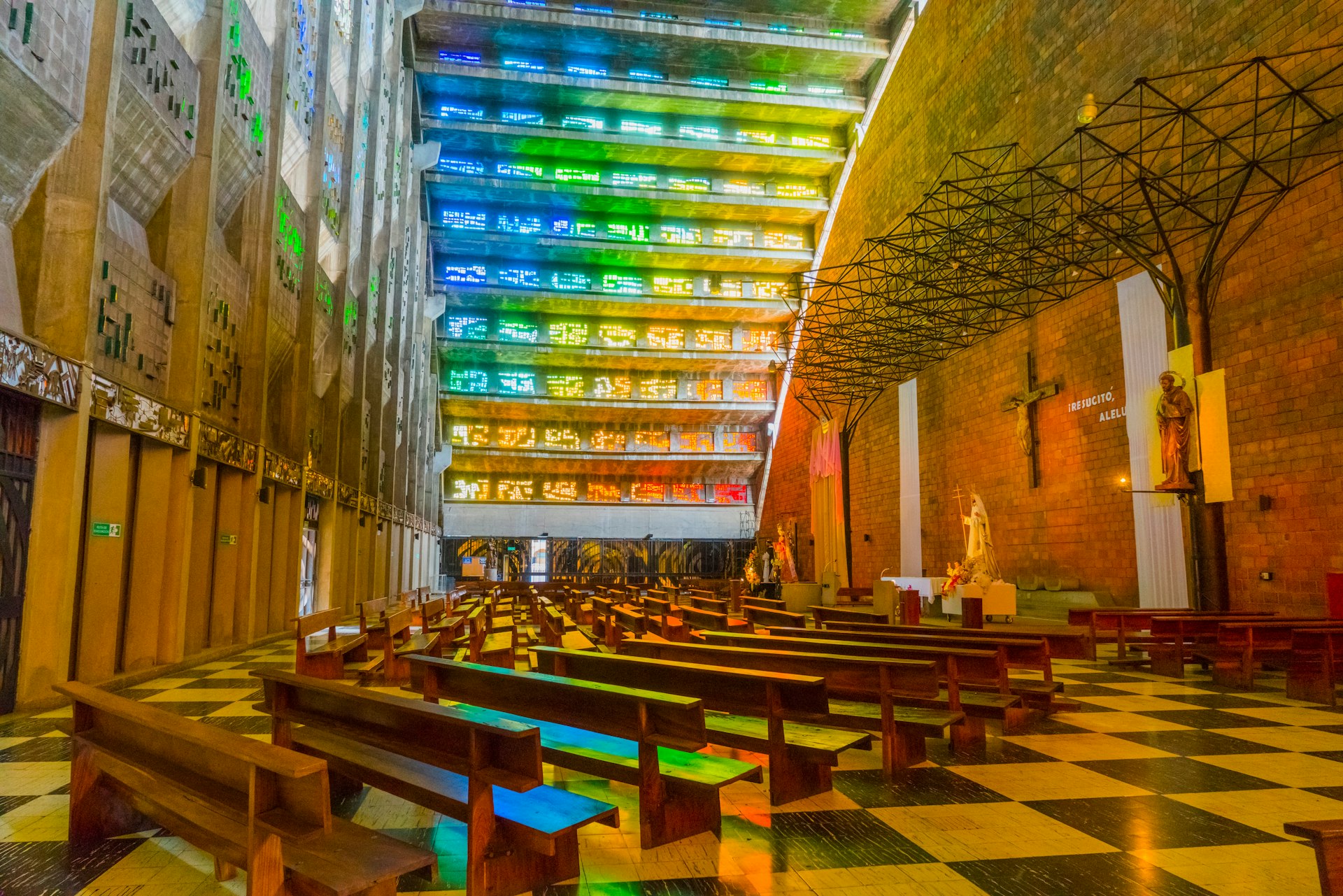
Planning your trip to El Salvador
1. enjoy both a city and beach vacation.
El Salvador is about 8000 sq miles (21,000 sq km) – roughly the same size as fellow Central American country Belize – yet highly ecologically diverse .
This combination makes a five-night trip encompassing the capital city of San Salvador and the Pacific coast (about a 45-minute drive away) entirely feasible.
Fill your time in San Salvador with architectural and cultural visits to the National Palace , Art Museum of El Salvador and the extraordinary El Rosario church . On the coast, the fishing port of La Libertad has become popular for its surfing and beachfront hotels.
2. But don’t miss out on volcanoes, forests and ruins
A national park with three volcanoes ( El Boquerón ), a forest reserve that’s a former battleground (Cinquera), a cobblestoned town (Suchitoto) and “the Pompeii of America” ( Joya de Cerén ) might get you to extend your trip to El Salvador to a whole week…or longer.
While El Boquerón is only a half hour from San Salvador and doable as a day trip, Suchitoto is a good 90-minute drive in the opposite direction of the coast. It’s a cobblestoned town with colonial architecture and an excellent spot to spend a night or two .
3. Brace for higher prices during peak periods
Domestic travel spikes during the winter holidays, through the New Year, Holy Week (Easter) and the first week of August. If you visit during these times, you may pay a premium for hotels, plus experience bigger crowds at museums and parks.
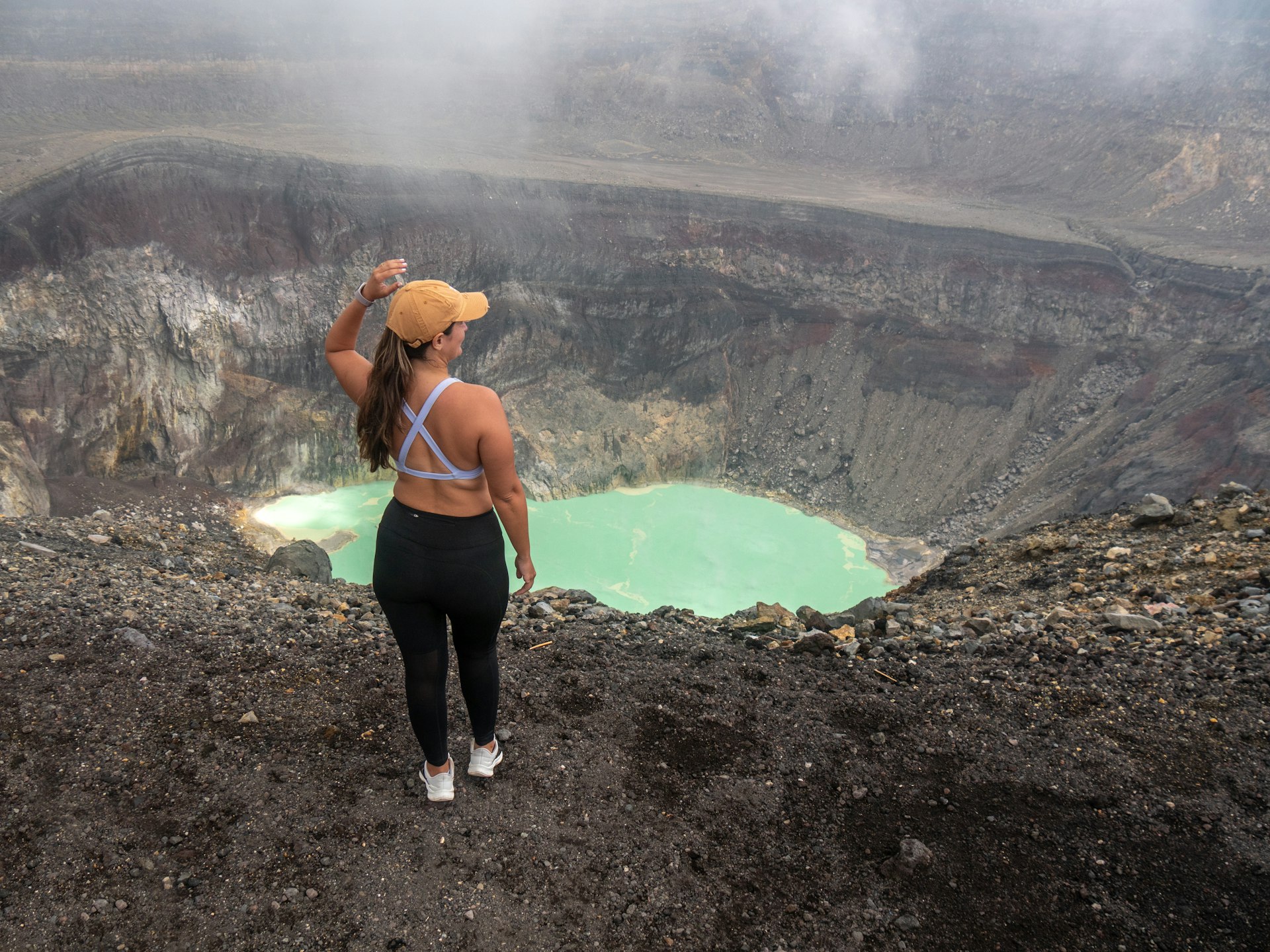
4. Plan around the rainy season
Your best bet for clear skies and mud-free hiking is a visit during the dry season, from November through April. If you decide to throw caution to the wind (and drizzle) by visiting during the rainy season (May to October), pack a rain jacket, quick-drying layers and extra pairs of socks.
It’s also important to note that not all roads are paved in El Salvador. Heavy rains can cause flooding, leading to road closures and longer drive times.
5. Skip the currency exchange
If your home currency is the US dollar, there’s no need to swap money. USD has been an official currency of El Salvador since 2001.
But it’s a good idea to bring some small bills with you. Most businesses will accept a $20 bill, but 50s and 100s can be harder to break. ATMs are widely available in commercial centers, and most will let you choose English for your transaction.
In a surprising move, El Salvador added a second national currency in 2021: Bitcoin. Though the government requires all businesses to accept digital currency, only about 20% do, so you’ll most likely be dealing in dollars.
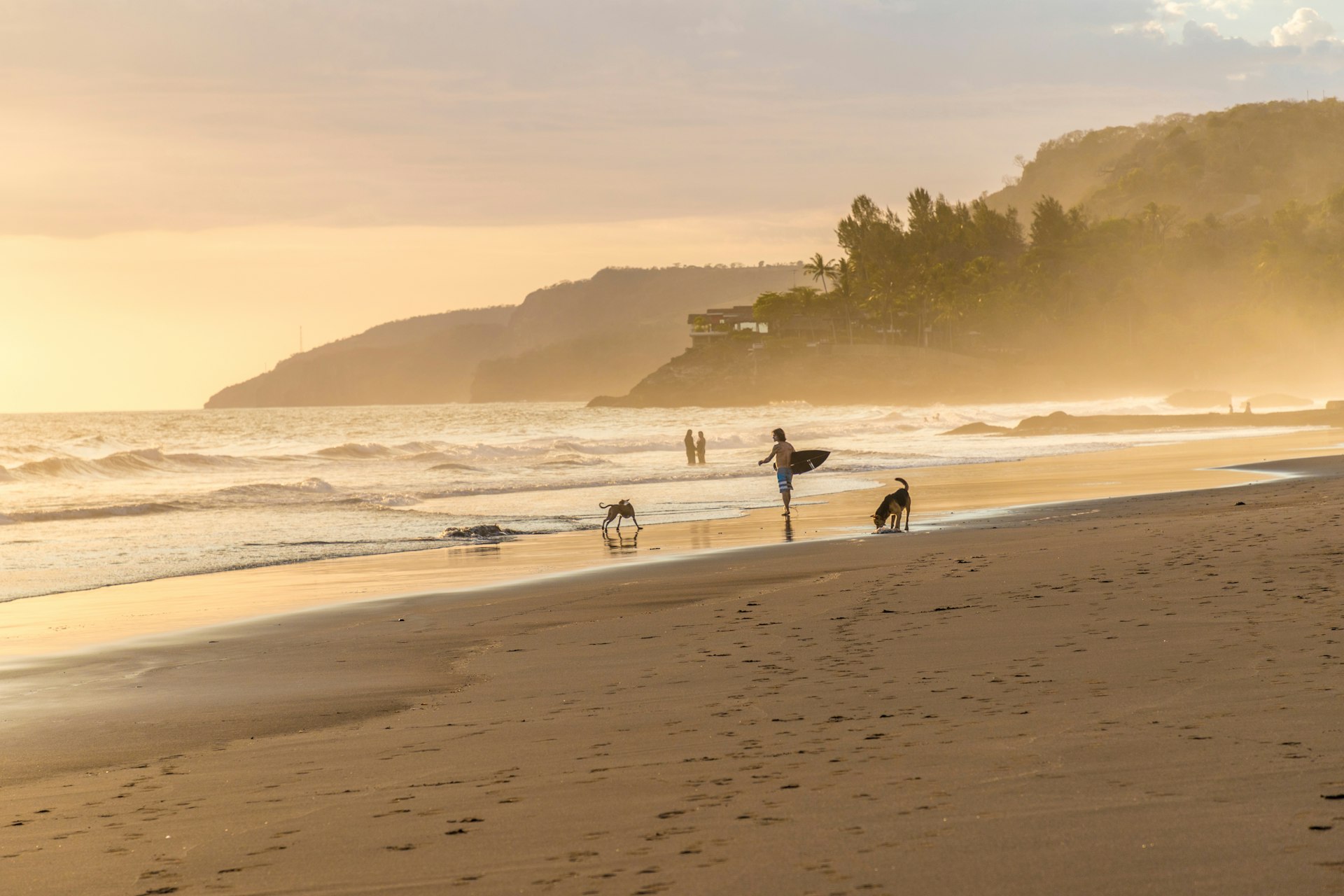
6. Hire a driver for multi-city itineraries
Most hotels can arrange an airport transfer or help you get a taxi to a nearby destination. But when traveling between cities, hiring a driver or tour operator is highly recommended.
Traffic in San Salvador can be intimidating. Rural roads are often unpaved and rife with potholes, and sometimes turn into single lanes that can be tricky to navigate for foreign drivers.
A tour operator can provide recommended tours or create a custom itinerary. Conveniently, the country’s ministry of tourism has a list of recommended tour operators on their website.
7. Bring your passport and buy a tourist card
For US citizens, a current US passport is required for entry, along with a $12 tourist card (valid for 90 days) that can be purchased at the airport when you arrive; no visa is required.
C itizens from countries like Australia , Canada and the UK only require a valid passport for entry – a visa is not necessary for stays under 90 days. However, these visa-exempt travelers are still required to buy the tourist card at the airport upon arrival. Check with your country’s embassy for entry requirements.
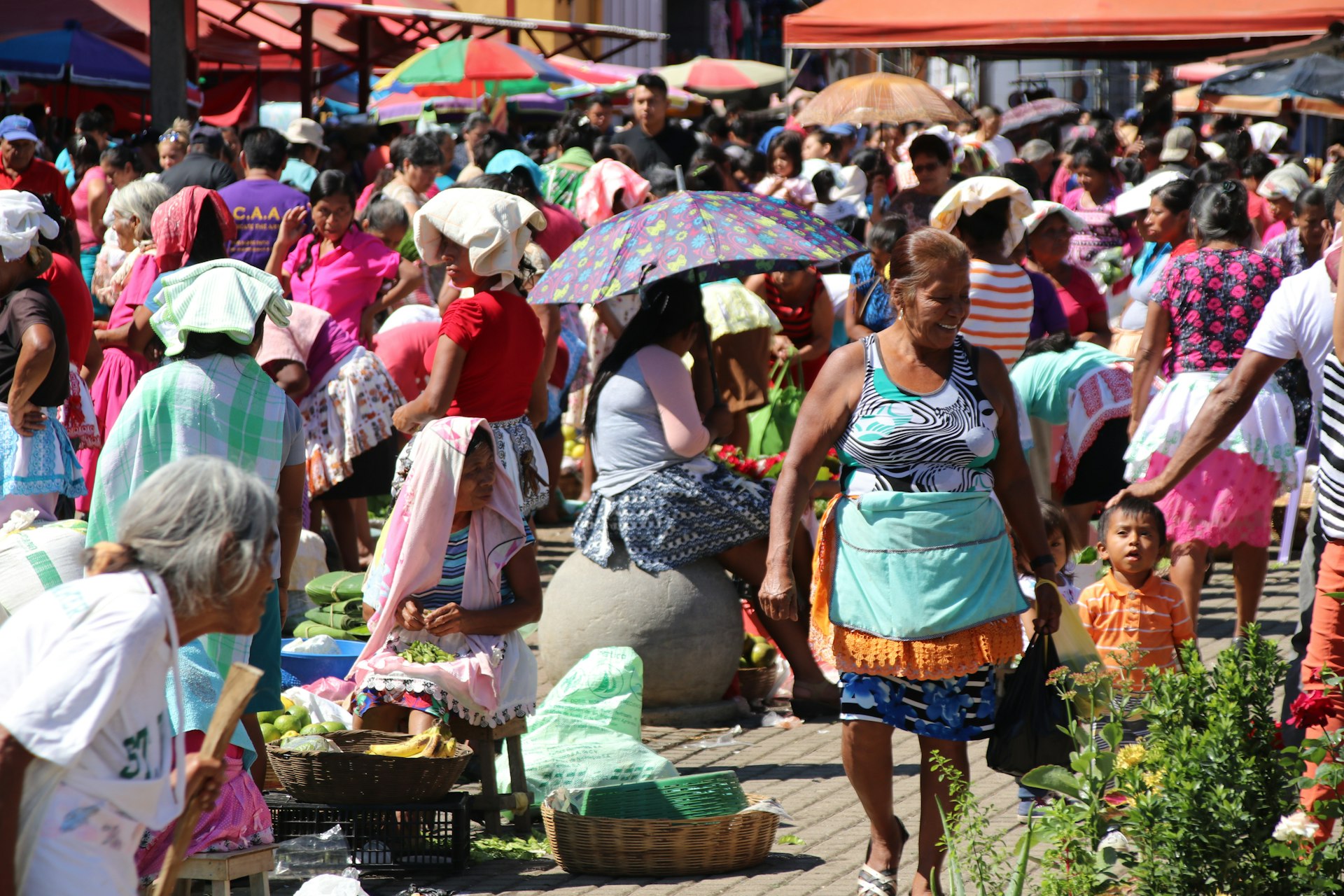
Etiquette in El Salvador
8. brush up on your basic spanish.
Spanish is the official language here, and though staff will likely speak English at restaurants and hotels in major tourist areas, it’s good manners to at least know a few greetings en español .
Simple and useful phrases such as hola (hello), buenos días (good morning), buenas tardes (good afternoon) and buenas noches (goodnight) are a decent place to start.
9. Be prepared to see a machete or two
In the US, park rangers might accessorize with a compass and drawstring hat. In El Salvador, dense forests call for a decidedly different accessory: a machete.
Don’t be shocked if your guide carries a blade to clear branches from hiking trails. But definitely don’t bring your own.
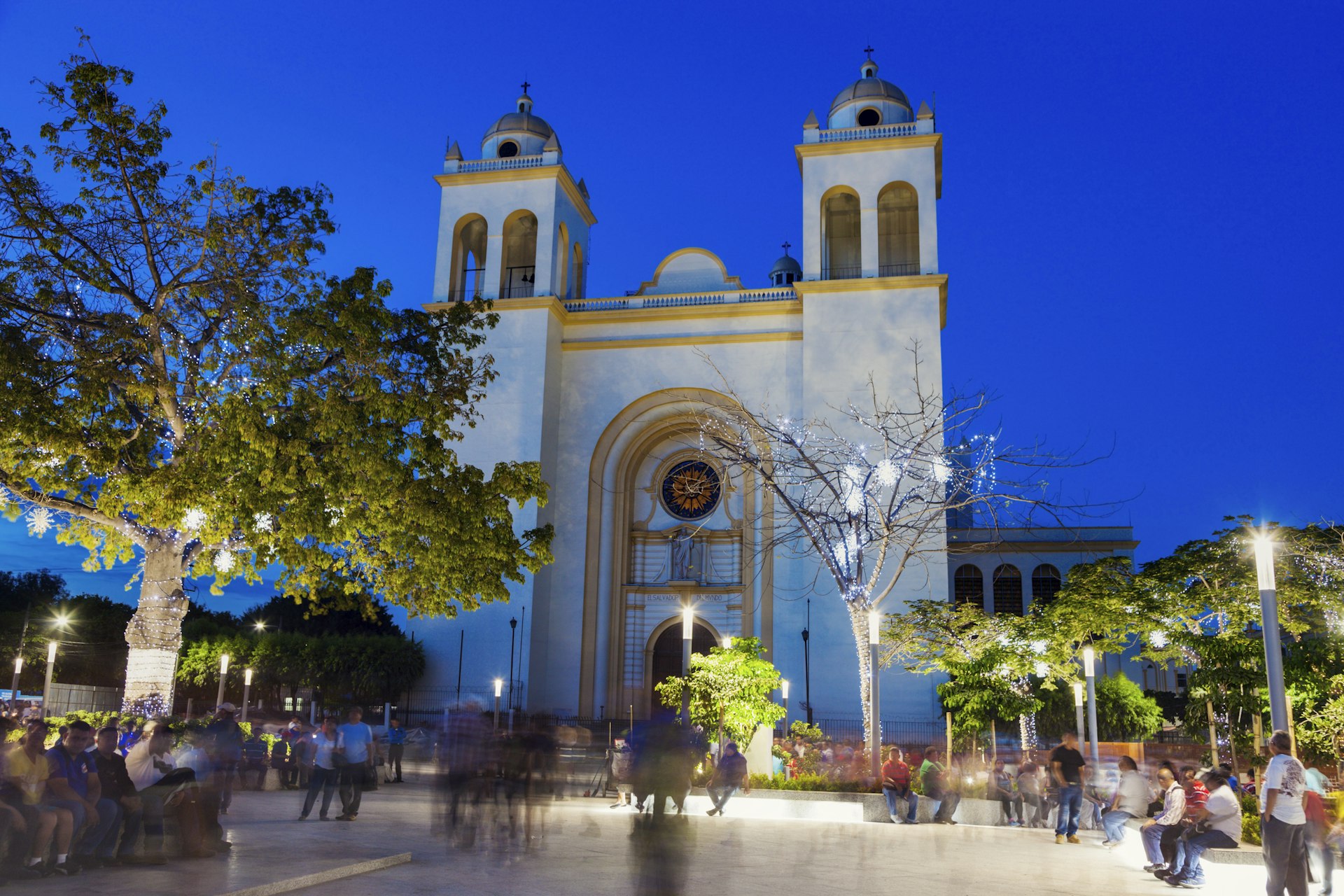
10. Dress appropriately for church
As with visiting most religious centers around the world, cover your legs and shoulders when visiting the country’s Catholic cathedrals.
A knee-length skirt will suffice if you don’t want to wear pants, and wrapping a scarf around your shoulders works to cover a tank top.
11. Leave a tip for good service
In restaurants and bars, leaving a 10 percent tip is common. Yet be sure to always check your bill before tipping because sometimes it’s already included.
12. Understand the country’s recent history
From 1980 to 1992, El Salvador experienced a bloody civil war, and the effects of that tumultuous period are still felt today. It’s very likely that your tour guide or the bartender serving up your Cadejo (a popular local beer) either lived through the war or had family members directly affected by it.
Be respectful and know that not everyone wants to talk about their experiences. But when you do meet someone who’s open to sharing – for example, you can take a tour of Cinquera led by a former guerilla fighter – let them know how grateful you are to hear their story.
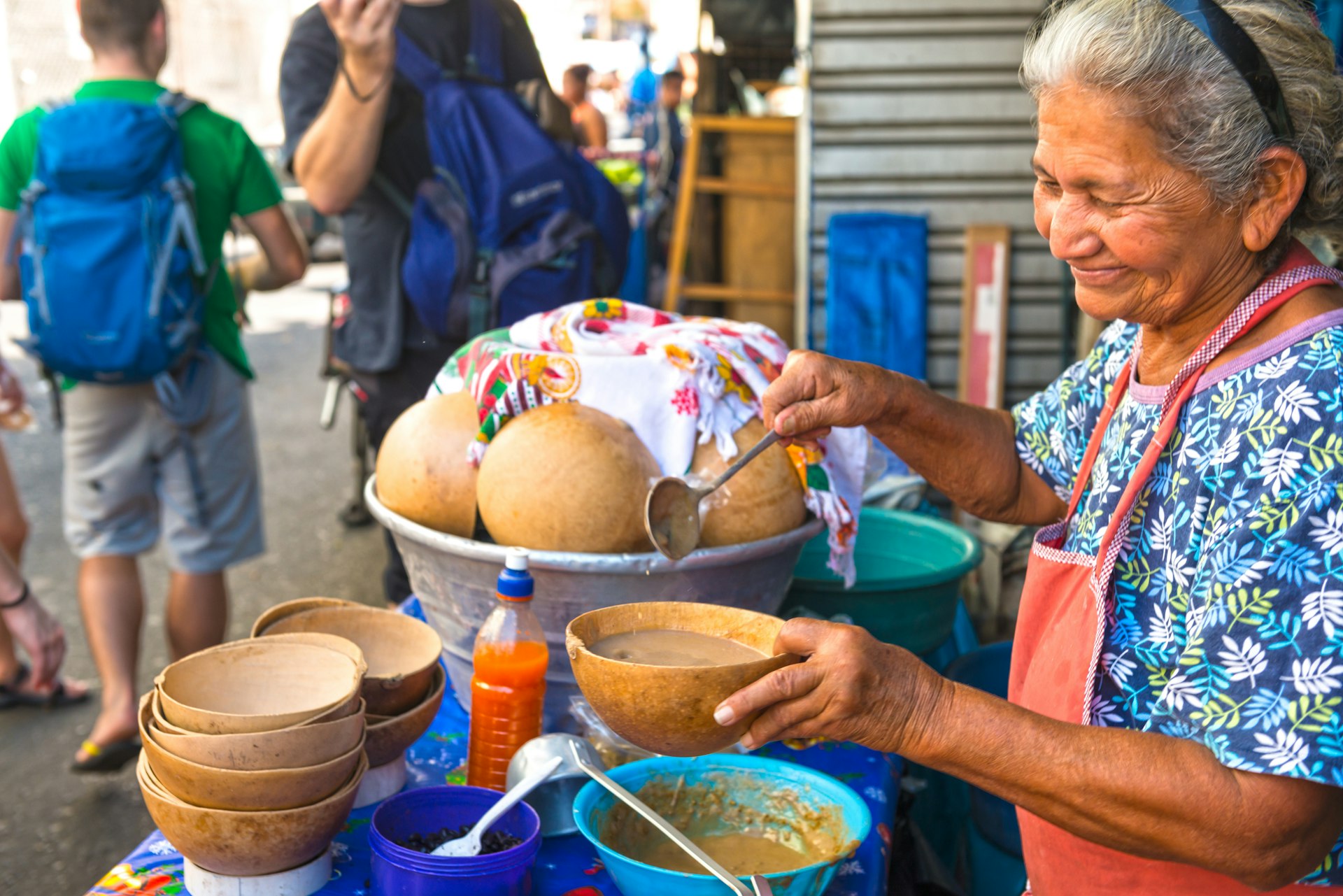
13. Sip and slurp hot foods…even in the heat
The pupusa (stuffed corn tortilla) might be El Salvador’s most famous food, but soups and broths are also beloved here, even though temperatures are tropical most of the year.
Don’t be surprised if your waiter recommends a steaming bowl of seafood broth or sopa de pata (soup made from cow’s feet…yep!) even though you’re ready to hit the beach.
Likewise, Salvadorian coffee, a top agricultural export since the 1800s, can’t be missed. Nor should atol de elote , a sweet drink made with corn and served hot – though grouchy gourmands should steer clear: Maya folklore says the beverage turns bitter if someone in a bad mood touches it.
Health and safety in El Salvador
14. verify your vaccine needs.
The only vaccine required to enter El Salvador is yellow fever, and that’s only if you’re six months or older and from a high-risk country (countries in South America and Africa , or Panama ).
15. Just say no to tap water
Stick to bottled water and ice made from purified H2O only; water from the tap can be contaminated.
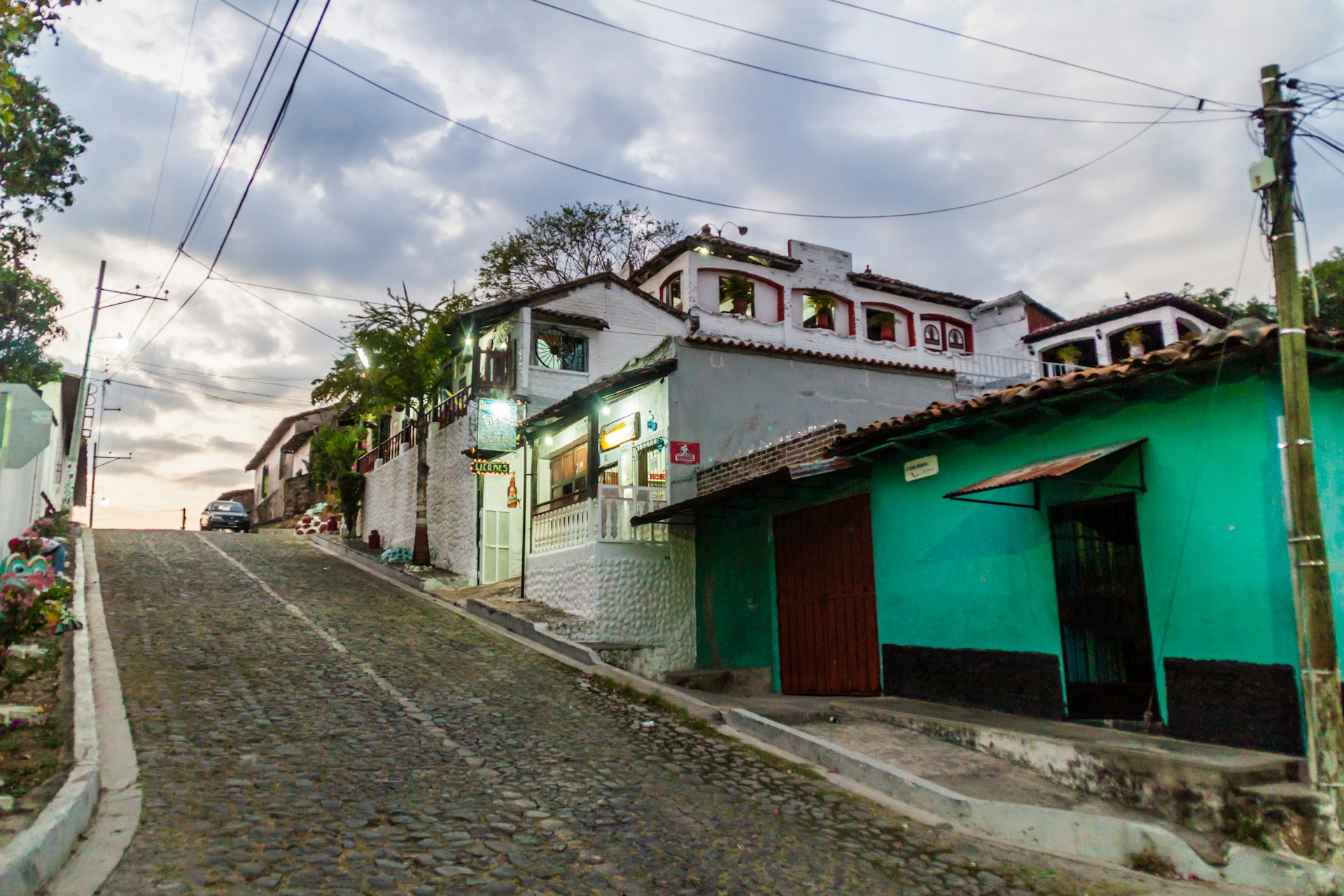
16. Avoid walking alone and driving at night
In both big cities and rural areas, it’s always recommended to avoid walking alone at night. If you’re not with a group, ask your hotel or restaurant to arrange a taxi ride for you.
Likewise, if you do rent a car, skip driving at night. Not only will you minimize your chances of robbery, but you’ll also have greater visibility on roads with poor lighting or none at all.
17. Know a safe taxi when you see it
Always look for an “A” at the beginning of your taxi’s registration to confirm it’s official. Also, most taxis don’t have meters, so agree on a price with your driver before you get in.
18. Steer clear of certain areas in San Salvador
Sadly, gang violence remains a problem in El Salvador. Gangs don’t typically target tourists, yet to avoid getting caught in the crosshairs, avoid the areas of Soyapango, Apopoa and Mejicanos in San Salvador.
On the flip side, the Centro Histórico in San Salvador – where many of the city’s museums are located – tends to be safer thanks to a greater police presence.
19. Tread carefully as an LGBTIQ+ traveler
Among Salvadorans, discrimination and violence against the LGBTIQ+ community have been well documented by such watchdogs as Human Rights Watch .
With this in mind, same-sex couples should be careful about public displays of affection. Additionally, it’s worth researching hotels ahead of time and seeking out gay-friendly stays.
20. Dial these digits for the police
In case of an emergency, call 911. To contact the Politur – a branch of the National Civilian Police dedicated to the well-being of tourists – specifically, call 2511-8300 or 2511-8302. They can offer safety information and, with proper arrangements, can even provide escorts.
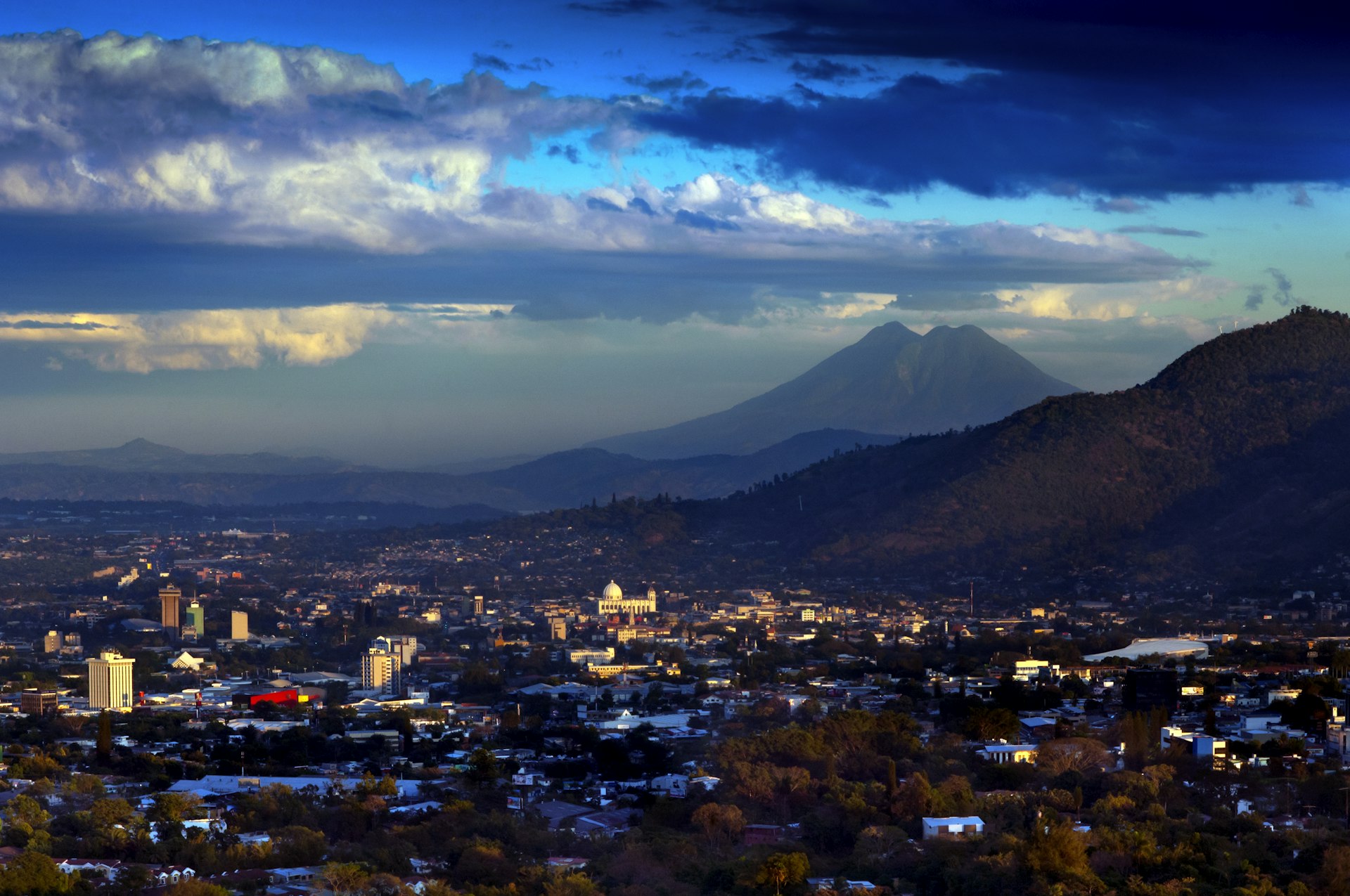
21. Take note of hurricane season
Typically, hurricane season lasts from June to November. Just as with the rainy season, unpaved roads may become flooded when a storm strikes, altering travel routes or, in severe cases, requiring you to stay put for a day or two.
I f you plan to visit during this time of year, check with your hotel and travel insurance about hurricane contingency plans. Plus, monitor weather and potential storms in the days leading up to your trip.
22. Leave your edibles and CBD balms at home
Cannabis and cannabis-derived products, like CBD, are illegal in El Salvador, so purge your toiletry bag of any oils, serums or lotions that could get you in hot water.
Speaking of which, El Salvador has some of the harshest punishments in the world for drug possession, so this is definitely not the vacation to experiment with any other unlawful substances, either.
This article was first published Sep 23, 2022 and updated Jan 30, 2024.
Explore related stories

Tips & Advice
Jun 11, 2024 • 5 min read
Dreaming of moving to Australia? Here’s all you need to know if you are thinking of applying for a working holiday visa.

Jun 4, 2024 • 7 min read

May 28, 2024 • 9 min read

May 27, 2024 • 7 min read

May 26, 2024 • 7 min read

May 22, 2024 • 7 min read

May 22, 2024 • 8 min read

May 21, 2024 • 11 min read

May 17, 2024 • 7 min read

May 14, 2024 • 7 min read
- English (EN)
- Español (ES)
- Português (BR)
Is San Salvador Safe? Crime Rates & Safety Report
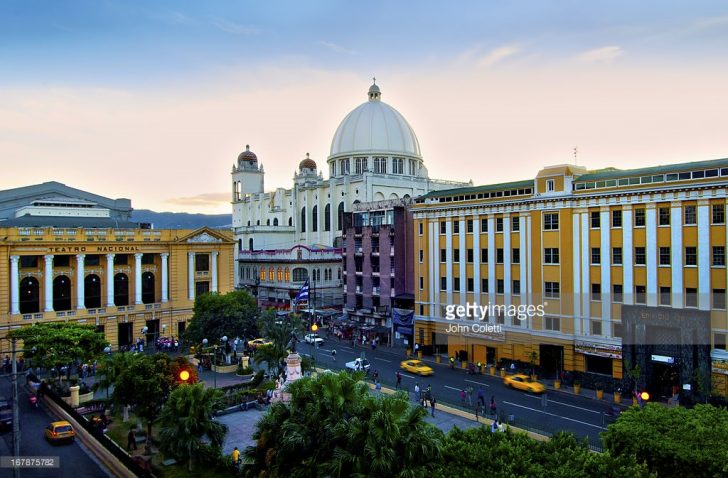
El Salvador : Safety by City
- San Salvador
San Salvador is the capital city of El Salvador , located at the foot of the San Salvador volcano.
With its population of 2 million people and due to rapid growth, San Salvador has become a great tourist attraction and well-visited destination.
Frequently visited by foreigners are luxurious shopping malls in the areas of Santa Elena, Antiguo Cuscatlan, Nuevo Cuscatlan, and Ciudad Merliot.
On the other hand, there are middle-class areas like Colonia Flor Blanca with examples of art deco and architectural oddities.
Tourists can visit beaches and forests as well as a well-maintained national park.
- Warnings & Dangers in San Salvador
OVERALL RISK: MEDIUM
When you come to San Salvador, you need to exercise a high degree of caution due to the high level of violent crime. The police are doing their best against violent gangs, but with little success. Pay close attention to your security at all times and avoid certain areas like the historic downtown of San Salvador, Soyapango, Apopa, Nejapa, Ilopango Mejicanos, and Tutunichapa. There were reports of mugging and even murder in these areas.
TRANSPORT & TAXIS RISK: MEDIUM
When it comes to public transport in San Salvador, it can be considered unsafe since the vehicles are old and do not work properly, and people are robbed there, too. Taxis should be used, but only the licensed ones. You can drive with your driving license but bear in mind that driving standards are not too great and car insurance is essential.
PICKPOCKETS RISK: HIGH
When it comes to pickpocketing and purse snatching, these types of crimes are frequent and the most usual way of performing the robberies is on motorcycles. You should take particular care of your belongings since the criminals watch what you possess and decide whether to attack or not. The places where they mostly operate are bus stations, airports, tourist areas and on public transport.
NATURAL DISASTERS RISK: MEDIUM
San Salvador has several active volcanoes, so before coming there, you should get informed about the increased volcanic activity. The rainy season is from June to November which may cause landslides and flooding. Occasional earthquakes happen, so if you are staying in a hotel read their earthquake instructions.
MUGGING RISK: HIGH
There have been reports of muggings followed by murder, armed robbery, kidnapping, and sexual assault in San Salvador. It is frequently performed by the criminal gangs and it is better to give them what they want than to resist, to avoid more serious consequences. They are usually after your valuables.
TERRORISM RISK: LOW
Even though there were no reports of terrorism in San Salvador recently, demonstrations occur from time to time and they should be avoided. The possibility of the attacks cannot be ruled out.
SCAMS RISK: HIGH
Taxi drivers are the most frequent threat when the scam risk is in question. They will try to overcharge tourists so always determine the price before the ride or ask for the meter to be turned on. Thieves use the technique of something spilling on you to distract you, while the other person takes your purse or wallet. The scams come in various forms and can cause great financial loss.
WOMEN TRAVELERS RISK: MEDIUM
The threat to solo female visitors exists in San Salvador, even though many women travel without any issues. Bus terminals and taxis are the most frequently operated places by criminals who tend to take advantage of a woman traveling alone. To avoid becoming a victim, women should not travel after dark and should not wear jewelry or expensive electronic devices.
- So... How Safe Is San Salvador Really?
San Salvador has had a history of violence and was considered the most dangerous city in the world.
The situation has changed, but not completely.
You still need to pay attention to criminal gangs operating around the city.
To stay safe you should not walk on streets that look abandoned and dark, should use only licensed taxis, keep your valuables out of sight and don’t wear expensive looking jewelry and when women are in question, they should dress conservatively.
However, if you are an experienced traveler, spending a few days exploring this cosmopolitan city can be a rewarding experience.
- How Does San Salvador Compare?
- Useful Information
If the reason for your travel is tourism or business that will last no longer than 90 days, you can come without a visa. If you want to extend your stay, you will need to contact the authorities. Your passport should be valid for the duration of your stay.
The US dollar is the official currency in El Salvador, but there are some prices in the Salvadoran Colon. There are many ATMs on the streets, but taking the money from them might be risky. The better solution is to take money from the ATMs in banks, hotels or shopping malls.
The climate of San Salvador attracts numerous visitors all year round since it is tropical and most of the time is warm and sunny. In December it might be a bit cooler, but the light spring clothes are the warmest one that is necessary when coming to San Salvador.
To come to El Salvador, you can use San Salvador International Airport, located 50 km south of San Salvador. It is the largest airport in Central America and many national and international airlines serve this airport.
Travel Insurance
Because El Salvador has one of the highest crime rates in Latin America, it is advisable to obtain a travel insurance policy before coming to San Salvador.
San Salvador Weather Averages (Temperatures)
- Average High/Low Temperature
El Salvador - Safety by City
- Where to Next?
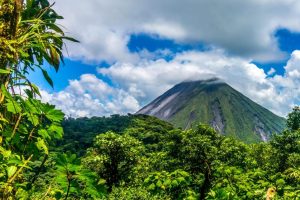
3 Reviews on San Salvador
Really helpful for those traveling to San Salvador
Overall uneasy fell
It was a quick in and out for us but I felt all kinds of emotions. We mostly stayed near the airport area for the whole 8 hours while we waited for a connecting flight. Everyone warned me to be on the lookout for kidnappers, muggers so this didn’t help at all.
I WENT TO VISIT BUT IT WAS BEATIFUL NO PROBLEMS AT ALL SO RELAX WE STAY AT LA LIBERTAD
Share Your Experience Cancel reply
Your Review
Title of your review
Article Contents
- San Salvador : Safety by City
- Overall Risk
- Transport & Taxis Risk
- Pickpockets Risk
- Natural Disasters Risk
- Mugging Risk
- Terrorism Risk
- Women Travelers Risk
- Weather Averages (Temperatures)
- User Reviews
- Share Your Experience
Popular Destinations

Safety Index
Recent reviews & comments.
- Triangle Man on Ulaanbaatar
- Mike on Cambodia
- Someone on China
- RealTruth on Auckland
- Vince White on Council Bluffs
Popular US States
- Pennsylvania
- Mexico Travel News
- Seaweed Updates
- Hidden Travel Gems

Is El Salvador Safe To Visit? Travel Advisory 2024
It’s simple. For the very first time in decades, travelers around the world are watching the news from El Salvador and saying, let’s go!
An army of TikTokers, YouTubers, and tourism journalists are flocking to El Salvador to document and experience firsthand what international media calls “ the miracle. ”
Believe it or not, this small Central American country has become the safest destination in Latin America and it’s competing with Canada for the first spot in the entire continent, according to European press.
Following the murder of 62 Salvadorans on March 26 , 2022, President Nayib Bukele said: “Enough is enough.” He declared a State of Emergency, launched the most ambitious military operation ever seen and in a matter of months managed to take back control of the entire territory.
But is it too good to be true? Let’s see.
LATEST NEWS from El Salvador:
April 9: el salvador has become the second safest country in the american continent.
With a homicide rate of 2.4 per 100,000 inhabitants, El Salvador has become the second safest country on the American continent after Canada, according to Justice and Security Minister Gustavo Villator.
After a massive wave of killings in 2022, President Nayib Bukele managed to arrest more than 75,000 gang members and reduce homicides by 70%.
There has been criticism by international media due to possible violations of the criminals’ human rights but data from the Institute of Public Opinion shows that in December 2019, Salvadorans thought their biggest concern was criminality but by December 2023, that concern had reduced to less than 4.3%.
Areas to Avoid
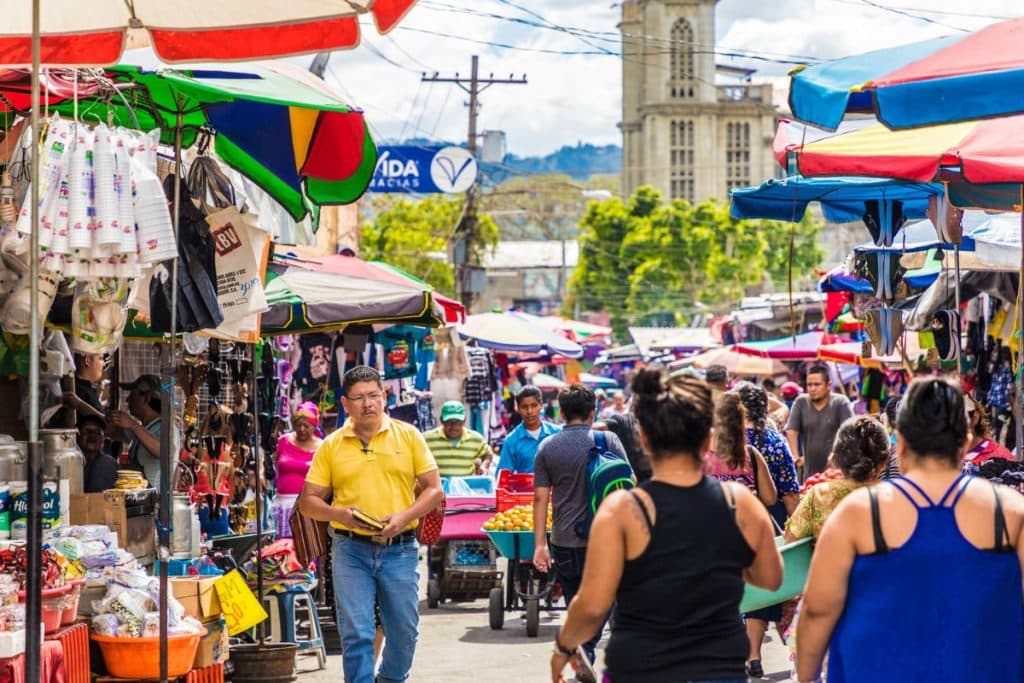
It feels weird to say this but, as of today, there are no places locals and visitors cannot go to. Salvadorans have started to experience how it feels to go out at night, have fun and return home safely without risking their lives in the process.
Not all gang members have been captured, though. So, for now, while we all get used to this new normality, don’t venture to remote or isolated areas or those that don’t have police protection.
Official Travel Advisories
Us travel advisory.
The latest Travel Advisory for El Salvador is dated July 27, 2023, and a lot has changed since then.
Anyway, the US government still recommends Americans “ Reconsider Travel ” to El Salvador due to crime and avoid remote areas at all costs.
As of today, local authorities have extraordinary powers to put under arrest those they suspect to have engaged in criminal activities. This has included a number of Americans and other foreigners.
Keep in mind that under the current State of Exception, you could see your movements limited and if you get arrested you might not be entitled to a speedy trial.
Canada Travel Advisory
Canada acknowledges that violent crime has seen a significant reduction since the government decreed the state of exception. But for the time being, citizens are advised to travel with a “high degree of caution.”
Some gang members are still active and you can fall victim to violent crime.
Always be aware of your surroundings, especially on public transportation or in remote areas.
Safety Tips for El Salvador
El Salvador has just started opening up to the world and it is learning how to do so. Safety has undeniably improved but crime can still occur even in tourist areas. So, follow these tips to enjoy a safer trip.
- Don’t refuse to cooperate with police and military personnel. They currently have exceptional powers and can search you even if you think it’s not fair.
- When going hiking, always hire a local guide certified by the tourism authority and use reputable transportation companies.
- If you happen to be an American register in the Smart Traveler Enrollment Program (STEP) to help the US government locate you in case of need.
- Don’t leave your valuables in your car.
- Keep your guard high when walking around.
- Refrain from resisting robbery attempts.
- Refrain from wandering around after dark.
- Always carry your identification documents with you.
- Keep your family and friends back home updated about your whereabouts.
- Keep yourself informed about the latest safety news in the country.
- Pay special attention when withdrawing money from banks or ATMs.
- Try to blend in. There’s no need to show you have a lot of money.
Cookies on GOV.UK
We use some essential cookies to make this website work.
We’d like to set additional cookies to understand how you use GOV.UK, remember your settings and improve government services.
We also use cookies set by other sites to help us deliver content from their services.
You have accepted additional cookies. You can change your cookie settings at any time.
You have rejected additional cookies. You can change your cookie settings at any time.
Register to vote Register by 18 June to vote in the General Election on 4 July.
- Passports, travel and living abroad
- Travel abroad
- Foreign travel advice
El Salvador
Safety and security.
There is a high threat of terrorist attack globally affecting UK interests and British nationals, including from groups and individuals who view the UK and British nationals as targets. Stay aware of your surroundings at all times.
UK Counter Terrorism Policing has information and advice on staying safe abroad and what to do in the event of a terrorist attack. Find out how to reduce your risk from terrorism while abroad .
Terrorism in El Salvador
Although there’s no recent history of terrorism in El Salvador, attacks cannot be ruled out.
Political situation
Despite political tensions arising from irregularities in the electoral processes, both the Presidential and Legislative elections on 4 February and Municipal and Central American Parliamentary elections on 3 March passed peacefully. Avoid demonstrations and do not engage in any political activity.
It’s illegal for foreign nationals to engage in political activities such as public demonstrations in El Salvador. If you participate in demonstrations, you may be detained and deported. Avoid large gatherings or demonstrations and be cautious in public areas.
In 2021 there were significant political protests in San Salvador. Although the protests were peaceful and there were no injuries, there was significant damage to property.
Also in 2021, gunmen in San Salvador opened fire on activists from one of El Salvador’s main opposition parties, killing 2 people and injuring 5 more.
El Salvador has until recently had one of the highest crime rates in Latin America. The risks of violent and petty crime remain, despite recent progress.
State of exception (emergency)
El Salvador’s government has declared a state of exception (emergency) in response to a sharp rise in gang-related murders. The state of exception started in 2022 and has remained in place since. The murder rate has fallen significantly, but the authorities are concerned the gangs could regroup.
The state of exception gives police additional powers, resulting in a much higher number of arrests, sometimes without much evidence. It also allows police to detain people for much longer before trial. Many ordinary legal safeguards have also been weakened or removed. For example, joint legal hearings for over 100 people are common.
Some embassies have struggled to get consular access to their citizens. If you’re arrested, the El Salvador government may not allow the British Embassy to give you consular assistance or make sure you receive legal representation. Mistreatment and human rights violations, sometimes resulting in death, happen in detention facilities.
Security operations and gang-related violence do not usually affect tourists and visitors. Security operations have taken place across the country, particularly in Soyapango, Ilopango, Mejicanos, San Martin and San Marcos.
In 2022 the Salvadoran Legislative Assembly designated gang members as terrorists and established harsher penalties for them. Government communications and social media posts now sometimes refer to suspected gang members as terrorists.
Robberies and violent assaults
There have been isolated attacks on tourists, including robberies, carjackings and violent assaults.
Within San Salvador, the areas of Santa Elena, San Benito and Maquilishuat have better security, as do most of the larger shopping malls.
Protecting yourself and your belongings
Avoid walking alone or on remote trails. It may be safer to travel with others or go on a tour with a reputable company. Take extra care in more rundown areas of towns and cities and those less visited by tourists. Follow local advice on where the safer areas are.
Keep valuables, including your passport, in a hotel safe if possible. Guard your passport, mobile phone and cash against pickpockets at bus stations, airports, tourist sites and on public transport. Do not wear expensive jewellery, particularly at airports, and only carry a small amount of cash.
Withdraw money from ATMs in shopping centres or change money in hotels or banks. Do not withdraw a lot of money at one time or use ATMs at night or in badly lit areas.
If you’re driving, take extra care at junctions, where armed robbers often target stationary traffic. Stick to main roads and avoid unsurfaced roads, as you’re at greater risk in remote areas with fewer police patrols. Always lock doors and keep windows closed. If you’re robbed, do not resist the attackers or take any action that puts you at greater risk.
If you have questions on security, contact the El Salvador tourist police:
Telephone: +503 2224 2705
Email: [email protected]
Buses and taxis
Public buses (repainted old US school buses) are not safe due to petty crime. Private intercity buses are generally safer, although crime can also happen on these. Only use reputable coach companies. For shorter trips within towns and cities, take radio-dispatched, pre-booked or hotel taxis operated by reputable companies. Do not use unofficial taxis, as there remains a small risk of kidnapping.
Criminal kidnapping
The risk of kidnapping to foreigners or visitors is relatively low, despite an increase in kidnapping of Salvadorans. You might wish to share your location or plans with a trusted person, particularly if taking public transport or a taxi. Kidnap gangs generally target rich Salvadorans rather than visitors.
Scam artists target foreign visitors and residents. Scams come in many forms and can cause great financial loss. Warn your friends and family to be sceptical if they’re asked to transfer funds to you in El Salvador. Tell them to contact you to check you’ve made this request.
Laws and cultural differences
Personal id.
The police may ask you for ID. They may detain you if they suspect you are a gang member. Always carry a copy of the photo page of your passport to prove your identity.
The official currencies of El Salvador are the US dollar and bitcoin. Bitcoins may not be accepted everywhere. If you’re considering using bitcoins, make sure you understand the risks involved. Also make sure you can access US dollars if needed.
It is almost impossible to change British pounds anywhere in El Salvador, so you should bring a mixture of cash and travellers cheques in US dollars.
Many smaller restaurants, bars and shops do not accept 50 and 100 US dollar notes. You can exchange these notes at a bank. Bring smaller denominations with you if possible.
Regular ATMs and bitcoin ATMs are widely available, particularly in San Salvador and La Libertad. Tell your bank of your travel plans to avoid your card being blocked.
Crowded events
On 20 May 2023, at least 12 people died and more than 500 were injured during a football match at the Cuscatlán Stadium, due to overcrowding. If you’re attending events in crowded places and large gatherings, follow the advice of the local authorities and maintain a high level of security awareness.
Illegal drugs and prison sentences
There are severe penalties for drug use and trafficking in El Salvador. Prisons are overcrowded and violent.
LGBT+ travellers
Same-sex marriage, civil unions and adoption are illegal in El Salvador. (The Family Code establishes that marriage should happen between a man and a woman, although the constitution does not make this specific point.) Due to conservative attitudes and the risk of harassment to same-sex couples, showing affection in public is not recommended.
Read more advice for LGBT+ travellers .
Landmines and unexploded weapons
There is a small risk of unexploded weapons, such as landmines, in remote areas. If you’re going off-road, take local advice and avoid such areas if warned.
Outdoor activities and adventure tourism
Swimming safety.
Swimming on the Pacific coast can be dangerous due to strong undertows. The currents around La Bocana de San Diego are particularly treacherous. Several people have drowned in recent years. There are very few or no lifeguards. You should avoid swimming on isolated beaches, especially after consuming alcohol.
Rivers tend to be contaminated and unsafe to swim or bathe in.
Transport risks
Road travel.
If you are planning to drive in El Salvador, see information on driving abroad
You can use a UK photocard driving licence to drive in El Salvador for the first 90 days after you arrive. If you still have a paper driving licence, you may need to update it to a photocard licence . El Salvador does not accept the international driving permit.
After 90 days, you must get an El Salvador driving licence. Before you can apply for a licence, you must already have a temporary residency permit. You’ll need to have your UK licence certified (‘Homologación Licencia Extranjera’) as part of the application process.
Hire car companies often have stricter requirements for their customers, such as a year of driving experience or a higher minimum age.
Car insurance is essential. If you’re involved in an accident, call 911 to reach the national police or fire brigade. Wait for the police to arrive.
Driving standards
Driving standards vary. Lane discipline is poor.
Roads between the main tourist locations in El Salvador are of a good or acceptable standard. Thieves sometimes steal manhole covers, leaving large holes in the road. In more isolated locations, roads are unsurfaced and 4-wheel-drive vehicles are necessary.
Crossing borders
Take particular care when driving to or from the border with Guatemala. There have violent attacks on vehicles, particularly on the Guatemalan side of the border. Criminals often target vehicles with El Salvador number plates. It’s better to cross borders in the morning, giving you time to reach your destination before dark. Borders sometimes close in the early evening. Private bus companies are considered safer than public buses for crossing borders.
Extreme weather and natural disasters
Find out what you can do to prepare for and respond to extreme weather and natural hazards .
Rainy season
The rainy season normally runs from June to November – the same time as the hurricane season in the Caribbean. During the rainy season you can expect frequent, heavy rain, thunderstorms and possible tropical depressions. Landslides and flooding can affect roads. Mountain areas are particularly vulnerable to landslides.
Monitor local and international weather updates from the Dirección General de Observatorio de Amenazas y Recursos Naturales (in Spanish), the World Meteorological Organization and the US National Hurricane Center .
Hurricanes
See tropical cyclones for advice about what to do if you’re caught in a hurricane.
Volcanic eruptions
El Salvador has active volcanoes, at least 6 of which are monitored.
Get local advice before climbing volcanoes in El Salvador and monitor local media for updates on increased volcanic activity. Check the Directorate General of Civil Protection for volcano warnings. It’s safer to climb volcanoes or walk in remote areas during daylight hours with a tour guide.
Earthquakes
There are frequent minor earth tremors and occasional earthquakes in El Salvador. The US Federal Emergency Management Agency website has advice about what to do before, during and after an earthquake . If you’re staying in a hotel, read their earthquake instructions.
See the Ministry of the Environment and Natural Resources for information on El Salvador earthquakes.
There is a risk of tsunamis in coastal areas. See tsunamis .
Wildfires
Fire risk increases during the dry season, particularly in San Salvador. During especially hot and dry periods a single spark or flame can start a wildfire. Report fires to the emergency services immediately.
Related content
Is this page useful.
- Yes this page is useful
- No this page is not useful
Help us improve GOV.UK
Don’t include personal or financial information like your National Insurance number or credit card details.
To help us improve GOV.UK, we’d like to know more about your visit today. Please fill in this survey (opens in a new tab) .

Safety In El Salvador: Do Travelers Need To Worry?

El Salvador has long been on the list of most dangerous countries in the world. A few years ago things started to change for the smallest Central American country. A young Salvadoran politician by the name of Nayib Bukele became El Salvador’s 43rd president and turned things around.
We booked our trip to El Salvador before doing our research which is not our usual way of booking trips. When I started to do some research I saw that it had some issues but we were happily surprised at what we found.
Let’s jump into the discussion on whether or not travelers have to worry about their safety in El Salvador.
About El Salvador

El Salvador is the smallest country in Central America . It is bordered by Honduras to the Northeast and Guatemala to the Northwest. The Pacific Ocean sits to the west and south. It’s capital and largest city is San Salvador and there are around 6.6 million people who live in all of El Salvador.
Like most of Central America, El Salvador has a tropical climate and is warm and humid throughout the year. It has jungles, mountains, coffee plantations, and stunning beaches. El Salvador is renowned for it’s world-class surfing . Surfers from around the world visit El Salvador for the experience.
El Salvador sits along the Ring of Fire. Known as the Land of Volcanoes , this tiny country is home to twenty volcanoes. Several of them are still active. El Salvador has frequent earthquakes along with the volcanic activity.
Central America’s Reputation
Central America is a diverse region with varying levels of crime from pick pocketing to robberies to gang violence. Like many regions in the world, travel to Central America does have it’s safety concerns. It’s reputation varies depending on the specific country and each country has areas with high crime rates.

While some countries in Central America, such as Costa Rica and Panama, have a better safety reputation, El Salvador is not one of them. Crime in El Salvador had much higher levels than it’s neighbors.
El Salvador has experienced issues with gang violence, drug trafficking, and organized crime. In 2015 El Salvador had the unfortunate title of “murder capital of the world” with 6,656 homicides. According to World Bank Data , there were 107 murders per 100,000 people in El Salvador in 2015.
El Salvador’s New President
In 2019 El Salvador elected Nayib Bukele as it’s new president. Before that, he served as mayor of it’s capital San Salvador for three years. Bukele used social media to engage with voters and ran on the promise of cleaning up corruption and crime and making safety in El Salvador a priority. He won, becoming the youngest-ever president of the country.
Changes In El Salvador
Once Bukele came into office, he immediately got to work on his promise of cleaning up crime in El Salvador. During his first year in office the murder rate fell by 50 percent .
Bukele has credited the decrease in murder to deploying thousands of police officers and the military throughout the country. He also increased prison security and arrested over 68,000 people affiliated with gangs.
President Bukele implemented various measures to address the issue of gangs. He has emphasized a “ mano dura ” or “iron fist” approach. This involved cracking down on gang activities through increased security measures and law enforcement efforts.
Bukele has also deployed the military and police forces to target high-crime areas and dismantle gang networks.

Although crime in El Salvador has been greatly reduced and safety in El Salvador has improved, Nayib Bukele has not been immune from criticism. His government has been accused of human rights violations, however crime dropped significantly and he has high approval ratings.
Bukele has also been accused of having authoritarian tendencies and has been under investigation for money laundering. He does remain popular with the people of El Salvador.
Is El Salvador Safe For Travelers?
The short answer is Yes ! Crime in El Salvador has been significantly reduced. From the high of 6,656 murders in 2015 to just 496 in 2022. As of 2023, El Salvador has gone from the highest homicide rate in Central America to the lowest. It now has a rate of 1.8 homicides per 100,000.
Read my article Is El Salvador a good place for Travelers ?
Other El Salvador Travel Info
Currency : El Salvador uses the US Dollar as their currency but they also use Bitcoin. Weather : El Salvador has a tropical climate. It is hot and humid the majority of the year. It has a rainy season between May and October and a dry season between November and April. Airports : El Salvador has one International Airport in San Salvador called Monsenor Oscar Arnulfo Romero International Airport. It’s airport code is SAL. Visas : U.S. citizen’s do not need a visa for stays of less than 90 days. There is a $10 USD fee upon arrival at the airport or border crossing. You can check the entry requirements of your country at iVisa .
What Is It Like To Travel In El Salvador?
No country is completely exempt from crime. Just like anywhere in the world, there are certain areas with higher levels of crime and violence than others. It’s always important to be cautious not only when you travel in El Salvador but to any country.
When we traveled there, we saw armed police throughout the country. This was BEFORE the big roundup of gang members in the spring of 2022. Even so, we never felt concern for our safety in El Salvador the entire time we were there.

What Areas Is Safety in El Salvador Still A Concern?
El Salvador’s level of crime and violence has been dramatically reduced, however, there are still areas that have higher crime than others. These areas are generally in certain neighborhoods in more populated cities.
The country’s capital of San Salvador has the highest incidence of crime and violence.
It’s always important to exercise caution when traveling to places you aren’t really familiar with. While the overall security situation has improved in recent years, there are still some areas that are considered more dangerous.
- San Salvador : The capital city of El Salvador can be particularly risky, especially in neighborhoods such as Soyapango, Ilopango, Mejicanos, Apopa, and Cuscatancingo.
- Santa Ana : While it has tourist attractions such as the Santa Ana Volcano , certain neighborhoods in Santa Ana can be dangerous. Pay attention to areas like Colonia San Antonio, Colonia Altavista, and Colonia Alameda.
- San Miguel : This city, located in the eastern part of the country, has also seen significant gang activity and violence. Be cautious when visiting neighborhoods like Ciudad Barrios, San Carlos, and Chinameca.
- La Libertad : While the coastal area of La Libertad is popular with tourists for its surf spots , there have been instances of robberies and assaults reported. Take precautions and avoid displaying valuable items openly.
It’s essential to stay informed about the current security situation if you travel to El Salvador. Follow the advice of local authorities, your embassy, or consulate. If you plan to visit consider seeking guidance from trustworthy sources to make informed decisions regarding your safety.
There’s so much to do and see in El Salvador! Read my article 19 things to do in Santa Ana El Salvador .
Travel Advisories
Anytime you plan on traveling to a new country that you aren’t familiar with, it’s a good idea to look at your own country’s State Department website to see what they recommend. If anything, just to have a better understanding of what you should be aware of.
You might even want to look at multiple countries websites as well. As of June 2023, the United States Government considers El Salvador a high security risk at a Level 3. The United Kingdom Government has advice on how to stay safe while traveling to El Salvador but doesn’t actually advise against travel there. The Canadian Government resembles the United States and they consider El Salvador a high risk area. They do have tips for staying safe.
Other Safety Concerns In El Salvador
Besides the threats of crime, there are other safety concerns in El Salvador to be aware of.
El Salvador is a country known for its volcanoes. It is located in a region called the Ring of Fire , which is characterized by volcanic and seismic activity. El Salvador has several volcanoes within its borders.
One of the most prominent volcanoes in El Salvador is the Santa Ana Volcano, also known as Ilamatepec. It is the highest volcano in the country and has had numerous eruptions throughout history.
Read all about the Santa Ana Volcano Hike .
Other significant volcanoes in El Salvador include the San Miguel Volcano (Chaparrastique) and the Izalco Volcano . The Izalco Volcano is known as the “Lighthouse of the Pacific” due to its frequent eruptions in the past.
These volcanoes contribute to the natural beauty and geological diversity of El Salvador. However, it’s important to note that volcanic activity can pose risks. Authorities closely monitor the volcanoes to ensure the safety of local residents and visitors.

El Salvador’s active volcanoes
- Santa Ana Volcano (Ilamatepec): This volcano has had several eruptions in the past, with the most recent one occurring in 2005. The Santa Ana Volcano is considered one of the most active volcanoes in El Salvador.
- San Miguel Volcano (Chaparrastique): It is also an active volcano, and its most recent eruption took place in December 2013. It is one of the most active and monitored volcanoes in the country.
- Izalco Volcano : Dormant since 1966, it was historically known for its frequent eruptions and was sometimes referred to as the “Lighthouse of the Pacific.”
Earthquakes
El Salvador is located in a seismically active region and experiences earthquakes. It is situated in the Pacific Ring of Fire , an area known for its tectonic activity and volcanic eruptions.
El Salvador is specifically located along the boundary of the Cocos Plate and the Caribbean Plate. The interaction between these plates can result in significant seismic activity. Over the years, the country has experienced numerous earthquakes, ranging from small tremors to larger, more destructive events.
It’s important to note that earthquakes can vary in magnitude and impact. The frequency and intensity of earthquakes can vary over time. El Salvador, like other countries in the region, has measures in place to monitor seismic activity. They take steps to mitigate risks and respond to earthquakes when they occur.
One of the biggest safety concerns in El Salvador is the water. You do not want to drink the tap water in El Salvador. The country’s water supply infrastructure and treatment processes may not meet international standards. The tap water may be contaminated with bacteria, parasites, or other impurities that can cause illnesses.
To ensure safe drinking water, it is advisable to drink bottled water . You can also use water purification methods such as boiling, filtering , or using water purification tablets. These precautions also apply to brushing teeth and consuming ice in drinks.

Malaria And Other Viruses
Like any country, El Salvador is not immune to the presence of viruses . Viruses are a common part of the global ecosystem and can affect human populations in various ways. El Salvador, like other countries, can experience outbreaks of viral diseases from time to time.
Some examples of viral diseases that have been reported in El Salvador include dengue fever, chikungunya, Zika virus , and respiratory viruses.
It is essential to stay informed about current health advisories and recommendations from local health authorities. Follow good hygiene practices such as regular handwashing and maintaining proper vaccination schedules.
Follow any specific guidelines from health authorities to help minimize the risk of viral infections.
For the most up-to-date information on specific viruses and their prevalence in El Salvador, consult reliable sources such as the World Health Organization (WHO) or the Ministry of Health of El Salvador .
El Salvador has a beautiful coastline and warm waters. It’s ideal for swimming, surfing, and other water activities. However, it’s essential to prioritize safety and be aware of local conditions.
Pay attention to any warning flags or signs. If you are not a strong swimmer you should stay close to the shore or swim in areas with lifeguards. There are rip tides and strong currents in the area and there aren’t always lifeguards. Check local conditions and don’t go out to swim alone.

How To Stay Safe when you travel in El Salvador
Staying safe in a foreign country requires taking certain precautions and being aware of your surroundings. Here are some general tips to help enhance your safety when you travel in El Salvador.
Research and Plan
Before traveling, research your destination thoroughly. Familiarize yourself with local customs, laws, and potential risks or safety concerns. Stay updated on travel advisories or warnings issued by your government.
Share Your Itinerary
Inform a trusted friend or family member about your travel plans. Share details of your itinerary, accommodation, and contact information. Stay in touch with them regularly and notify them of any changes to your plans.
Secure Your Belongings
Keep your belongings secure at all times. Use a reliable lock for your luggage and consider using a money belt or hidden pouch to keep important documents and valuables close to your body. Be cautious of pickpockets and keep an eye on your belongings in crowded places.

Stay Connected
Ensure you have a reliable means of communication, such as a working mobile phone or internet access. Save emergency contact numbers for local authorities and your country’s embassy or consulate in the destination country.
Blend In And Be Aware
Try to blend in with the local culture. Dress appropriately to avoid drawing unnecessary attention to yourself. Avoid wearing expensive items. Stay aware of your surroundings and be vigilant in crowded places, tourist areas, and public transportation.
Trust your instincts and avoid risky situations. Stay away from protests or demonstrations.
Transportation Safety
Choose reputable transportation options and be cautious while using public transportation. Research safe taxi services or ridesharing options, if available. If using a taxi, consider noting the license plate number and sharing it with someone you trust.
Health And Hygiene
Take necessary health precautions by checking if any vaccinations are required for your destination. Carry necessary medications, travel insurance, and a basic first-aid kit. Follow proper hygiene practices, including handwashing, to minimize the risk of illness.
Respect Local Laws And Customs
Familiarize yourself with the local laws and cultural customs of the country you are visiting. Respect local traditions, dress codes, and etiquette to avoid inadvertently offending or attracting unwanted attention.
Safe Accommodation
Choose reputable and secure accommodations, such as established hotels or guesthouses. Ensure that your accommodation has proper security measures and lock your room when you leave.
Stay Informed
Stay updated on local news and developments during your stay. Pay attention to any safety alerts, demonstrations, or protests that may be occurring in the area. Adjust your plans accordingly.
Final Thoughts On Safety In El Salvador
Remember, every destination has its own unique safety considerations. Experiences can vary and it’s important to adapt these tips to your specific circumstances. Consulting with official government travel advisories can provide further guidance on staying safe in a particular country or region.
By staying informed, exercising caution, and making informed decisions when traveling, your safety in El Salvador should be just fine.

Audra has been traveling and living around the world since the age of 4. She's lived in 4 countries and explores as many new places as possible, always planning the next trip even before the current one is over. Audra has been a professional photographer since 2001 owning a portrait studio for 10 years and photographing hotels. She currently sells her fine art travel photos on Etsy and Amazon.
Similar Posts

19 Amazing Things to do in Santa Ana El Salvador | 2024
Located in the northwest of El Salvador, Santa Ana is the second largest city in this…

Santa Ana Volcano Hike: Everything You Need To Know
The idea of hiking an active volcano isn’t something that you usually think about doing, but…

Is El Salvador A Good Place For Travelers? | 2024
If you’re looking for beautiful beaches, world class surfing, an abundance of outdoor activities, and a…

Is El Salvador Safe? Solo Female Travellers Advice (2023)
Some links in this post contain affiliate links. I receive a small commission if you use the links at no extra cost to you! Happy reading 😀
One of the most common questions I get asked on Instagram is ‘is El Salvador safe?’ especially in terms of solo female travel. In this post, I hope to dispel any thoughts that El Salvador isn’t ‘safe’, especially for those wanting to backpack the country solo.
Throughout our time backpacking El Salvador , we felt safe. However, there was one point when we visited a town which wasn’t used to tourists (specifically gringos). I’ll be honest, I didn’t feel too safe there. That’s why it is so, so important to stick to the main areas and read the tips in this post.
Most trips to El Salvador are safe, fun and trouble-free. But of course, like anywhere in the world, you need to use common sense and stick to basic safety precautions. Plus, there are a few extra ways that you can stay safe specifically in El Salvador. So, let’s get started!
I highly recommend getting travel insurance if you are backpacking El Salvador or Central America. SafetyWing is the best company to cover your trip, covering both medical and travel delays, lost checked luggage, emergency response, natural disasters and personal liability. ➡️ You can sign up for SafetyWing here.
🇸🇻 Other El Salvador posts:
- BEST & Safest Hostels In El Tunco, El Salvador
- El Tunco El Salvador: COMPLETE Guide
- Best Time to Visit El Salvador: Complete Guide
- El Salvador Itinerary: One Week In El Salvador
- El Salvador In March: Weather, Tips + More
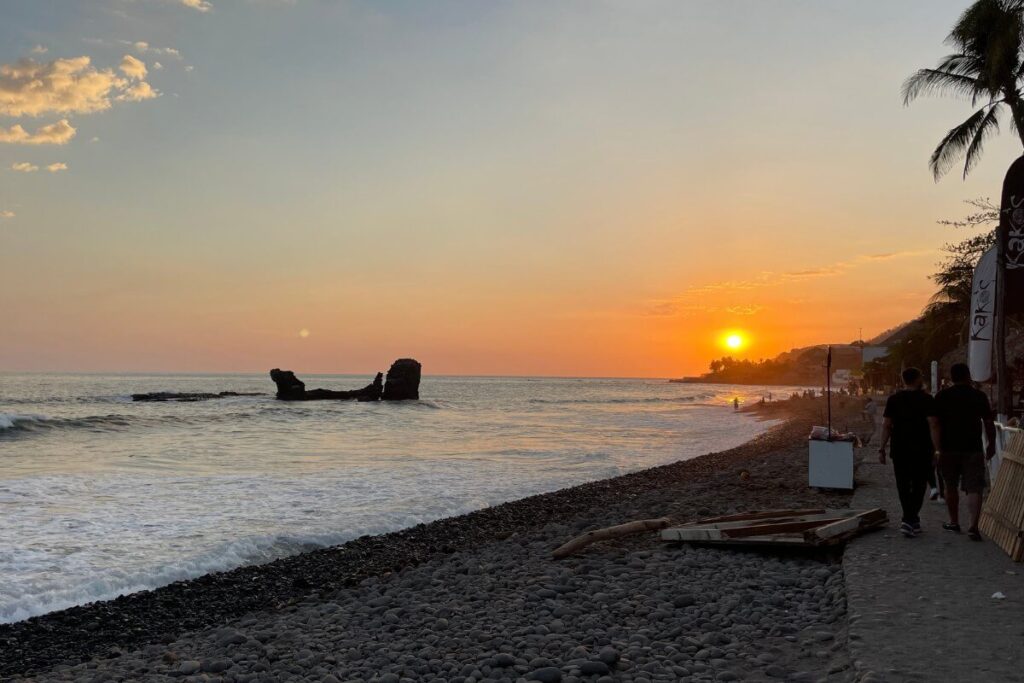
Want to see epic photos and videos from these experiences?
Follow me on Instagram! As we travel, I post everything live on Instagram, so check out my recent highlights and posts. If you can’t find what you’re looking for, drop me a DM!
Is El Salvador Safe? Solo Female Travellers Advice: A Summary
It’s no secret that El Salvaodr has a violent past. Just seven years ago, El Salvador was the most dangerous country in the world (outside of a war zone), and had a considerable amount of homicides per day. This is a daunting fact for any tourist wanting to visit the country.
However, in 2019, a new president was elected in El Salvador. This president has gone above and beyond to change the future of El Salvador, with safety being a priority. With a focus on gang-related violence, the safety of El Salvador has increased considerably in the past few years, meaning more tourists feel comfortable to visit.
But of course, there are still areas in El Salvador that are not safe for tourists. Some areas that are still sadly known for crime. It would be unwise and unsafe for tourists to travel to these areas.
It’s also important not to become complacent because of what you may have seen on social media. Social media is a tiny fragment of someone’s experience, and we all have different ideas of what we find safe and what we do not find safe. You will need to make your own choices, and make your own mind up.
If you stick to the right areas, El Salvador is a safe place for backpackers to visit. In these areas, it felt safe, welcoming and fun. El Salvadorians were some of the friendliest locals we met on our trip. It was just unfortunate that we had a case of feeling unsafe in some of the outskirts.
As a solo female traveller, you are safe to visit El Salvador, but you must follow some simple safety advice (similar to anywhere in the world). My biggest tips are to stay in well-known, backpacker areas, stay in hostels, stick to the beaten track and avoid walking alone at night.
⚠️ For more information about safety and staying safe in El Salvador, please read the following UK Government advice. This information is correct as of 2023, but things change! Always, always check the government advice of your country before visiting anywhere in the world.
Need help planning your El Salvador trip? Check out this detailed route and itinerary for 7 days in El Salvador! < includes all safe areas for solo female travellers!
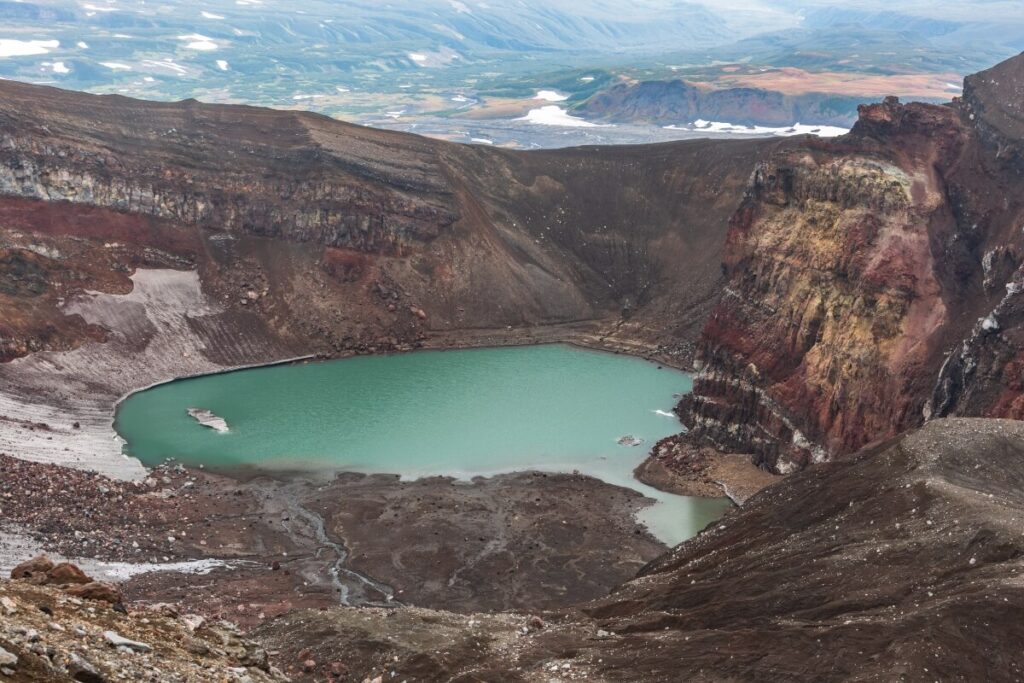
16 tips for staying safe as a solo traveller in El Salvador
1. know basic spanish.
This really is the most important piece of advice when backpacking El Salvador , mainly as so many of the locals will not speak English. There will be many times when you will need to interact with others; from restaurants to public buses, buying a drink in a bar and ordering street food. It’s really important to know at least a few phrases.
If you know some basic Spanish, it will also help you out if you’re stuck with something, or need help and advice. It really is key to staying safe in El Salvador as a solo female traveller.
The app we use on a daily basis is SpanishDict. It translates more conversationally than Google Translate and gives examples of how you might need to ask or say something. It’s better than a word-for-word translation that may not actually make sense when spoken.
If you’re a solo female traveller in El Salvador, here are some helpful phrases in Spanish that you may want to screenshot!
- Please: por favor
- Thank you: gracias
- My name is… : Me llamo…
- Nice to meet you: Mucho gusto
- Yes: Si
- No: No
- What: que
- Where: donde
- Toilet: banos/bano
- Girls/ladies: mujeres or damas (look for an M or D on the toilet doors)
- Help: ayuda
- Algo mas : anything else?
Note that simple phrases such as ‘ you’re welcome ‘ will change between different countries. For example, in Guatemala, we found the locals to say ‘ de nada ‘ when saying you’re welcome. Then in Colombia, it was more common to say ‘ con mucho gusto ‘ for the same phrase. There are slight differences, but it’s easy enough to get used to.
2. Stick to busy, tourist areas
Sadly, there are still some places in El Salvador that are not suitable for tourists . Hopefully, this will change in the next few years, but for now, especially as a solo female traveller, it’s important to stay ‘on the beaten track’.
The main areas that backpackers visit when in El Salvador include:
- Lake Coatepeque
- El Tunco (and El Zonte)
There are a few other areas, such as towns on the Ruta de las Flores, San Salvador and El Cuco, but as I have no personal experience of visiting these areas and do not know anyone who has visited them personally, I won’t be talking about them in this specific post.
San Salvador – the capital city – is used as a transport hub for most backpackers. Travelling through San Salvador is safe, as long as you stick to the main bus routes and don’t wander off to areas that are unknown to you.
Most backpackers will base themselves in Santa Ana , El Tunco and possibly El Zonte for a few days. Santa Ana and El Tunco are great locations to stay in and travel to some of the bucket-list destinations such as the Santa Ana volcano and rainbow slide.
Related post: Best and safest El Tunco hostels | One week route and itinerary for El Salvador
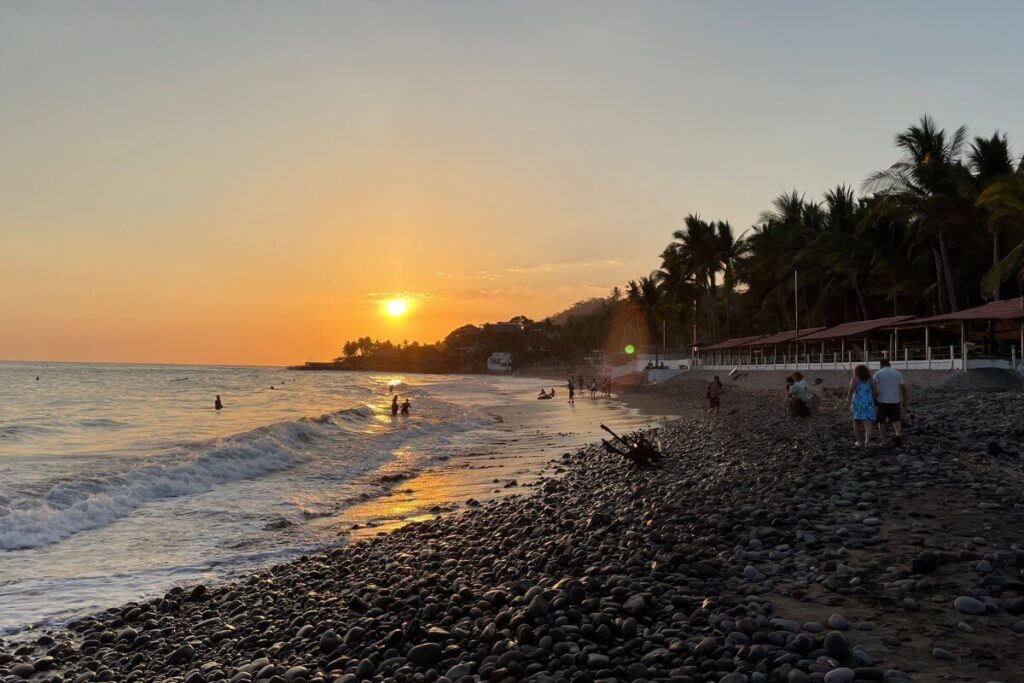
3. Only walk around at night if absolutely necessary
This rule depends on where you are and who you are with. However, a general rule of safety when in El Salvador is to limit the amount you walk around at night, especially if you are alone.
If you’re staying in one of the main El Tunco hostels , you will only be a few seconds’ walk from the main bars and restaurants , so it is safer to walk around than in the big cities. El Tunco is also tiny, and it’s impossible to get lost.
In my personal experience, El Tunco felt the safest to walk around at night alone. However, this isn’t the same for everyone, and my feeling of being safe may be different from yours.
If you are walking around at night, especially in Santa Ana where it’s a larger and busier city, stick to well-lit streets. Don’t walk down a street that is unknown to you, and stick to the busy areas. If you need to walk for a longer distance (longer than 5 minutes), get an Uber or licensed taxi.
Related post: El Salvador in March | Best time to visit El Salvador
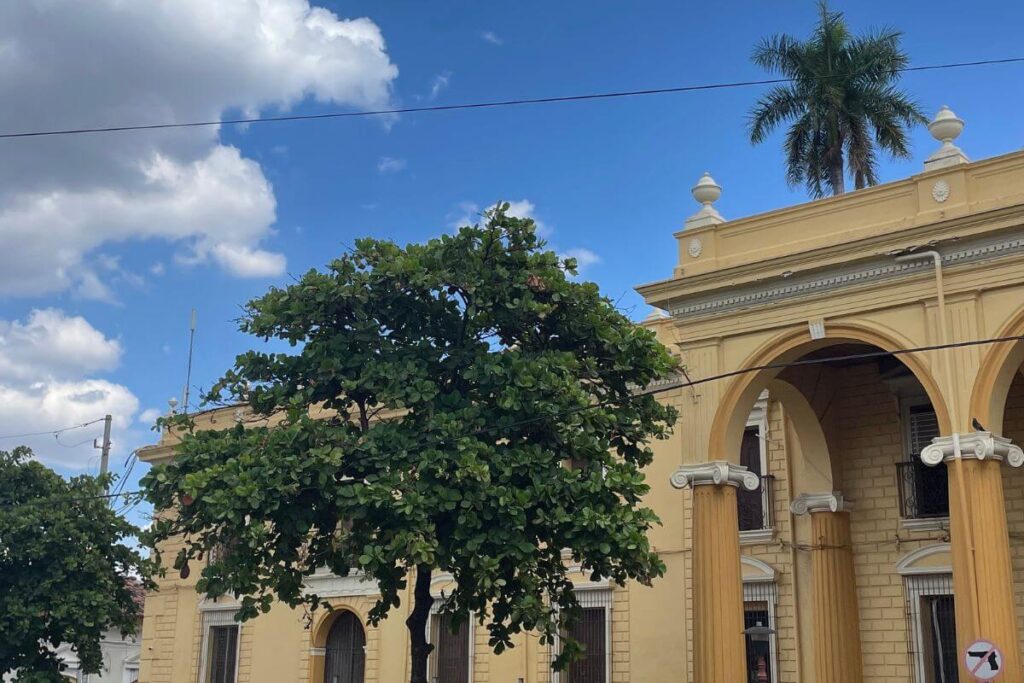
4. Never get in an unlicensed taxi
Sounds pretty obvious, right? But when you’re in need of a taxi and there are swarms of men offering you one, it can be easy to say yes. However, the people operating these unlicensed taxi services are illegal, and you could be putting yourself in danger.
Never get in a taxi in El Salvador that simply has the word ‘TAXI’ written on the front (usually in white marker pen or even chalk). We found these to be pretty common in El Salvador! Taxis in El Salvador must be licensed, and are similar looking to other taxis in the world. For example, the taxis in Santa Ana are bright yellow.
Ubers are available in the major cities in El Salvador, but not in places like El Tunco . Luckily, El Tunco is walkable as it is so small. Just be careful walking around at night, and always stay in a group.
Hiring a private driver to get around El Salvador is one of the most popular and safest ways to see the country. Private drivers can be hired for different amounts of time.
➡ You can check prices and bookings for your own private driver in El Salvador here.
5. Only use the public buses on well-known routes during the day
Public buses in El Salvador are similar to the chicken buses in Guatemala (just with less decoration!). They are an easy and common way to get around the country, mainly because they are so frequent and cost-effective.
As a backpacker in El Salvador , it is important to stick to buses that take safe and well-known routes. It is still common for buses in El Salvador to be targeted by criminals in unsafe neighbourhoods.
Policing isn’t common on buses, so there is also the issue of reckless bus drivers and speeding on roads in bad conditions.
Again, most of the time, public buses in El Salvador are safe . But to be even safer, make sure you are taking a well-known route, keep your belongings close to you and use common sense.
⚠️ For more information about safety and staying safe in El Salvador, particularly on public buses , please read the following UK Government advice.
6. Stay in hostels
Hostels are one of the best ways to stay safe as a solo female traveller in El Salvador. The reception desk is there to listen to you if you have any worries or fears, and they put your safety first. Plus, the recommended hostels in El Salvador are in safe areas and have good security measures.
As a backpacker myself, I’m a big advocate for hostels . Staying in hostels means you can make friends from day one, and there are people around you immediately.
During your stay at a hostel, you might become friends with a group of people and end up travelling around with them . Or, you might book tours and activities with the hostel , which again are always done in big, safe groups.
7. Book tours for bucket-list experiences
Whilst you can visit most of the big attractions in El Salvador alone, visiting these locations in a group is safer.
Most tours will organise transport to and from the locations, and you will be with other like-minded travellers. This gives an extra level of safety and security, especially if something goes wrong.
Some of the best tours in El Salvador include:
- Santa Ana Volcano, Full Day Tour 🌋 ➡ check prices here!
- Rainbow Slide Experience 🌈 ➡ check prices here!
- Tamanique Waterfalls and El Tunco Beaches ➡ check prices here!
- Day trip to Honduras, Copan Ruins 🇭🇳 ➡ check prices here
- Half-Day San Salvador City Tour ➡ check prices here!
Related post: 21 EPIC Things To Do In Santa Ana, El Salvador
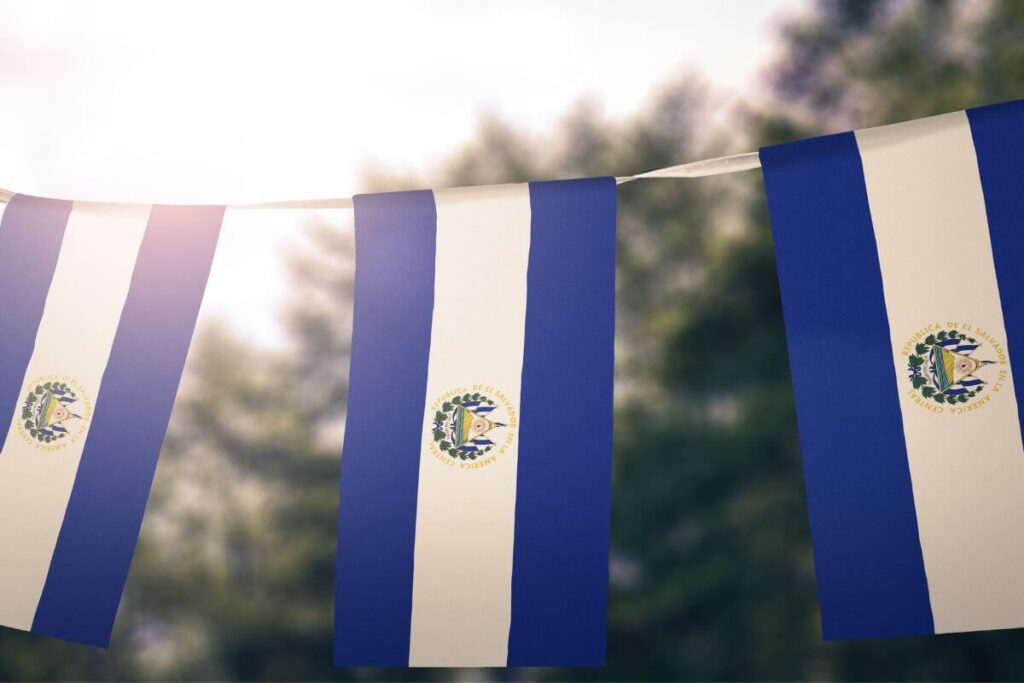
8. Dress appropriately
As sad as it is, it’s important not to attract too much-unwanted attention if you’re travelling El Salvador solo. I know this is a sad fact of life for women, and I don’t agree with it. But if you dress inappropriately, you are more likely to be harrassed on the street.
In general, I found men to be respectful in El Salvador, but I always took precautions. In a foreign country that I didn’t know too well, I didn’t want to get into any unwanted scenarios.
9. Keep your valuables close to you at all times
There are a number of pickpockets and thieves working in El Salvador, just like any other country. Personally, I didn’t see this in El Salvador, but that doesn’t mean it doesn’t happen!
There are accounts of phones being snatched out of people’s hands as they’re walking along the street, similar to what happens in Bali, Thailand and even London. It’s a common trick thieves use, as they can drive off quickly on their motorbikes without being caught.
Always have your iPhone in your pocket or bag, safely hidden. Don’t follow a GPS as you’re walking, as you make yourself a target. Look at your route beforehand.
iPhones and Apple products are prone to be stolen in El Salvador. This is because there aren’t any ways to buy Apple products in El Salvador (well, very few ways!) so they are worth a lot of money. This also means if you get your iPhone stolen in El Salvador, it’s going to be hard to replace.
Just be vigilant. As I said, this is no different to anywhere else in the world. Keep your belongings safe, zipped away and hidden when walking around El Salvador.
10. Know your emergency numbers
Hopefully, you will never need to use El Salvador’s emergency numbers, but just in case you do, these are the numbers you will need to dial.
🚑 Medical emergencies: 132 or 911 (if you dial 911, be sure to ask for medical assistance)
🚓 Police: 911
For safety reasons, always let someone know where you are when travelling El Salvador. Check in with a family member or friend often, and let them know where you are staying.
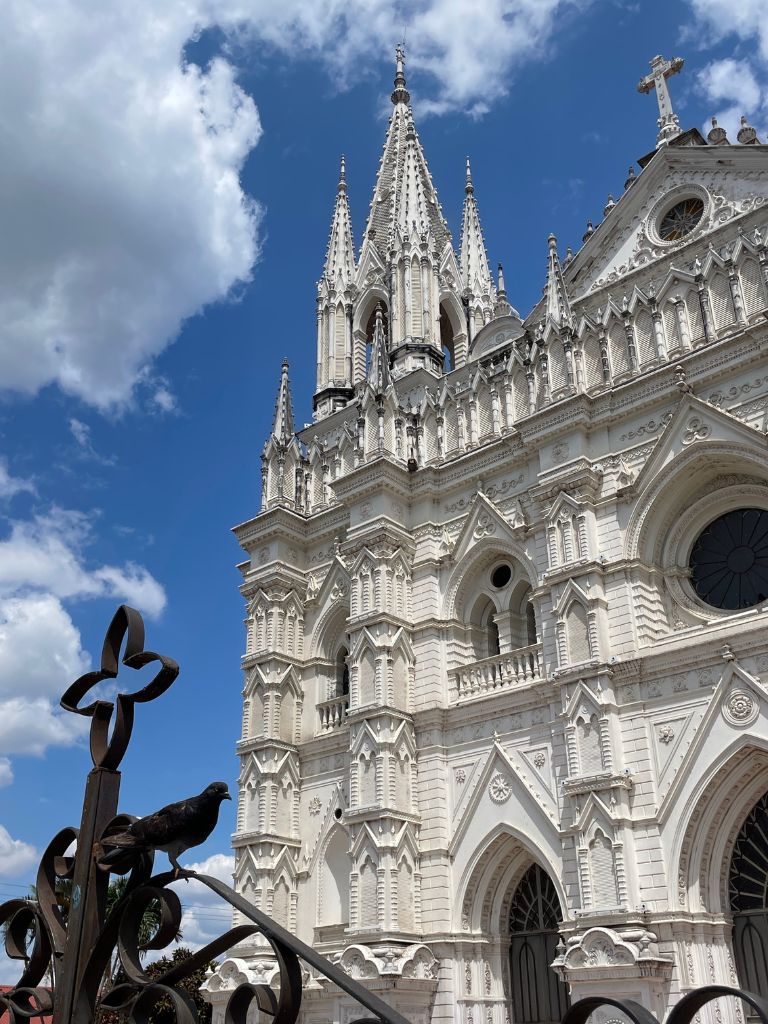
11. Trust your gut!
If you’re backpacking El Salvador as a solo female traveller, you’ll find a lot of times you’ll need to rely on the kindness of strangers. Luckily, the majority of Salvadorians you meet are kind, welcoming and friendly. We loved meeting some of the locals – they were so sweet and we felt totally safe with them.
However, we all know that sometimes people do not have the best intentions – again, something that’s true all over the world.
Don’t be afraid to lie. It’s way easier to get yourself out of a situation sooner rather than later.
Be rude if you have to be. Trust your gut if something doesn’t feel right.
If you’ve experienced something that makes you feel uneasy, go back to your hostel and tell someone. Phone a friend or family member. It’s ok, it happens, and prioritise getting yourself somewhere safe.
Travelling El Salvador alone? One of the best ways to get around is to hire a private driver.
12. Always let someone know where you are, or where you’re going
Another way of staying safe in El Salvador is to always let someone know where you are. Similar to location tracking, smartphones are great at allowing anyone to track your taxi or journey. This is so important when you’re travelling alone!
But I know this can be hard when you’re backpacking in a country with a time zone completely different to your family and friends back home. And do you really want to keep bothering them with your location?
You have two choices.
A) You don’t care about ‘bothering’ them, as they love you and want to keep you safe! You ask them to keep an eye on when you’re doing uncomfortable or long journeys. This is great!
B) If the time zone is too difficult, let someone in your hostel know where you’re going. You don’t need to tell them your life story, or what you’re doing, but if you’re visiting somewhere new (or meeting someone new!) someone should know where you are. If you can, exchange numbers with someone at your hostel. It’s likely you won’t need to use it, but it’s an extra layer of security.
Normally, the reception staff in hostels are friendly and are there to make you feel comfortable and safe. I’ve often told hostel staff that I’m heading off to a waterfall or on a long hike, just as an extra sense of security.
13. Always have a working phone whilst travelling around El Salvador
Whether you choose to get a local sim or an eSIM, always make sure you have data when backpacking El Salvador . This gives an extra layer of security and means you can reach out to someone if necessary.
ESIMs are easy to download and ready to use within a few minutes of purchase . They’re great if you’re landing or crossing into a country solo, and would like to use your phone immediately. If you’re visiting El Salvador solo, I recommend checking out the eSIM packages here.
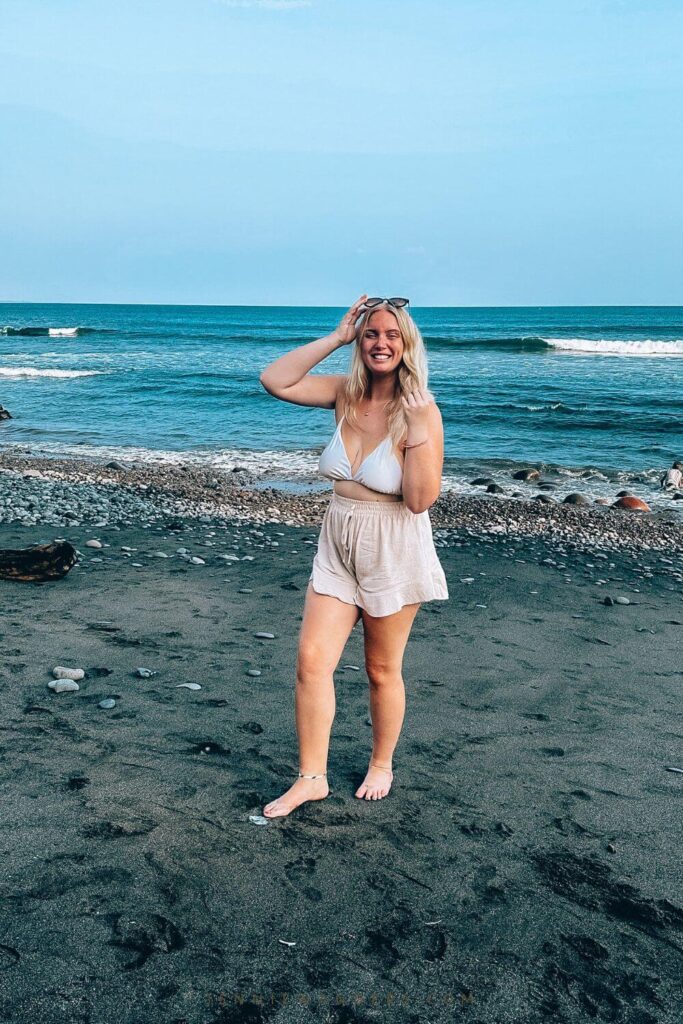
14. Always carry a portable charger
Similar to point 7, If you’re backpacking El Salvador alone, I advise you to always carry a portable charger so you can use your mobile phone whenever needed.
Not only is this needed for directions and communication, but it’s vital that you have a phone battery in emergencies. Can you imagine that uncomfortable gut feeling whilst having a dead phone?
Portable chargers aren’t that expensive, and you can buy a tiny one that fits into your purse or pocket. It may seem annoying, but trust me, it could save your life! You can buy my favourite and most reliable portable charger here . It lasts up to 4-5 charges!
15. Be kind
As I previously mentioned, Salvadorians were some of the friendliest locals we met on our Central America trip. Everyone greeted us with a smile, welcomed us to the country and made us feel safe. This was one of our favourite things about backpacking El Salvador.
And this works in both ways! Treat the locals with respect, and speak in Spanish (even if it’s broken or not so great). A simple ‘ gracias’ and ‘ por favor ’ will make a difference! Being kind will directly impact how safe you are on your trip to El Salvador.
16. Don’t spend all of your time worrying!
I know El Salvador has a bad reputation when it comes to safety, and I’m hoping this changes in the next few years. It’s an amazing country with friendly locals, beautiful scenery and some epic things to do.
Enjoy your time in El Salvador. Don’t spend all of your time worrying! If you follow basic safety tips and some of the tips in this post, you will be fine. In fact, you will have an amazing time exploring El Salvador, even as a solo female traveller!
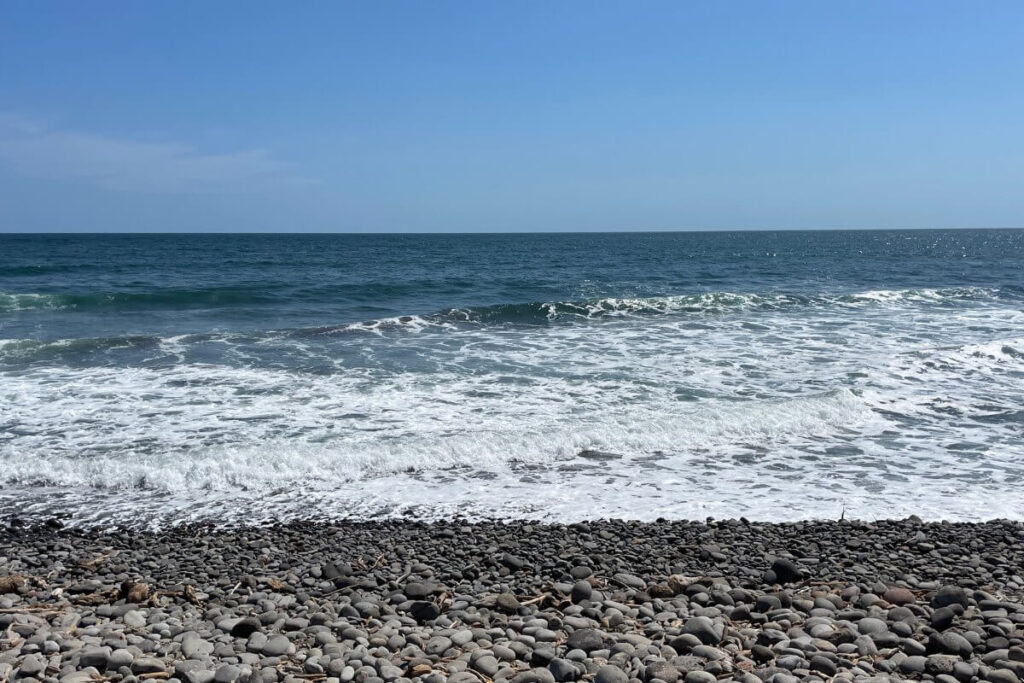
Useful apps for staying safe in El Salvador
- Always have a local or eSIM installed whilst travelling through El Salvador. Avoid being on buses, in taxis or walking around without any phone signal. ESIMs are easy to download and ready to use within a few minutes of purchasing, so there’s no longer a need to hunt down free Wifi! ➡ You can check out the prices and packages for eSIMs here .
- Google Maps allows you to follow area maps even when you’re offline. Download some of your local areas before heading out to ensure you can travel safely on the right route at any time.
- SpanishDict: This is similar to Google Translate – but it gives more conversational terms when translating rather than direct word-for-word translations. We used it daily when travelling Central and South America.
- Shake2Safety allows users to input emergency contacts to which a message, location, audio or photo can be sent in an emergency situation. Simply shake your phone or click the unlock button 4 times to send the alert. This can also be used without wifi and when your phone is locked.
- The Circle Of Six app allows you to save 6 contacts of your choice which can be notified in just two taps if you’re in an emergency situation.
- As horrible as it sounds, One Scream works by being able to detect the scream of a panicked female. A loud siren will go off, and after 20 seconds an automated voice call and message will be sent to your emergency contacts.
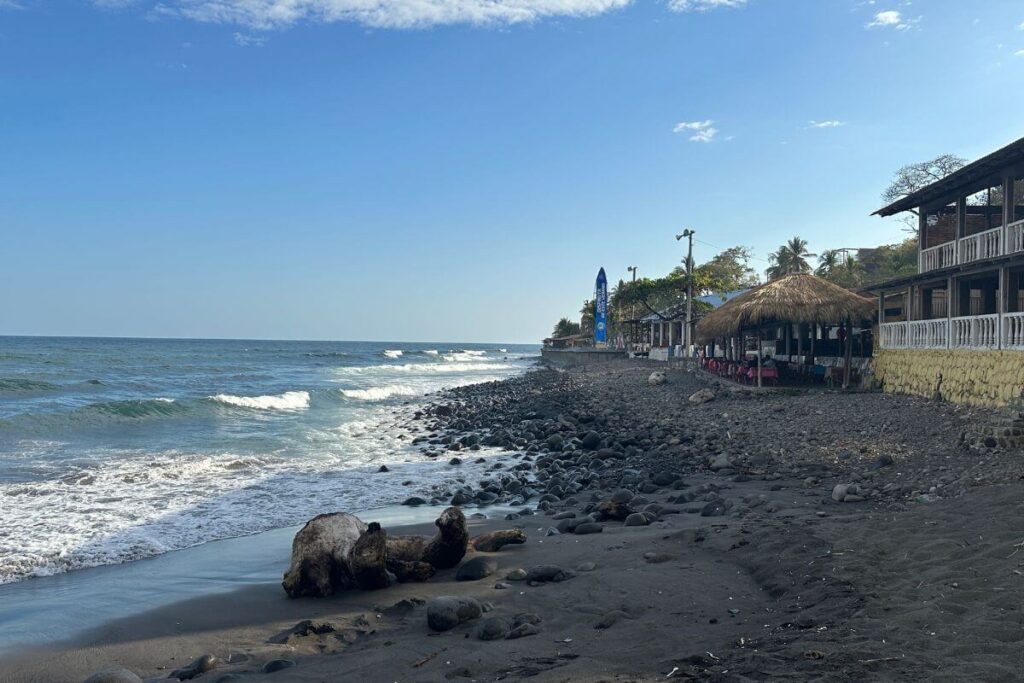
Where to stay if you are a solo female backpacker in El Salvador
Knowing where to stay in El Salvador is important. Although the majority of areas in El Salvador are now safe, you want to be somewhere where you feel secure and surrounded by like-minded travellers.
Below I have listed some of the best hostels in certain locations in El Salvador. These have all been personally tried by myself or another travel blogger that has recommended it.
🇸🇻 One word of advice when finding accommodation in El Salvador. Stick to the main areas. We accidentally booked somewhere away from one of the main tourist areas and didn’t enjoy it. We felt unsafe and it ruined part of our experience. This ended up with us leaving halfway through to move to a more touristic area. Do your research, and stick to the busy areas.
Best hostel in Santa Ana: Casa Verde or Casa Vieja Guest House
El Tunco: Canuck’s Guest House or Papaya Lodge
Lake Coatepeque : Captain Morgan
View all El Salavor hostels now!
Getting around El Salvador as a solo female traveller
You can travel around El Salvador in multiple ways, depending on how much time you have, your budget and where you want to visit . The most common way for backpackers to travel around El Salvador is via rental car , private driver or shuttle .
There are public buses in El Salvador, which are cheap and inexpensive. Please refer to point 5 about staying safe on public buses in El Salvador.
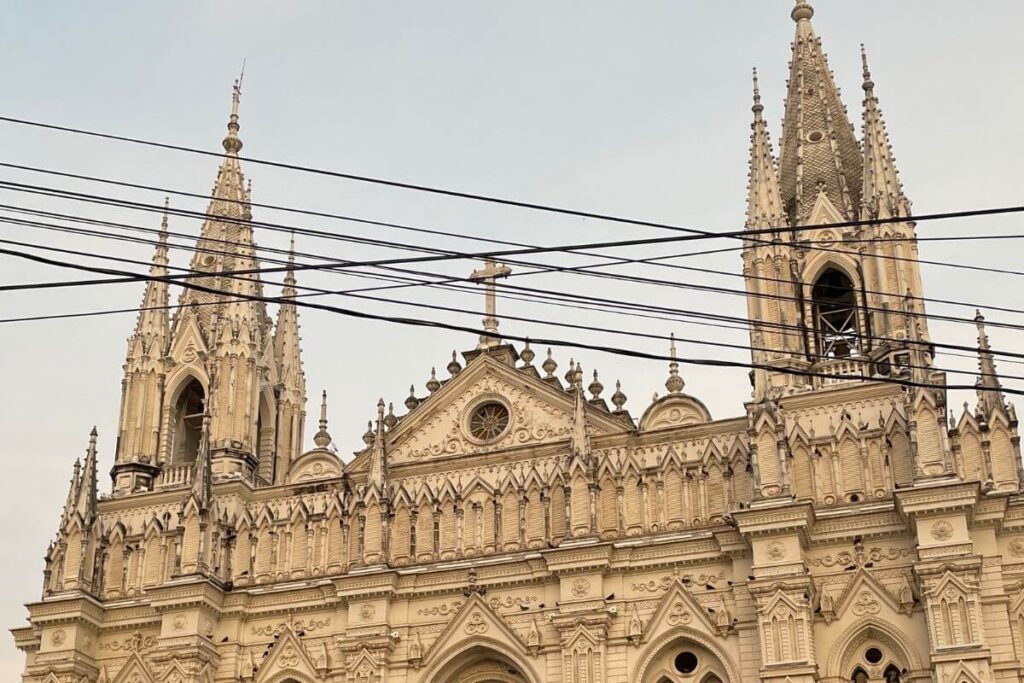
Is El Salvador safe? FAQs
1) is it safe to travel to el salvador alone.
Yes, it is safe to travel to El Salvador alone. Use basic common sense, follow some safety tips (similar to the ones in this post) and stick to the tourist areas. There are sadly some areas in El Salvador that are not safe for tourists, so do your research, stay in well-known accommodations and stick to the ‘beaten track’.
🤩 Related post: Backpacking El Salvador? Be sure to check out my in-depth guide!
2) Is El Salvador tourist friendly?
Yes, El Salvador is tourist friendly. We found the locals to be kind and welcoming and felt safe in all of the tourist areas in El Salvador.
3) Are beaches in El Salvador safe?
Yes, especially beaches such as El Tunco and El Zonte. These beaches are safe for tourists and solo female travellers. El Tunco and El Zonte attract surfers from all over the world, and there is a chilled, sleepy vibe to them. They are both safe beaches.
4) Is El Salvador safer than Costa Rica?
Costa Rica is considered to be one of the safest countries to backpack in Central America. Statistically wise, Costa Rica is safer than El Salvador. However, El Salvador has increased its security measures in the past few years, and there are now some safe areas for tourists and backpackers to visit.
Best backpacker travel insurance for Central America
If you’re visiting Central America as a backpacker, or even for a short vacation, it is so important to have travel insurance . And if you ended up on a post that’s called ‘epic party tips’, you know (just as well as I do) that you definitely need travel insurance.
Personally, I recommend SafetyWing . As a digital nomad and world traveller myself, I can confirm it is the best travel insurance out there. And one of the cheapest – they have deals that start at just $42 USD per month.
I know, I know, you’re thinking ‘but I can’t afford that!’ . I was the same! It’s tough to fork out $42 a month on something ‘you might not need’. But what if something DOES happen? That extra Mezcal shot results in you falling down the stairs, or you eat something dodgy from a street food van.
If you need medical help at any point whilst in Central America, you need travel insurance.
With SafetyWing , you’re covered on travel emergencies, basic medical costs and medical expenses throughout your trip, so you can travel without worry (at a backpacker’s price!)
Don’t even think twice about getting travel insurance for Central America . Trust me, I have heard enough horror stories about backpackers who haven’t had insurance and have ended up in a lot of debt. Don’t be that person!
If you’ve been putting the job off because it takes a lot of time and effort to research the best travel insurance companies , I understand. That’s why I’ve done the hard work for you. Sign up for SafetyWing , and the job is done!
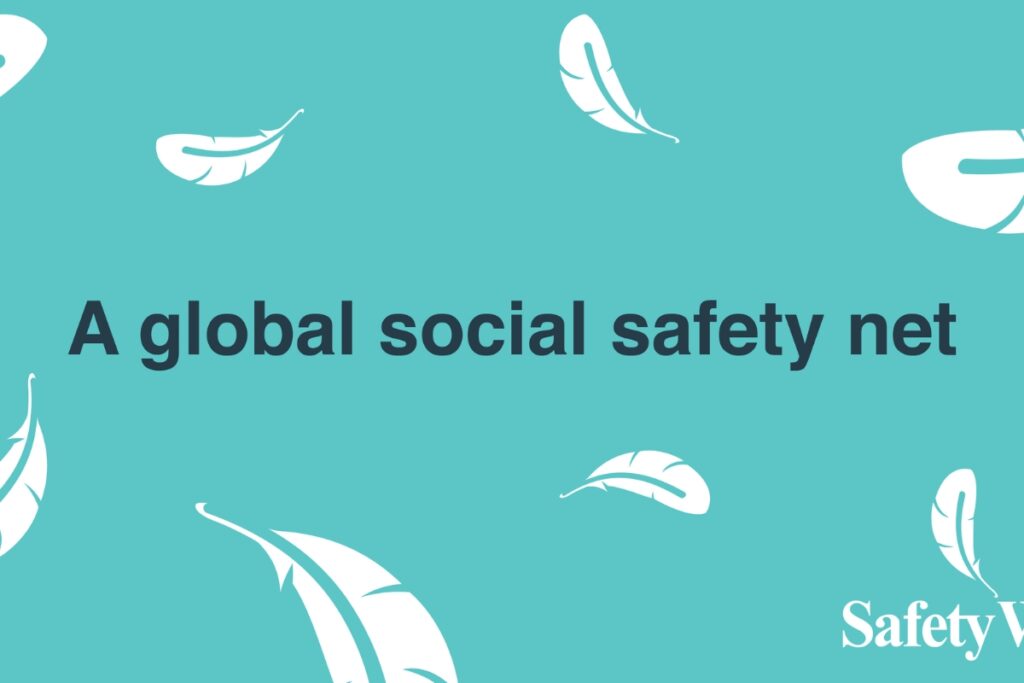
Is El Salvador safe for solo female travellers ? In a Nutshell
So, there you have it! Everything you need to know about staying safe as a solo female traveller in El Salvador. When you’re planning a trip to El Salvador, make sure you let me know over on Instagram or in the comments below!
And don’t forget I’ve written a comprehensive, easy-to-read guide about backpacking El Salvador, so be sure to check it out before you visit!
If you haven’t seen my blog before, I write posts aimed at first-time backpackers on a budget. I’m currently travelling around the world with my boyfriend (read more here !), creating guides and itineraries for you to follow in our footsteps!
Keep an eye out for more El Salvador content, all written from a personal and realistic point of view. You can sign up for my newsletter and juicy travel updates here!
As always, thanks for reading and supporting the blog!
Happy travelling 🙂
🇸🇻 Where to next?
- How To Get From San Salvador to El Tunco: ALL Options
- El Tunco El Salvador Nightlife: Party Guide
- How To Get From El Tunco to Leon (Nicaragua): FULL Guide
- 21 EPIC Things To Do In Santa Ana, El Salvador
MEET THE AUTHOR!

Hi! I'm Jennie! As a part-time travel blogger based in London, I'm using my 10+ years of travel expertise to encourage & inspire you to step out of your comfort zone through sustainable, mindful and purposeful travel.
If I'm not writing, I'm either reading, drinking coffee or taking a wild swim (all at the same time if I'm feeling impressive).
Similar Posts

What To Wear in Oaxaca (That Isn’t Ugly) 2023 Guide
Backpacking Mexico and want to know what to wear in Oaxaca? Oaxaca is still one of my favourite places to visit in Mexico, and it’s a city I’ll return to time and time again. Knowing what to wear and what to pack for Oaxaca puts your mind at ease when planning the rest of your…

3 Days in the Lake District: Everything You NEED To Do
Even if you only have three days to explore the Lake District, it’s still a chance to see some of the most beautiful scenery England has to offer. The 2362 square kilometres of English countryside is famous for its mountains, lakes, hiking trails, and traditional English villages, and it is undoubtedly one of the most beautiful…
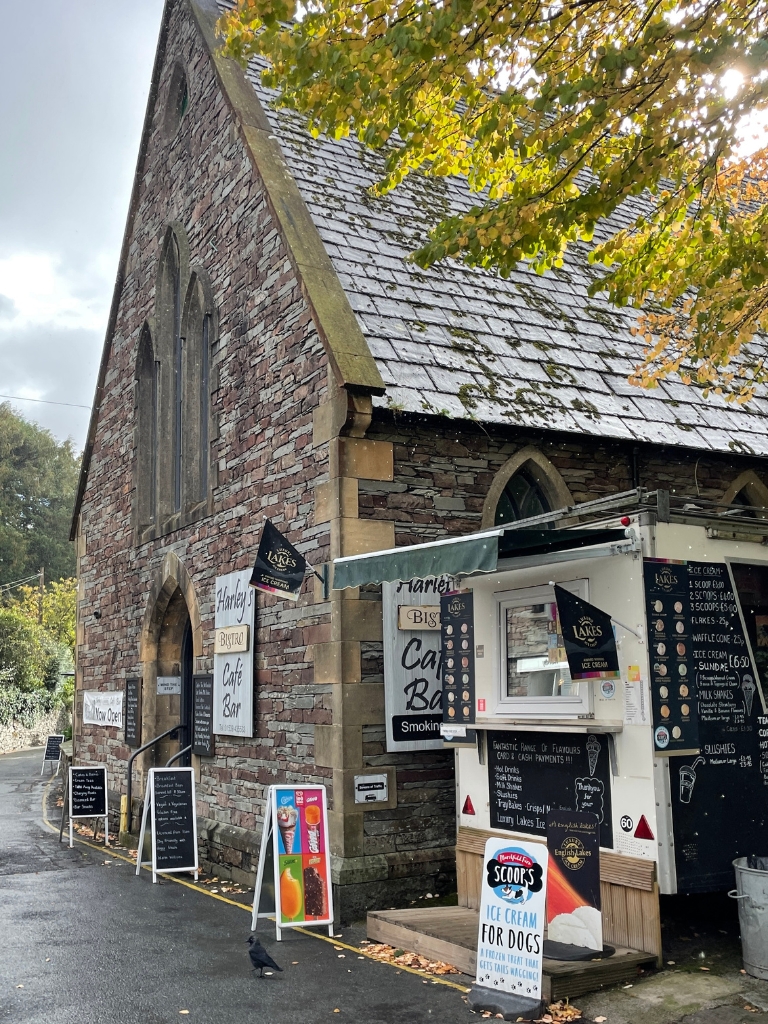
17 EPIC Things To Do In Grasmere, Lake District (2023)
Looking for the best things to do in Grasmere? You’re in the right place! Grasmere is one of the most beautiful villages in the Lake District, and one we have returned to time and time again. With traditional cottages and grey-slate buildings, the small town of Grasmere is only a short drive from the main…
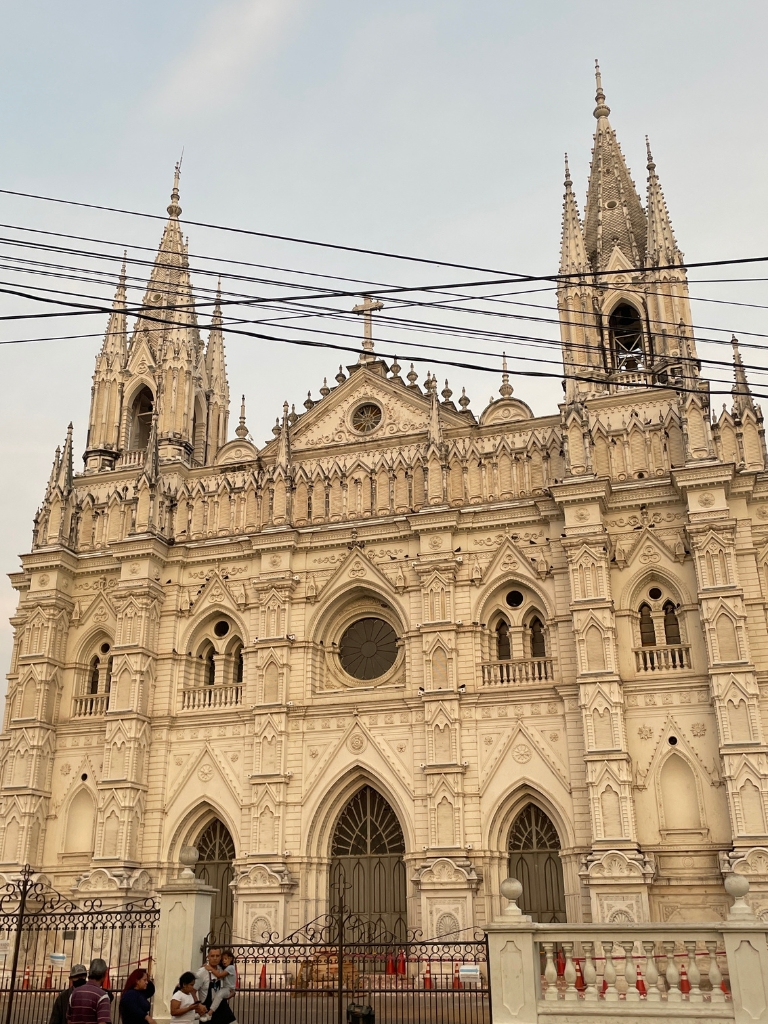
Antigua To Santa Ana El Salvador COMPLETE Guide! 2023
Looking for the best ways to get from Antigua to Santa Ana in El Salvador? You’re in the right place! Both Antigua and Santa Ana are popular locations when backpacking Guatemala and El Salvador, and are both worth visiting on your backpacking trip. In fact, Antigua Guatemala was one of our favourite places in all of…
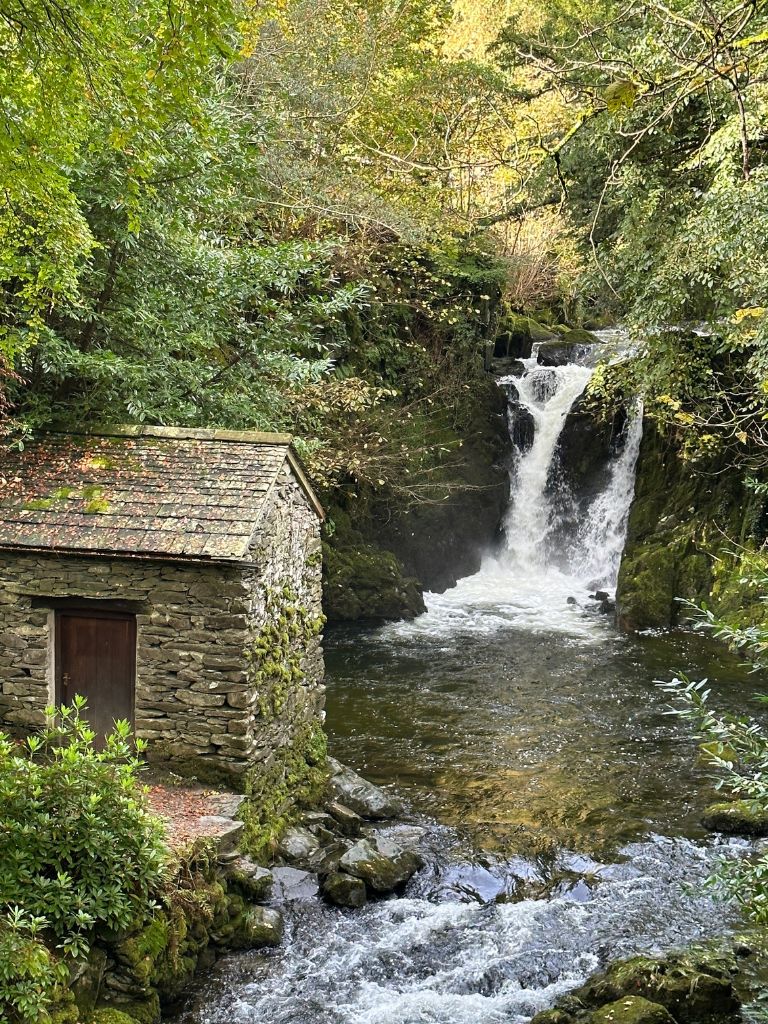
How To Visit The Rydal Waterfall: FULL Easy Guide (2023)
When you type into Google ‘Rydal waterfall’, it’s hard to find clear directions leading you to the right place. That’s because there isn’t exactly a named ‘Rydal waterfall’, and it’s in fact at Rydal Hall. But luckily for you, it’s one of the easiest waterfalls to reach in the Lake District! 🦉 EXPERT TIP: The…
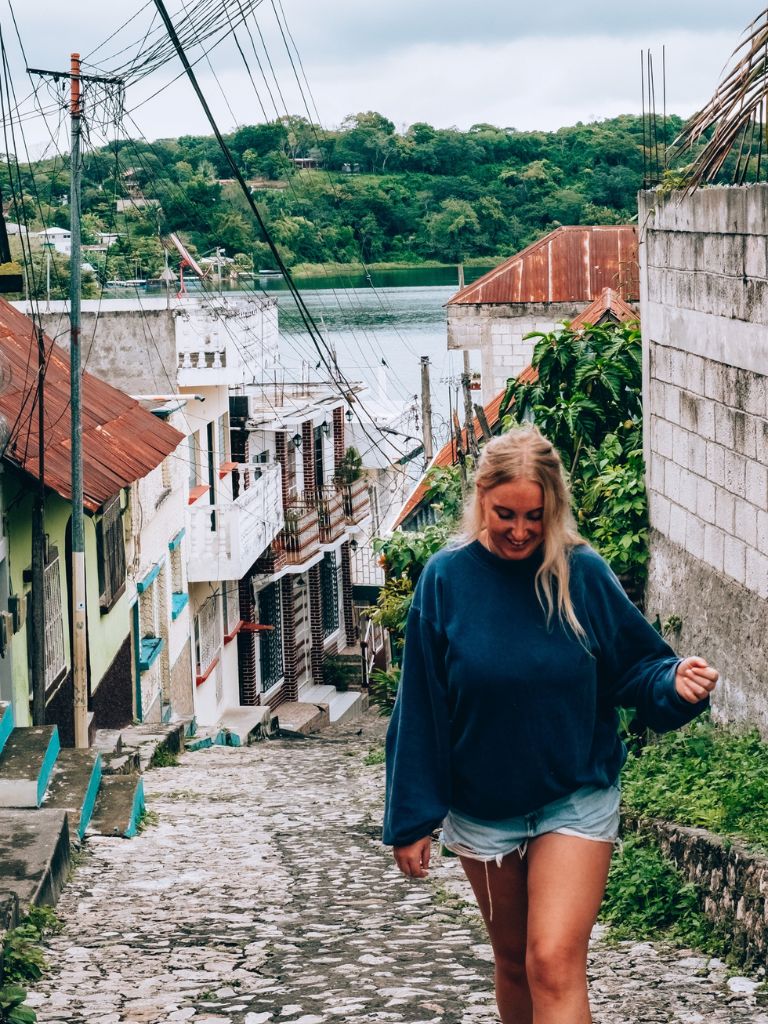
Lake Atitlan To Flores: COMPLETE Guide (2023)
Looking for the best ways to get from Lake Atitlan to Flores You’re in the right place! This post explains all of the ways to travel between these two iconic locations in Guatemala, making sure you have the smoothest trip possible. Lake Atitlan was one of our favourite places in Guatemala. It’s only a short 2.5-hour shuttle…
Flight search
- Adults Remove adult 1 Add adult
- Children Aged 2-11 Aged 2 to 11 Remove child 0 Add child
- Infants In seat Remove infant in seat 0 Add infant in seat
- Infants On lap Remove infant on lap 0 Add infant on lap
- Premium economy
Find cheap flights from Russia to anywhere Close dialog These suggestions are based on the cheapest fares to popular destinations in the next six months. Prices include required taxes + fees for 1 adult. Optional charges and bag fees may apply.
- Saint Petersburg
Useful tools to help you find the best deals
Popular destinations from russia.
Frequently asked questions

IMAGES
VIDEO
COMMENTS
Travel Advisory. July 17, 2023. El Salvador - Level 3: Reconsider Travel. C. Reissued with obsolete COVID-19 page links removed. Reconsider travel to El Salvador due to crime. Country Summary: In March 2022, the Government of El Salvador (GOES) declared a "State of Exception" in response to an increase in homicides.
El Salvador is not really the safest tourist destination. On the streets of El Salvador, as many as 4,000 murders occur yearly. The most common form of violence is gang crime and the majority of crime that happens on the streets is related to gangs and drug trafficking. The place to be most careful at is San Salvador, where most of the violent ...
The violent crime tourists are most at risk of in El Salvador is armed robbery. The Canadian government advises travelers about the risk of armed robbery. Robberies often occur on public buses, in tourist areas, in isolated scenic locations such as beaches, and at highway junctions.
In 2015, El Salvador had an average of 18.2 daily murders for a rate of 103 homicides per 100,000 inhabitants. By the end of 2023, the murder rate dropped to 0.42 per day or 2.4 homicides per 100,000 inhabitants. Based on Homicides and days without homicides, 2023 is the safest year in Salvadoran history.
Call us in Washington, D.C. at 1-888-407-4747 (toll-free in the United States and Canada) or 1-202-501-4444 (from all other countries) from 8:00 a.m. to 8:00 p.m., Eastern Standard Time, Monday through Friday (except U.S. federal holidays). See the State Department's travel website for the Worldwide Caution and Travel Advisories.
Read the country information page for additional information on travel to El Salvador. If you decide to travel to El Salvador: Read the Department of State's COVID-19 page before planning any international travel, and read the Embassy COVID-19 page for country-specific COVID-19 information. Be aware of your surroundings.
If your travel plans in El Salvador include outdoor activities, take these steps to stay safe and healthy during your trip. Stay alert to changing weather conditions and adjust your plans if conditions become unsafe. Prepare for activities by wearing the right clothes and packing protective items, such as bug spray, sunscreen, and a basic first ...
To summarize: U.S. citizens are required to present proof of completion of their vaccination course OR an original negative RT-PCR test result issued within 72 hours of entering El Salvador at any point of entry (land, sea, or air). If you are a Salvadoran or legal permanent resident of El Salvador different requirements may apply, please visit ...
Your passport must be valid for at least 6 months beyond the date you expect to leave El Salvador. Passport for official travel. Different entry rules may apply. ... Advice for travellers - 31 August, 2023; COVID-19 and International Travel - 13 March, 2024; ... Prevent hepatitis B infection by practicing safe sex, ...
Ask local authorities about safe areas to trek or climb. Full travel advice: Safety. Health. Insect-borne illnesses are common, especially during the wet season. Chikungunya is widespread. Use insect repellent. ... A State of Exception was declared in El Salvador on 30 March 2023 and will likely continue for the foreseeable future. While the ...
El Salvador Travel Costs. Accommodation - During peak season, a bed in an 8-10-bed dorm costs $10-15 USD. Free Wi-Fi is standard and many hostels also include free breakfast. Private rooms with an ensuite bathroom cost around $25 USD per night (there is no real difference in prices during the high or low season).
Reconsider travel to El Salvador due to crime and COVID-19. Read the Department of State's COVID-19 page before you plan any international travel. The Centers for Disease Control and Prevention (CDC) has issued a Travel Health Notice for El Salvador due to COVID-19, indicating a high level of COVID-19 in the country. . Your risk of contracting COVID-19 and developing severe symptoms may be ...
As such, this is a good indication that El Salvador is a safer place to visit now than it was in previous years. As of March 2023, the U.S. Department of State has a Level 3 travel warning issued for El Salvador, which translates into "Reconsider Travel". What should tourists watch out for in El Salvador?
Learn about El Salvador's diverse attractions, from volcanoes and ruins to beaches and culture, and how to plan your trip with safety and convenience in mind. Find out about currency, weather, etiquette and more in this comprehensive guide.
El Salvador - safety as a country. San Salvador is the capital city of El Salvador, located at the foot of the San Salvador volcano. With its population of 2 million people and due to rapid growth, San Salvador has become a great tourist attraction and well-visited destination. Frequently visited by foreigners are luxurious shopping malls in ...
Living in El Salvador. Travelling to El Salvador. FCDO travel advice for El Salvador. Includes safety and security, insurance, entry requirements and legal differences.
The latest Travel Advisory for El Salvador is dated July 27, 2023, and a lot has changed since then. Anyway, the US government still recommends Americans " Reconsider Travel " to El Salvador due to crime and avoid remote areas at all costs. As of today, local authorities have extraordinary powers to put under arrest those they suspect to ...
Always lock doors and keep windows closed. If you're robbed, do not resist the attackers or take any action that puts you at greater risk. If you have questions on security, contact the El ...
San Salvador's historic centre. Credit: iStock Arguably once more powerful than the government, the criminal gangs have recently hit a brick wall by the name of Nayib Bukele, elected as ...
From the high of 6,656 murders in 2015 to just 496 in 2022. As of 2023, El Salvador has gone from the highest homicide rate in Central America to the lowest. It now has a rate of 1.8 homicides per 100,000. ... How To Stay Safe when you travel in El Salvador. Staying safe in a foreign country requires taking certain precautions and being aware ...
Santa Ana volcano 16 tips for staying safe as a solo traveller in El Salvador 1. Know basic Spanish. This really is the most important piece of advice when backpacking El Salvador, mainly as so many of the locals will not speak English. There will be many times when you will need to interact with others; from restaurants to public buses, buying a drink in a bar and ordering street food.
El Salvador is very safe these days. Violent crime and gang violence are way down since the new president took over. In fact, July was the safest month in 30 years in the country. Be cautious of robberies and use basic common sense when travelling.
I feel like this question gets asked every month….El Salvador is safe!! I stay in the city, San Salvador. Use your common sense and travel to safe areas. Don't go out late at night it's not safe. I travel every summer to visit my family and we have a great time, we go to the beach, I rent a car and drive to el volcan, it's pretty safe ...
Use Google Flights to explore cheap flights to anywhere. Search destinations and track prices to find and book your next flight.